#include <SignalManager.h>

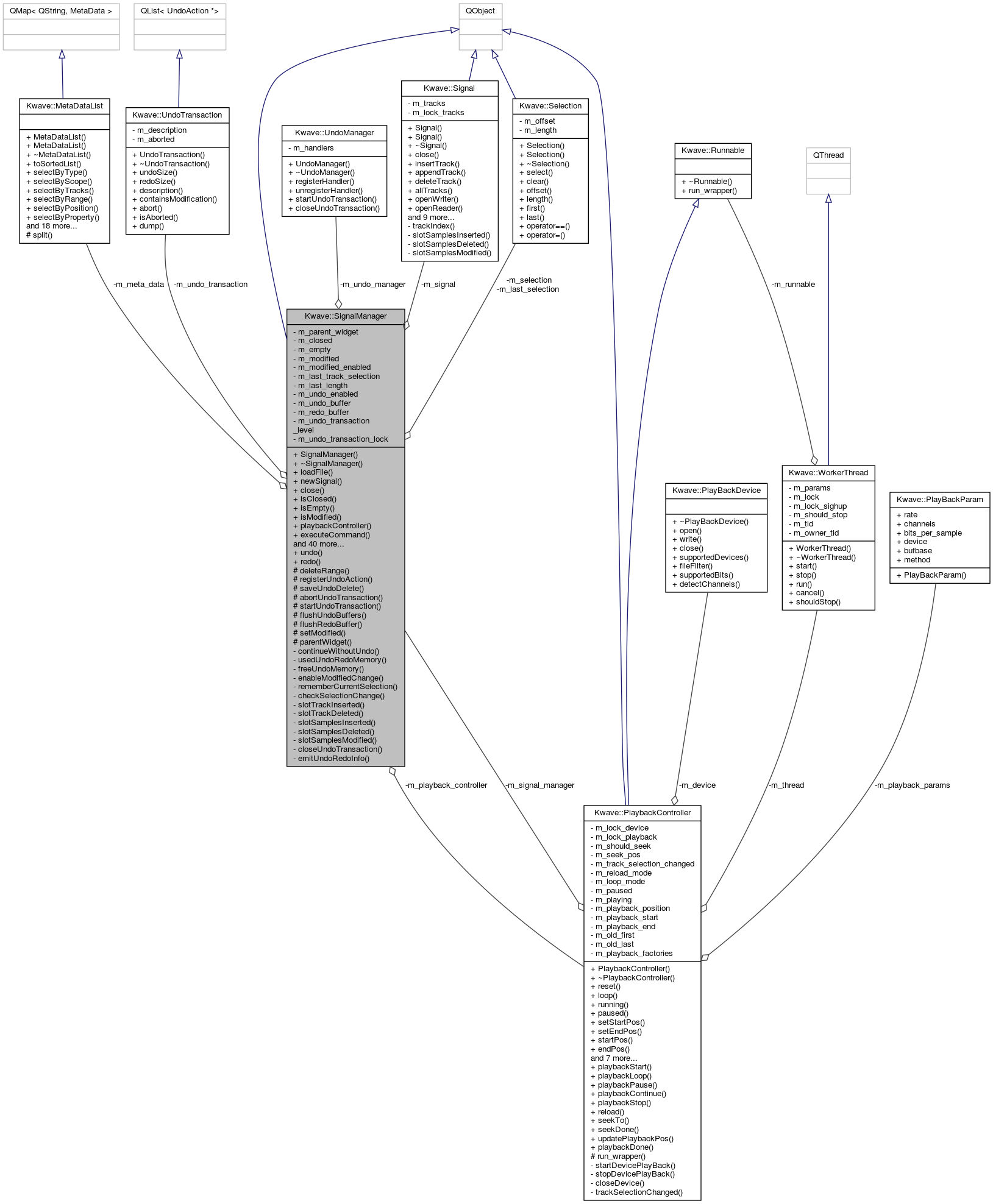
Public Slots | |
| void | undo () |
| void | redo () |
Signals | |
| void | sigSelectionChanged (sample_index_t offset, sample_index_t length) |
| void | sigTrackInserted (unsigned int index, Kwave::Track *track) |
| void | sigTrackDeleted (unsigned int index, Kwave::Track *track) |
| void | sigTrackSelectionChanged (bool enabled) |
| void | sigSamplesInserted (unsigned int track, sample_index_t offset, sample_index_t length) |
| void | sigSamplesDeleted (unsigned int track, sample_index_t offset, sample_index_t length) |
| void | sigSamplesModified (unsigned int track, sample_index_t offset, sample_index_t length) |
| void | sigMetaDataChanged (Kwave::MetaDataList meta) |
| void | sigUndoRedoInfo (const QString &undo, const QString &redo) |
| void | sigModified () |
Public Member Functions | |
| SignalManager (QWidget *parent) | |
| virtual | ~SignalManager () |
| int | loadFile (const QUrl &url) |
| void | newSignal (sample_index_t samples, double rate, unsigned int bits, unsigned int tracks) |
| void | close () |
| bool | isClosed () |
| bool | isEmpty () |
| bool | isModified () |
| Kwave::PlaybackController & | playbackController () |
| int | executeCommand (const QString &command) |
| QString | signalName () |
| unsigned int | bits () const |
| double | rate () const |
| unsigned int | tracks () |
| sample_index_t | length () |
| Kwave::Selection & | selection () |
| bool | trackSelected (unsigned int track) |
| const QList< unsigned int > | selectedTracks () |
| const QList< unsigned int > | allTracks () |
| int | save (const QUrl &url, bool selection) |
| bool | deleteRange (sample_index_t offset, sample_index_t length, const QList< unsigned int > &track_list) |
| bool | deleteRange (sample_index_t offset, sample_index_t length) |
| bool | insertSpace (sample_index_t offset, sample_index_t length, const QList< unsigned int > &track_list) |
| void | selectRange (sample_index_t offset, sample_index_t length) |
| void | appendTrack () |
| void | insertTrack (unsigned int index) |
| void | deleteTrack (unsigned int index) |
| void | selectTracks (QList< unsigned int > &track_list) |
| void | selectTrack (unsigned int track, bool select) |
| Kwave::Writer * | openWriter (Kwave::InsertMode mode, unsigned int track, sample_index_t left=0, sample_index_t right=0) |
| Kwave::SampleReader * | openReader (Kwave::ReaderMode mode, unsigned int track, sample_index_t left=0, sample_index_t right=SAMPLE_INDEX_MAX) |
| QList< Kwave::Stripe::List > | stripes (const QList< unsigned int > &track_list, sample_index_t left=0, sample_index_t right=SAMPLE_INDEX_MAX) |
| bool | mergeStripes (const QList< Kwave::Stripe::List > &stripes, const QList< unsigned int > &track_list) |
| Kwave::UndoManager & | undoManager () |
| bool | undoEnabled () const |
| bool | canUndo () const |
| bool | canRedo () const |
| void | enableUndo () |
| void | disableUndo () |
| void | setFileInfo (const Kwave::FileInfo &new_info, bool with_undo) |
| Kwave::Label | addLabel (sample_index_t pos, const QString &name) |
| void | deleteLabel (int index, bool with_undo) |
| bool | modifyLabel (int index, sample_index_t pos, const QString &name, bool with_undo) |
| int | labelIndex (const Kwave::Label &label) const |
| Kwave::Label | findLabel (sample_index_t pos) |
| Kwave::MetaDataList & | metaData () |
| const Kwave::MetaDataList & | metaData () const |
| void | mergeMetaData (const Kwave::MetaDataList &meta_data) |
| QUuid | uuidOfTrack (unsigned int track) |
| void | setParentWidget (QWidget *new_parent) |
Protected Member Functions | |
| void | deleteRange (unsigned int track, sample_index_t offset, sample_index_t length) |
| bool | registerUndoAction (Kwave::UndoAction *action) |
| bool | saveUndoDelete (QList< unsigned int > &track_list, sample_index_t offset, sample_index_t length) |
| void | abortUndoTransaction () |
| void | startUndoTransaction (const QString &name=QString()) |
| void | flushUndoBuffers () |
| void | flushRedoBuffer () |
| void | setModified (bool mod) |
| QWidget * | parentWidget () const |
Private Slots | |
| void | slotTrackInserted (unsigned int index, Kwave::Track *track) |
| void | slotTrackDeleted (unsigned int index, Kwave::Track *track) |
| void | slotSamplesInserted (unsigned int track, sample_index_t offset, sample_index_t length) |
| void | slotSamplesDeleted (unsigned int track, sample_index_t offset, sample_index_t length) |
| void | slotSamplesModified (unsigned int track, sample_index_t offset, sample_index_t length) |
| void | closeUndoTransaction () |
| void | emitUndoRedoInfo () |
Private Member Functions | |
| bool | continueWithoutUndo () |
| qint64 | usedUndoRedoMemory () |
| void | freeUndoMemory (qint64 needed) |
| void | enableModifiedChange (bool en) |
| void | rememberCurrentSelection () |
| void | checkSelectionChange () |
Private Attributes | |
| QWidget * | m_parent_widget |
| bool | m_closed |
| bool | m_empty |
| bool | m_modified |
| bool | m_modified_enabled |
| Kwave::Signal | m_signal |
| Kwave::Selection | m_selection |
| Kwave::Selection | m_last_selection |
| QList< unsigned int > | m_last_track_selection |
| sample_index_t | m_last_length |
| Kwave::PlaybackController | m_playback_controller |
| bool | m_undo_enabled |
| QList< Kwave::UndoTransaction * > | m_undo_buffer |
| QList< Kwave::UndoTransaction * > | m_redo_buffer |
| Kwave::UndoTransaction * | m_undo_transaction |
| unsigned int | m_undo_transaction_level |
| QMutex | m_undo_transaction_lock |
| Kwave::UndoManager | m_undo_manager |
| Kwave::MetaDataList | m_meta_data |
Friends | |
| class | Kwave::UndoInsertAction |
| class | MultiTrackWriter |
| class | PlaybackController |
| class | PluginManager |
| class | MainWidget |
| class | UndoTransactionGuard |
Detailed Description
The SignalManager class manages multi channel signals.
Definition at line 64 of file SignalManager.h.
Constructor & Destructor Documentation
◆ SignalManager()
|
explicit |
Default constructor.
Definition at line 72 of file SignalManager.cpp.
References Kwave::connect(), m_signal, sigSamplesDeleted(), sigSamplesInserted(), sigSamplesModified(), sigTrackDeleted(), sigTrackInserted(), sigTrackSelectionChanged(), slotSamplesDeleted(), slotSamplesInserted(), slotSamplesModified(), slotTrackDeleted(), and slotTrackInserted().
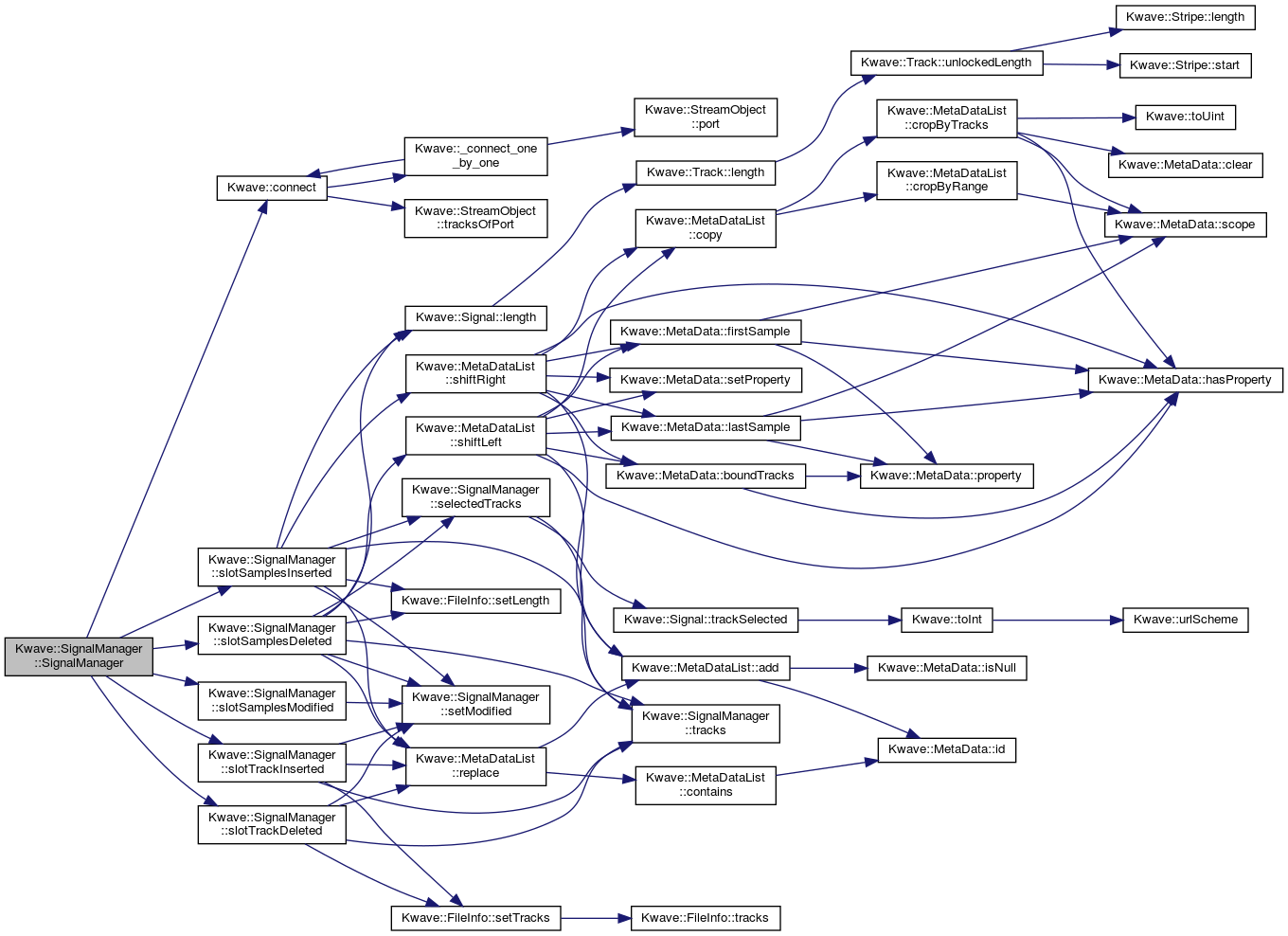
◆ ~SignalManager()
|
virtual |
Default destructor
Definition at line 116 of file SignalManager.cpp.
References close().
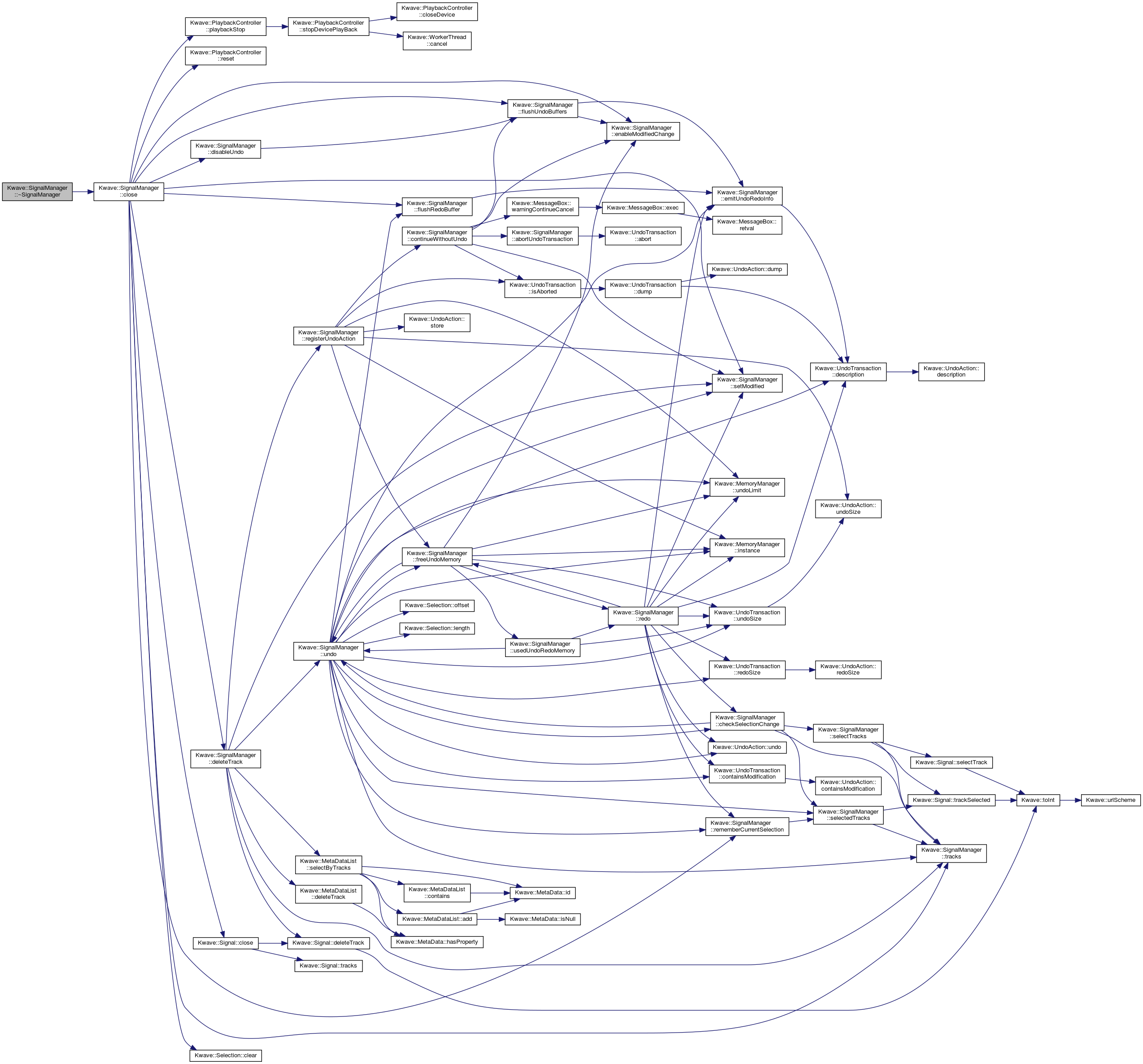
Member Function Documentation
◆ abortUndoTransaction()
|
protected |
Aborts an undo transaction by deleting all of it's undo actions.
Definition at line 1361 of file SignalManager.cpp.
References Kwave::UndoTransaction::abort(), and m_undo_transaction.
Referenced by Kwave::UndoTransactionGuard::abort(), Kwave::MainWidget::addLabel(), continueWithoutUndo(), deleteLabel(), deleteRange(), and Kwave::MainWidget::labelProperties().

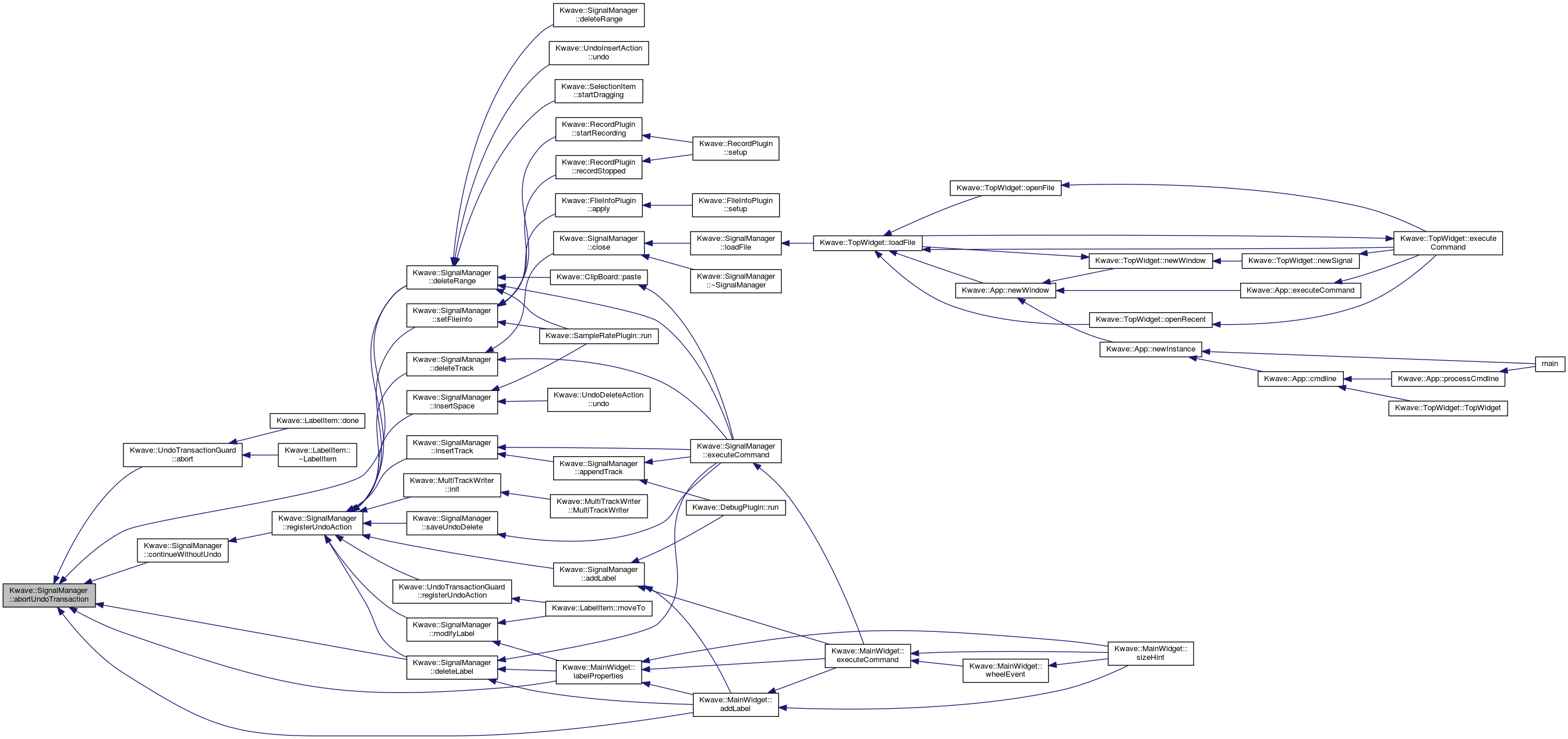
◆ addLabel()
| Kwave::Label Kwave::SignalManager::addLabel | ( | sample_index_t | pos, |
| const QString & | name | ||
| ) |
add a new label, without undo
- Parameters
-
pos position of the label [samples] name the name of the label
- Returns
- a newly created label instance
Definition at line 1878 of file SignalManager.cpp.
References Kwave::MetaDataList::add(), findLabel(), m_meta_data, m_undo_enabled, registerUndoAction(), setModified(), sigMetaDataChanged(), and undo().
Referenced by Kwave::MainWidget::addLabel(), Kwave::MainWidget::executeCommand(), and Kwave::DebugPlugin::run().
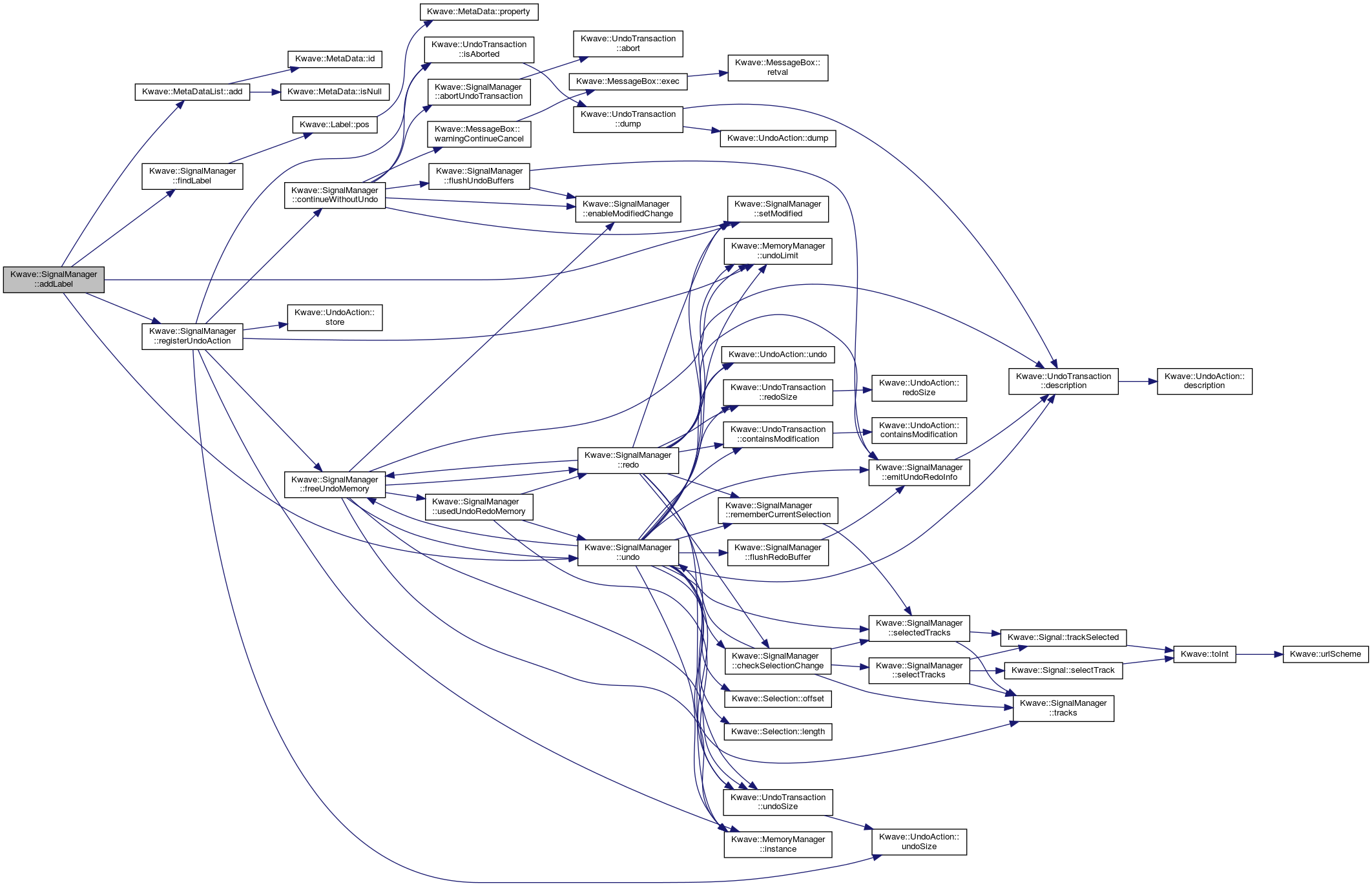

◆ allTracks()
| const QList< unsigned int > Kwave::SignalManager::allTracks | ( | ) |
Returns an array of indices of all present tracks.
Definition at line 601 of file SignalManager.cpp.
References Kwave::Signal::allTracks(), and m_signal.
Referenced by Kwave::MimeData::decode(), executeCommand(), Kwave::OverViewCache::getMinMax(), loadFile(), Kwave::SonagramPlugin::makeAllValid(), Kwave::SampleRatePlugin::run(), Kwave::DebugPlugin::run(), Kwave::PlaybackController::run_wrapper(), and save().

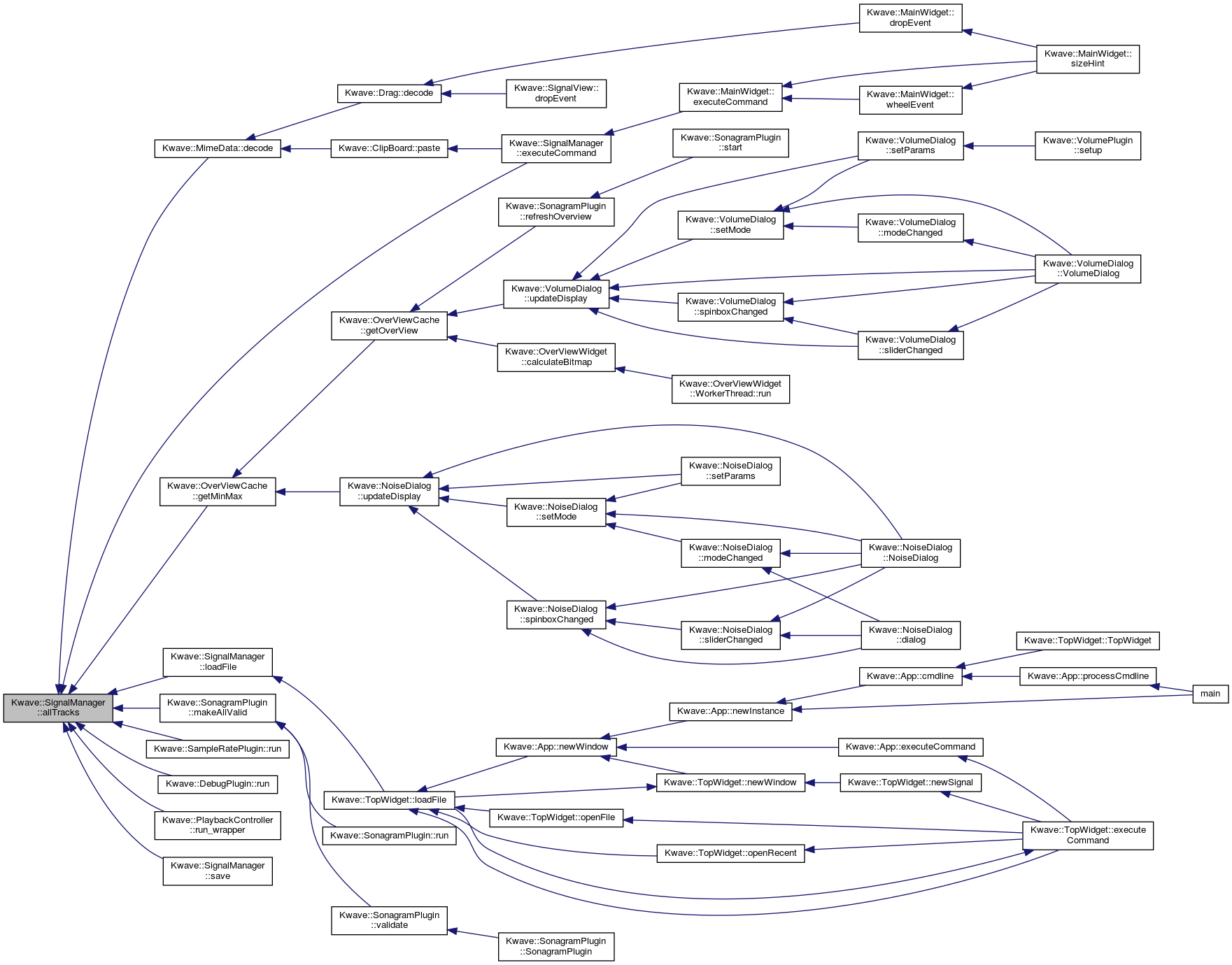
◆ appendTrack()
| void Kwave::SignalManager::appendTrack | ( | ) |
Inserts a new track with the size of the current signal after the last track. The same as insertTrack(tracks()).
Definition at line 902 of file SignalManager.cpp.
References insertTrack(), tracks(), and undo().
Referenced by executeCommand(), and Kwave::DebugPlugin::run().
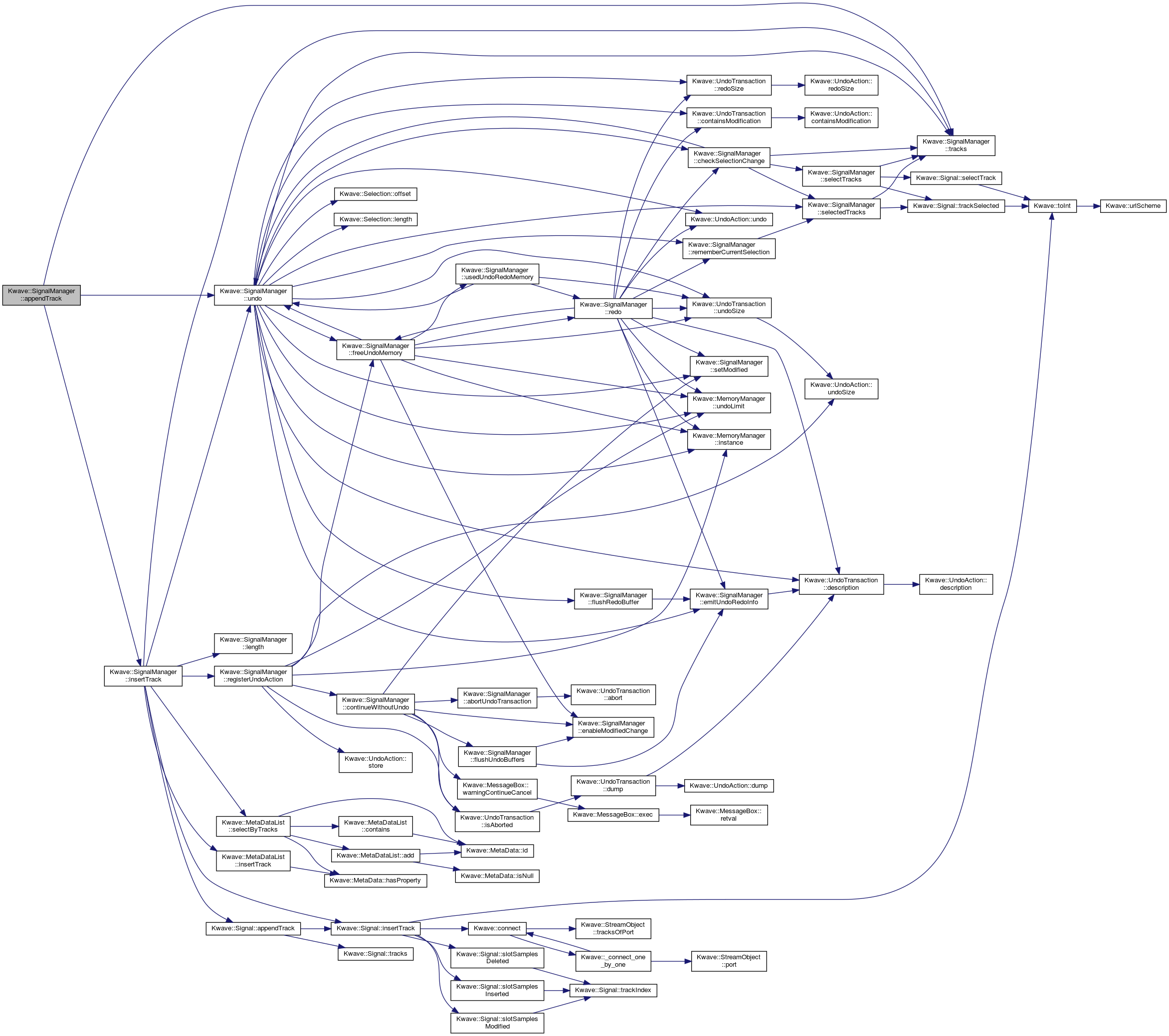

◆ bits()
|
inline |
Returns the current sample resolution in bits per sample
Definition at line 126 of file SignalManager.h.
References Kwave::FileInfo::bits().
Referenced by save(), Kwave::SelectionItem::startDragging(), and Kwave::RecordPlugin::startRecording().


◆ canRedo()
|
inline |
Return true if redo is possible
Definition at line 317 of file SignalManager.h.
References name.
Referenced by Kwave::SignalWidget::contextMenuEvent().

◆ canUndo()
|
inline |
Return true if undo is possible
Definition at line 312 of file SignalManager.h.
Referenced by Kwave::SignalWidget::contextMenuEvent().

◆ checkSelectionChange()
|
private |
Check whether the selection has changed since the start of the last undo and create a new undo action if the selection has been modified (e.g. manually)
Definition at line 2006 of file SignalManager.cpp.
References m_last_selection, m_last_track_selection, m_selection, m_undo_transaction_level, selectedTracks(), selectTracks(), tracks(), and undo().
Referenced by redo(), startUndoTransaction(), and undo().
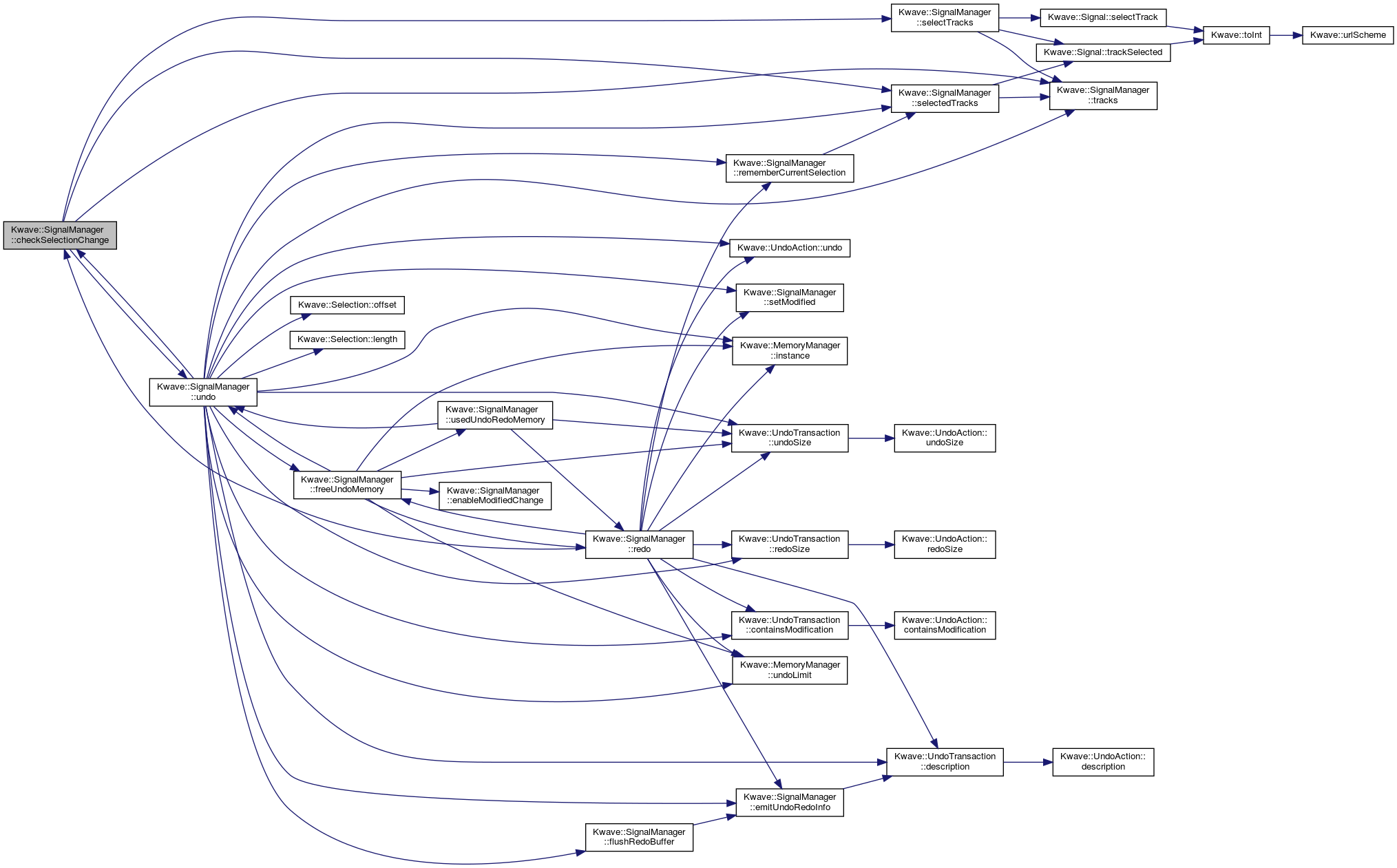
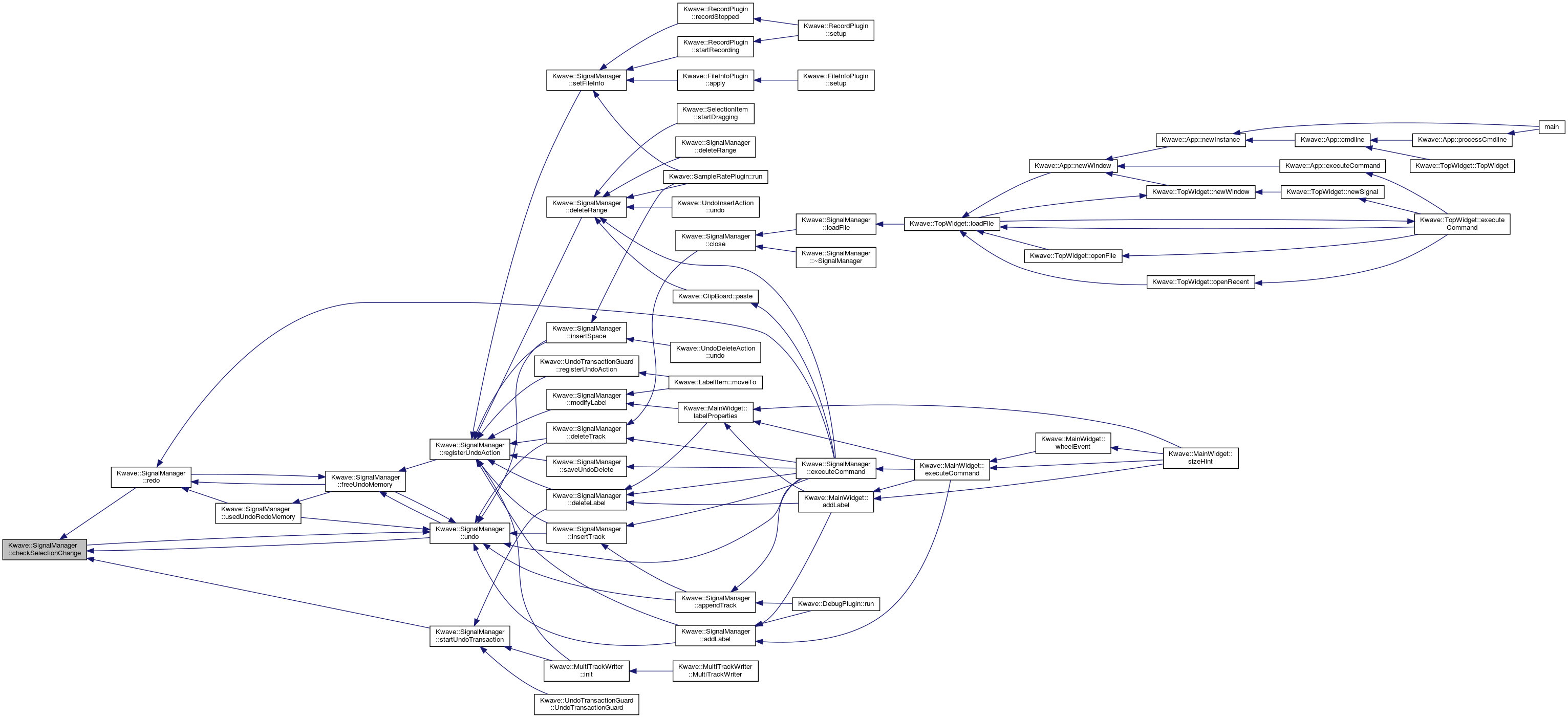
◆ close()
| void Kwave::SignalManager::close | ( | ) |
Closes the current signal.
Definition at line 533 of file SignalManager.cpp.
References Kwave::Selection::clear(), Kwave::Signal::close(), deleteTrack(), disableUndo(), enableModifiedChange(), flushRedoBuffer(), flushUndoBuffers(), m_closed, m_empty, m_last_length, m_meta_data, m_playback_controller, m_selection, m_signal, Kwave::PlaybackController::playbackStop(), rememberCurrentSelection(), Kwave::PlaybackController::reset(), setModified(), sigMetaDataChanged(), and tracks().
Referenced by loadFile(), and ~SignalManager().
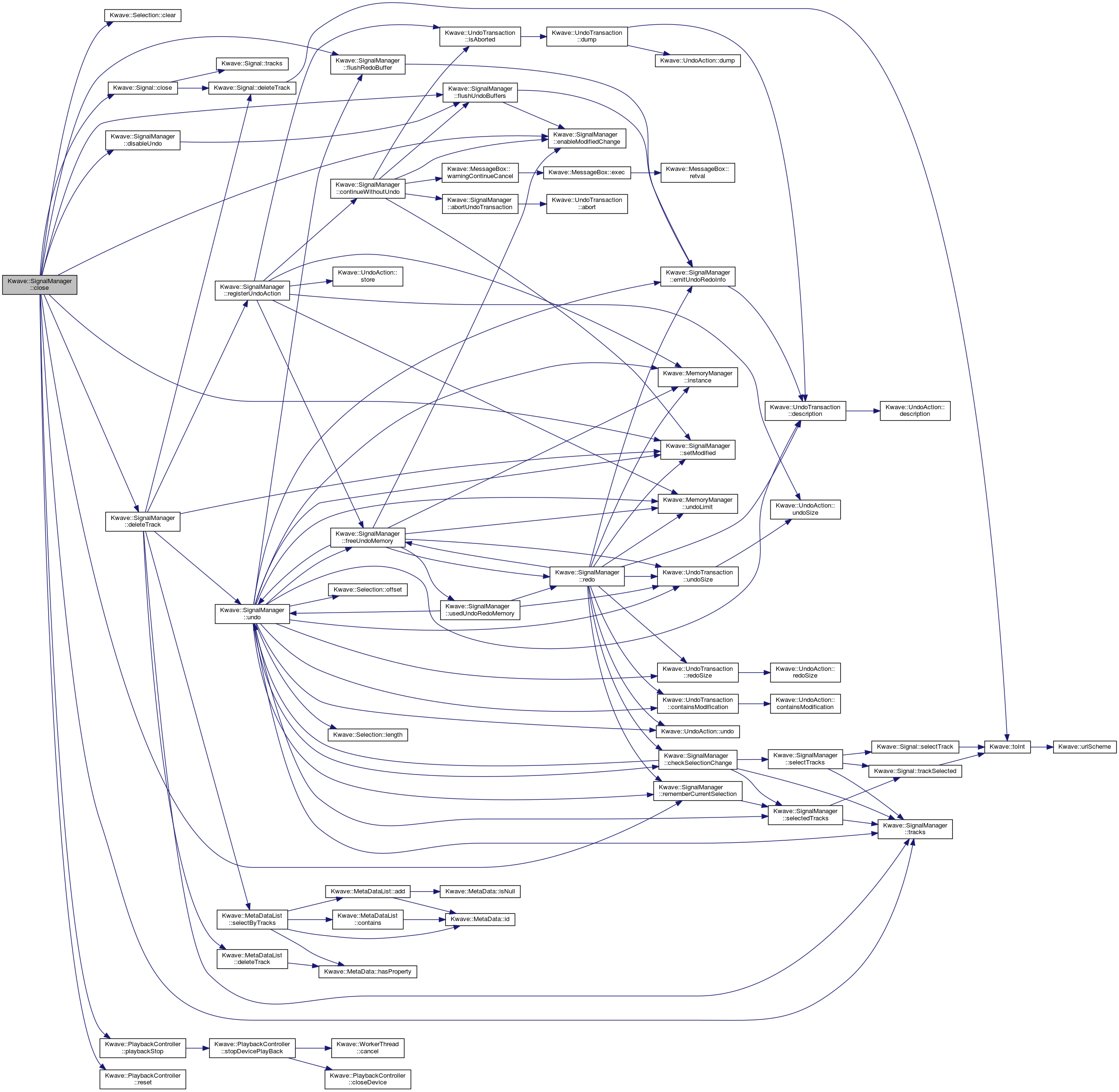

◆ closeUndoTransaction
|
privateslot |
Closes an undo transaction or recurses the current recursion level of nested undo transactions.
Definition at line 1264 of file SignalManager.cpp.
References emitUndoRedoInfo(), Kwave::UndoTransaction::isAborted(), m_undo_buffer, m_undo_transaction, m_undo_transaction_level, m_undo_transaction_lock, rememberCurrentSelection(), and Kwave::UndoAction::undo().
Referenced by deleteLabel(), and Kwave::UndoTransactionGuard::~UndoTransactionGuard().


◆ continueWithoutUndo()
|
private |
Ask the user if he wants to continue without undo, maybe registering an undo action has failed due to out-of-memory.
- Returns
- true if it is ok, false if the user doesn't want to.
Definition at line 1376 of file SignalManager.cpp.
References _, abortUndoTransaction(), enableModifiedChange(), flushUndoBuffers(), Kwave::UndoTransaction::isAborted(), m_parent_widget, m_undo_transaction, setModified(), and Kwave::MessageBox::warningContinueCancel().
Referenced by registerUndoAction().
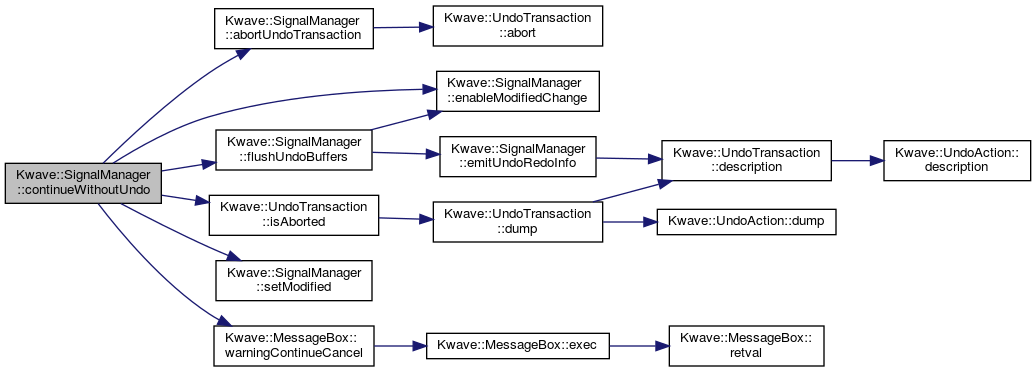
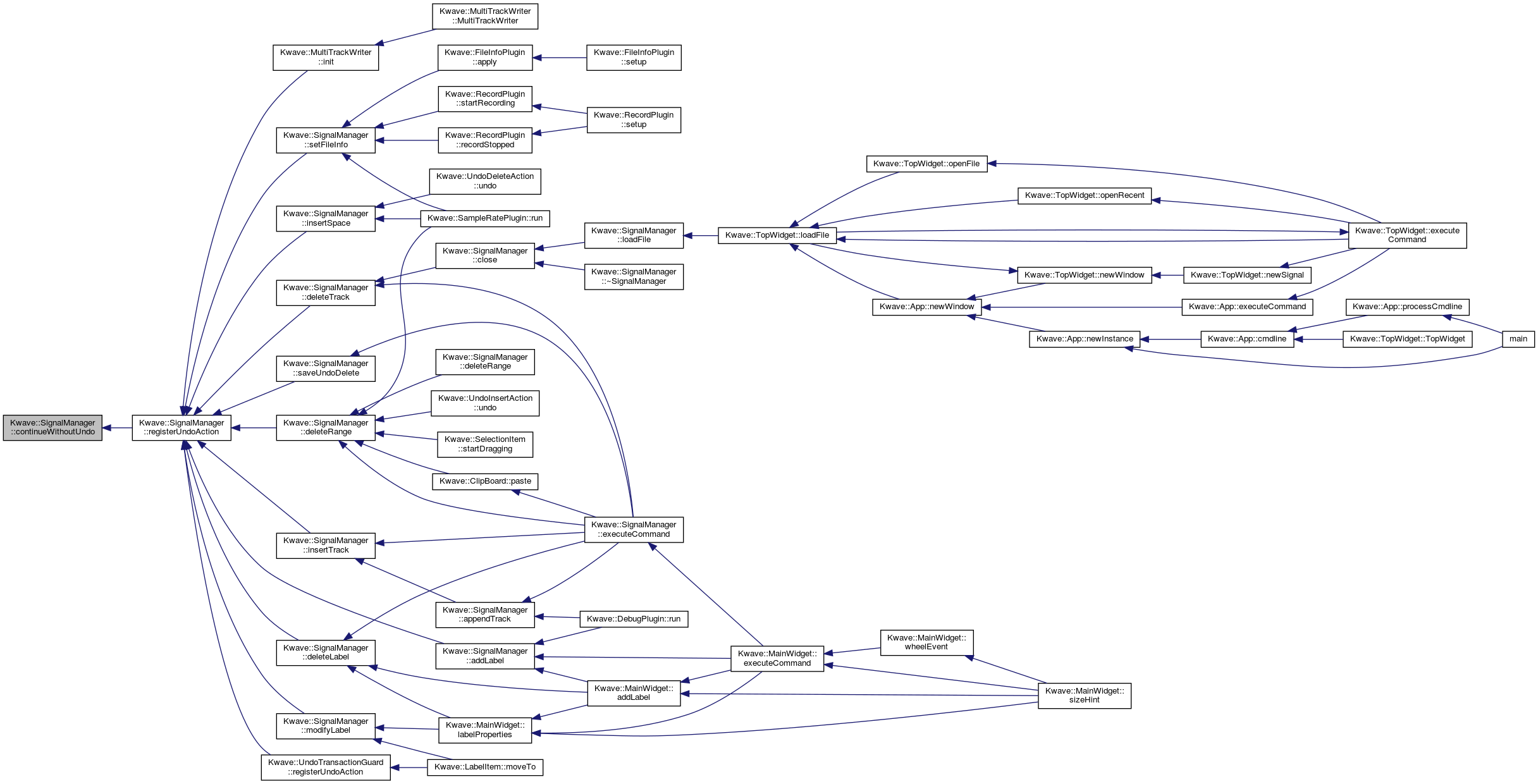
◆ deleteLabel()
| void Kwave::SignalManager::deleteLabel | ( | int | index, |
| bool | with_undo | ||
| ) |
delete an existing label
- Parameters
-
index the index of the label [0...N-1] with_undo if true, create undo info
Definition at line 1907 of file SignalManager.cpp.
References abortUndoTransaction(), closeUndoTransaction(), m_meta_data, registerUndoAction(), Kwave::MetaDataList::remove(), setModified(), sigMetaDataChanged(), startUndoTransaction(), and Kwave::toInt().
Referenced by Kwave::MainWidget::addLabel(), executeCommand(), and Kwave::MainWidget::labelProperties().
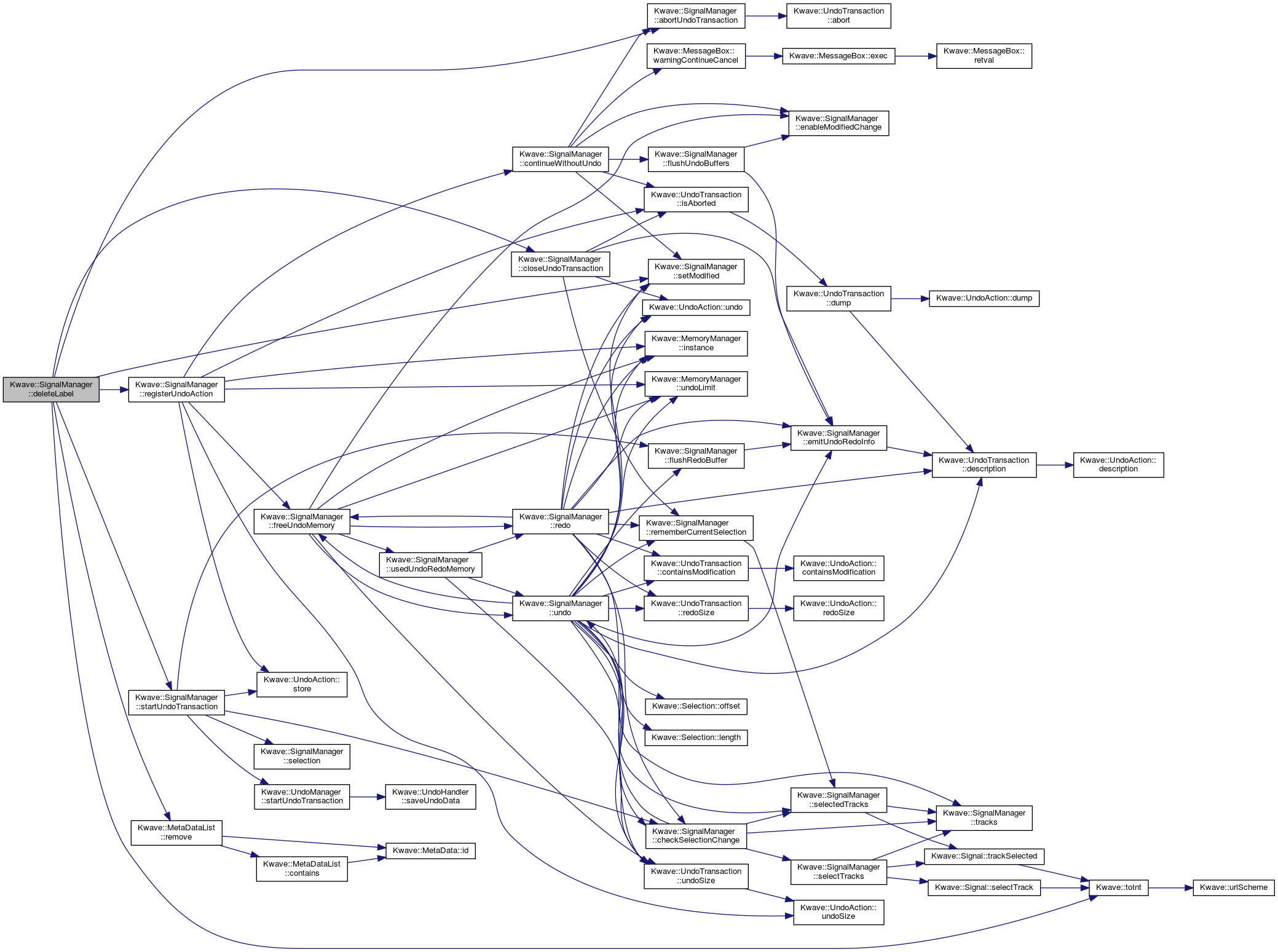

◆ deleteRange() [1/3]
| bool Kwave::SignalManager::deleteRange | ( | sample_index_t | offset, |
| sample_index_t | length, | ||
| const QList< unsigned int > & | track_list | ||
| ) |
Deletes a range of samples and creates an undo action.
- Parameters
-
offset index of the first sample length number of samples track_list a list of tracks to be affected
- Returns
- true if successful or nothing to do, false if not enough memory for undo
Definition at line 1064 of file SignalManager.cpp.
References abortUndoTransaction(), Kwave::MetaDataList::copy(), Kwave::Signal::deleteRange(), Kwave::MetaDataList::deleteRange(), m_meta_data, m_parent_widget, m_signal, m_undo_enabled, registerUndoAction(), and sigMetaDataChanged().
Referenced by deleteRange(), executeCommand(), Kwave::ClipBoard::paste(), Kwave::SampleRatePlugin::run(), Kwave::SelectionItem::startDragging(), and Kwave::UndoInsertAction::undo().
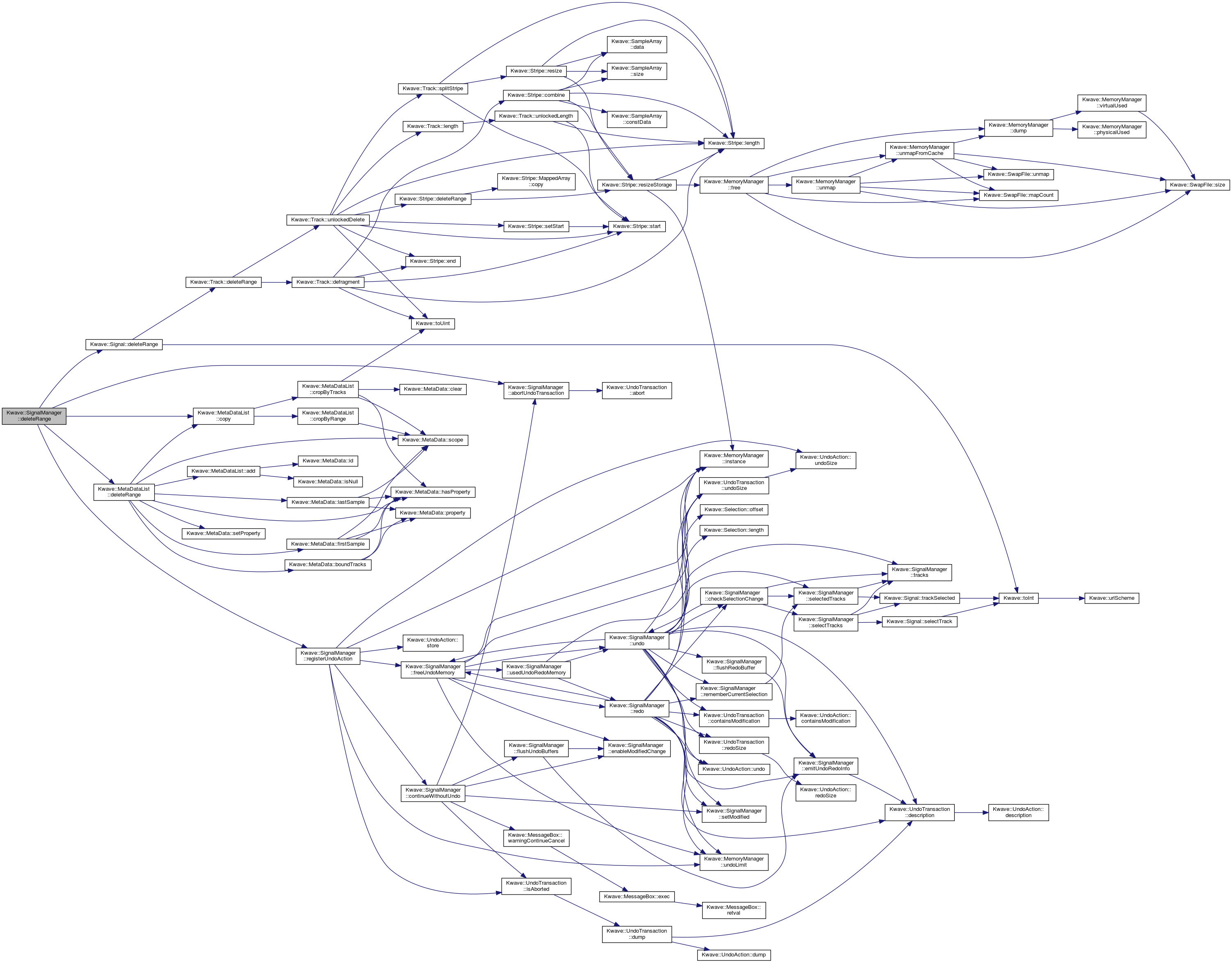

◆ deleteRange() [2/3]
| bool Kwave::SignalManager::deleteRange | ( | sample_index_t | offset, |
| sample_index_t | length | ||
| ) |
Deletes a range of samples and creates an undo action. Same as above, but affects all tracks.
- Parameters
-
offset index of the first sample length number of samples
- Returns
- true if successful or nothing to do, false if not enough memory for undo
Definition at line 1103 of file SignalManager.cpp.
References deleteRange(), and selectedTracks().
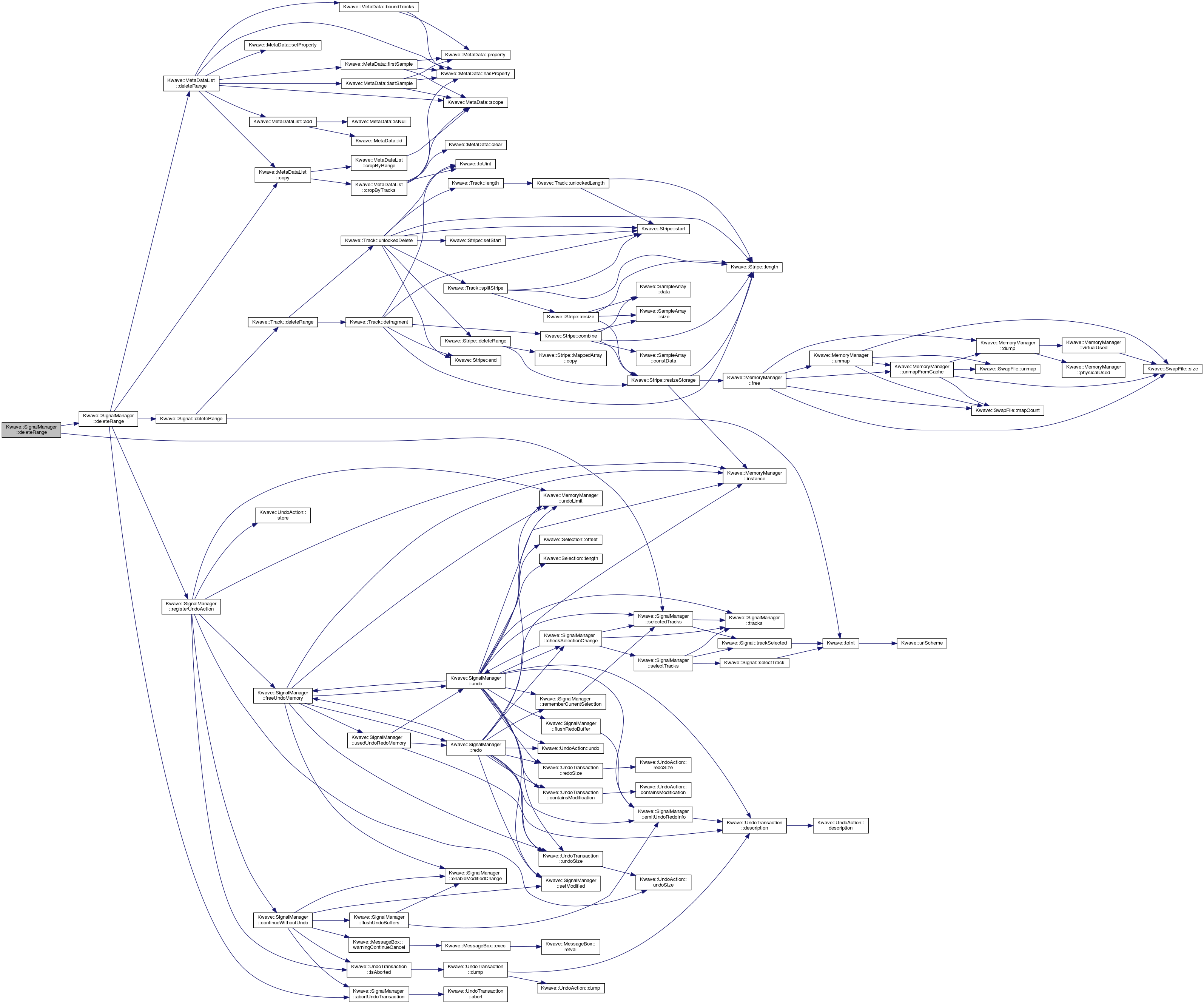
◆ deleteRange() [3/3]
|
inlineprotected |
Deletes a range of samples.
- Note
- only for internal usage in the UndoInsertAction!
- Parameters
-
track index of the track offset index of the first sample length number of samples
- See also
- Signal::deleteRange
Definition at line 591 of file SignalManager.h.
◆ deleteTrack()
| void Kwave::SignalManager::deleteTrack | ( | unsigned int | index | ) |
Deletes a track from the current signal, including generation of an undo action.
- Parameters
-
index the index of the track to be deleted [0...tracks()-1]
Definition at line 951 of file SignalManager.cpp.
References Kwave::Signal::deleteTrack(), Kwave::MetaDataList::deleteTrack(), m_meta_data, m_signal, m_undo_enabled, registerUndoAction(), Kwave::MetaDataList::selectByTracks(), setModified(), tracks(), and undo().
Referenced by close(), and executeCommand().
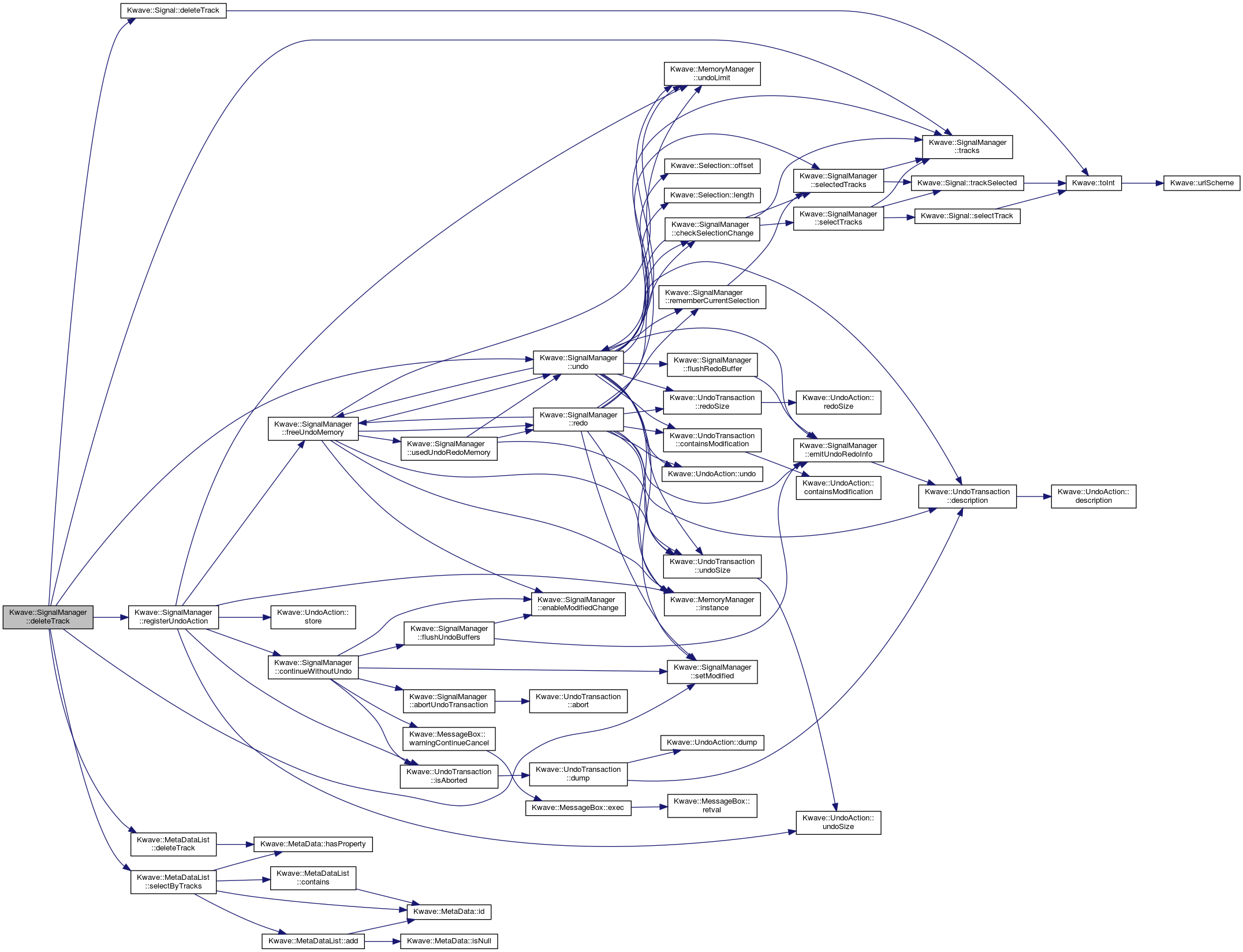

◆ disableUndo()
| void Kwave::SignalManager::disableUndo | ( | ) |
Disables undo and redo. If undo/redo was enabled, all undo data will be discarded in order to avoid trouble when modifications are done while undo is of.
- Note
- No modifications should be performed while undo is off!
Definition at line 1330 of file SignalManager.cpp.
References flushUndoBuffers(), m_undo_enabled, and m_undo_transaction_level.
Referenced by close(), loadFile(), newSignal(), and Kwave::RecordPlugin::startRecording().


◆ emitUndoRedoInfo
|
privateslot |
Determines the description of undo and redo actions and emits a sigUndoRedoInfo. If undo or redo is currently not available, the descriptions will be zero-length. If an action is available but does not have a description, the description will be set to "last action".
- See also
- sigUndoRedoInfo
Definition at line 1532 of file SignalManager.cpp.
References Kwave::UndoTransaction::description(), m_redo_buffer, m_undo_buffer, m_undo_enabled, and sigUndoRedoInfo().
Referenced by closeUndoTransaction(), enableUndo(), flushRedoBuffer(), flushUndoBuffers(), redo(), setFileInfo(), and undo().

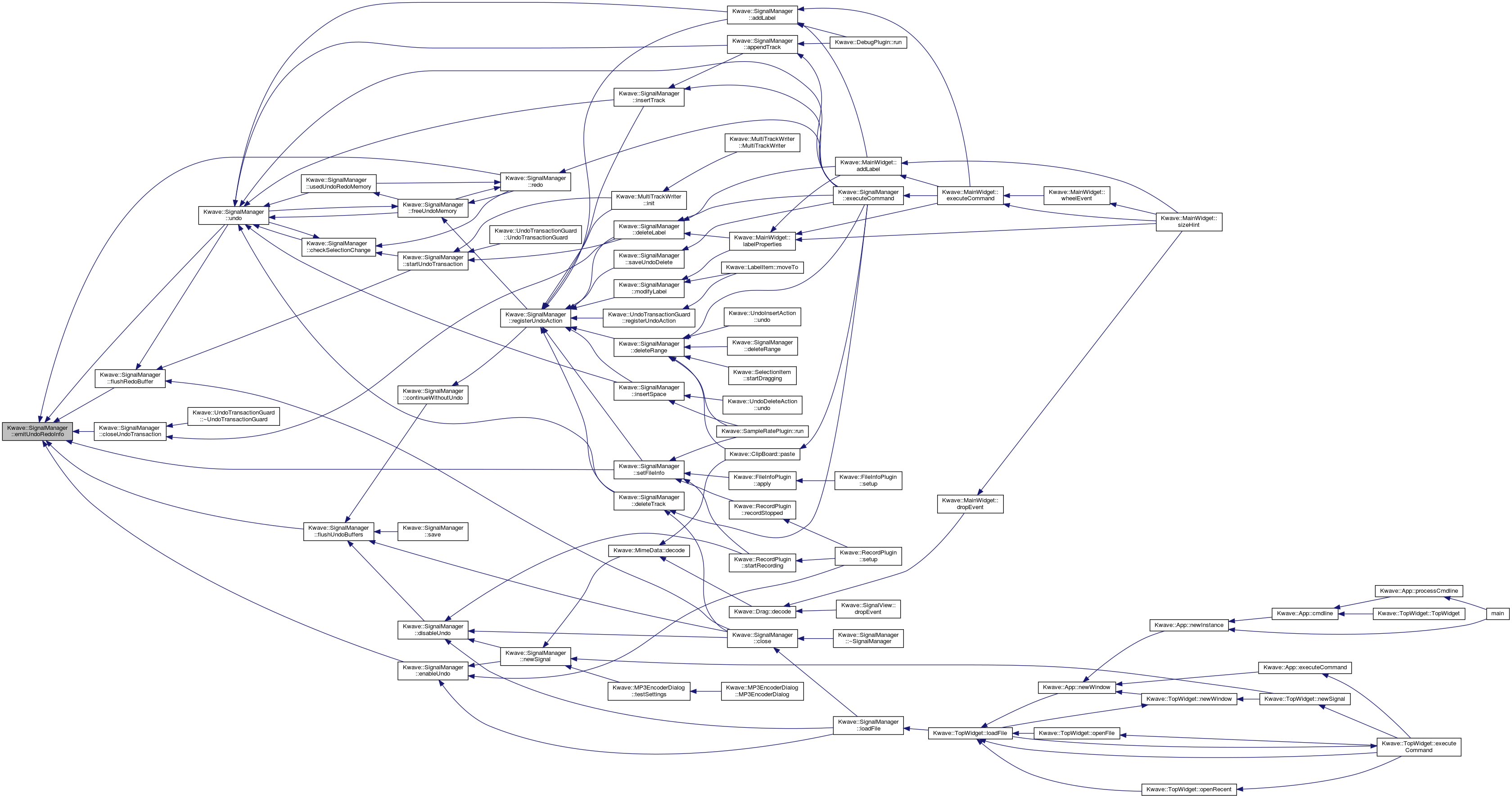
◆ enableModifiedChange()
|
private |
Enables changes of the modified flag.
- Parameters
-
en new value for m_modified_enabled
Definition at line 1829 of file SignalManager.cpp.
References m_modified_enabled.
Referenced by close(), continueWithoutUndo(), flushUndoBuffers(), freeUndoMemory(), loadFile(), newSignal(), and save().
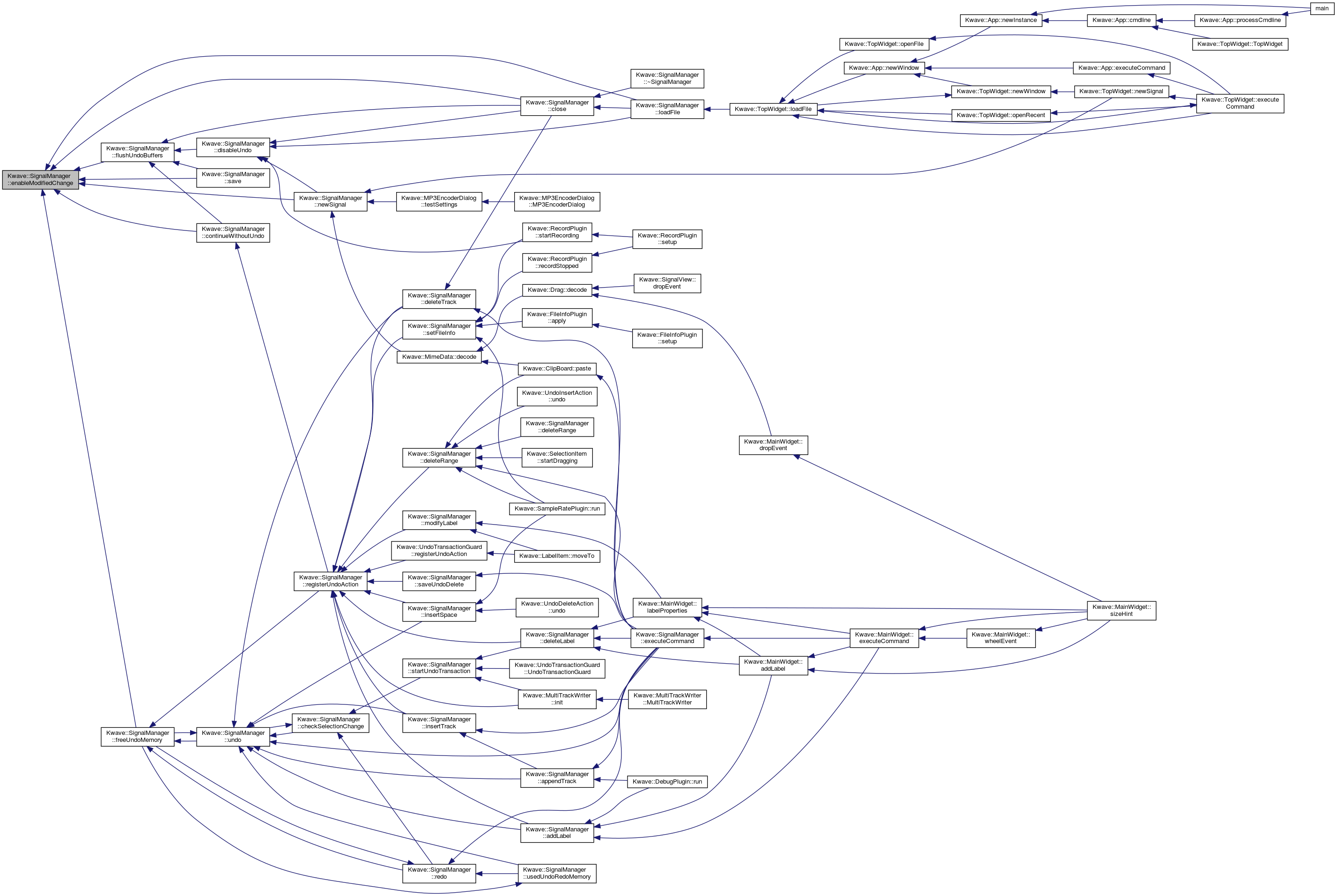
◆ enableUndo()
| void Kwave::SignalManager::enableUndo | ( | ) |
Enables undo and redo. If undo/redo is already enabled, nothing will be done.
Definition at line 1323 of file SignalManager.cpp.
References emitUndoRedoInfo(), and m_undo_enabled.
Referenced by loadFile(), newSignal(), and Kwave::RecordPlugin::setup().


◆ executeCommand()
| int Kwave::SignalManager::executeCommand | ( | const QString & | command | ) |
Execute a Kwave text command
- Parameters
-
command a text command
- Returns
- zero if succeeded or negative error code if failed
- Return values
-
-ENOSYS is returned if the command is unknown in this component
Definition at line 607 of file SignalManager.cpp.
References Kwave::FileInfo::allKnownProperties(), allTracks(), appendTrack(), CASE_COMMAND, Kwave::ClipBoard::clear(), Kwave::ClipBoard::copy(), DBG, deleteLabel(), Kwave::Signal::deleteRange(), deleteRange(), deleteTrack(), Kwave::MetaDataList::dump(), Kwave::Selection::first(), Kwave::Parser::firstParam(), insertTrack(), Kwave::ClipBoard::instance(), Kwave::ClipBoard::isEmpty(), Kwave::MetaData::isNull(), Kwave::Selection::last(), Kwave::Selection::length(), length(), m_meta_data, m_parent_widget, m_playback_controller, m_redo_buffer, m_selection, m_signal, m_undo_buffer, m_undo_enabled, Kwave::FileInfo::name(), Kwave::Parser::nextParam(), Kwave::Selection::offset(), Kwave::ClipBoard::paste(), Kwave::PlaybackController::playbackStart(), Kwave::Label::pos(), redo(), rememberCurrentSelection(), Kwave::MetaDataList::replace(), saveUndoDelete(), selectedTracks(), selection(), selectRange(), selectTrack(), Kwave::FileInfo::set(), sigMetaDataChanged(), Kwave::Parser::toInt(), Kwave::Parser::toSampleIndex(), Kwave::Parser::toUInt(), tracks(), trackSelected(), and undo().
Referenced by Kwave::MainWidget::executeCommand().
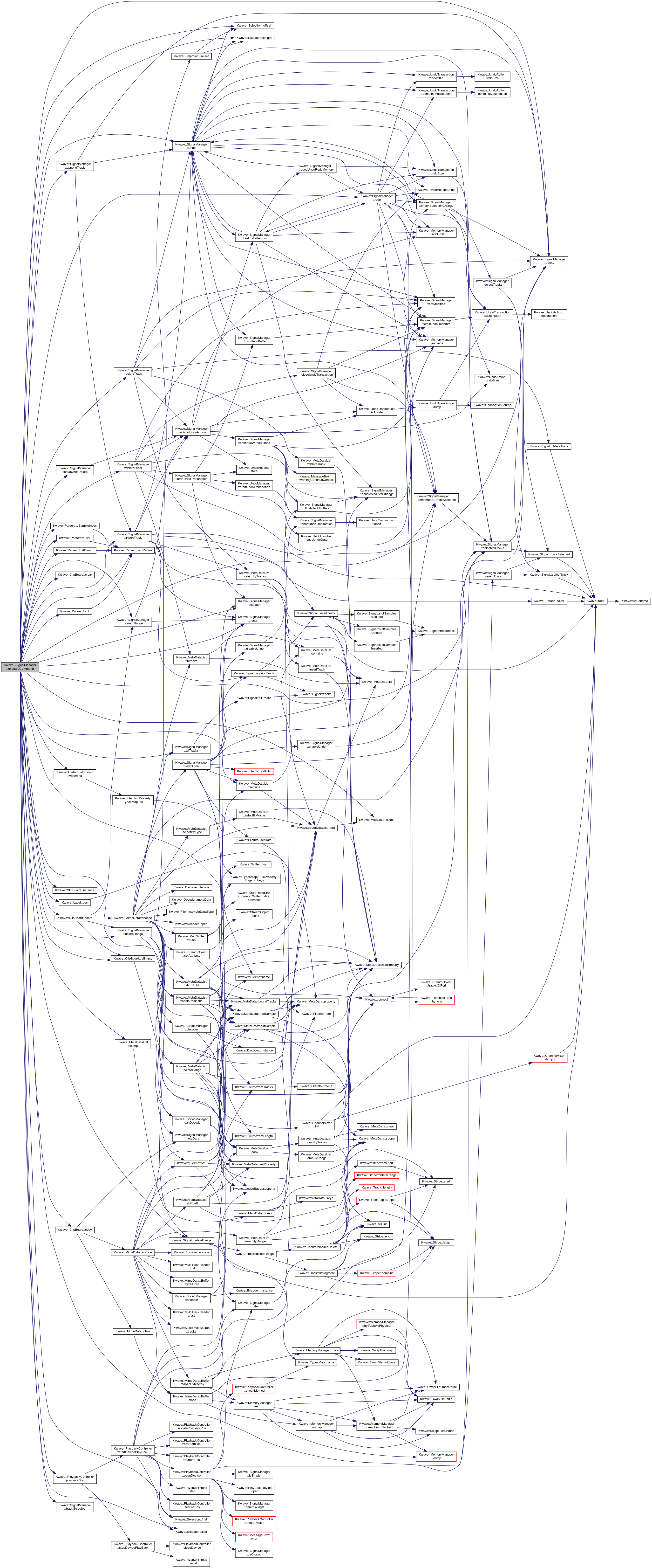

◆ findLabel()
| Kwave::Label Kwave::SignalManager::findLabel | ( | sample_index_t | pos | ) |
returns the label at a given exact position
- Parameters
-
pos position of the label [samples]
- Returns
- valid label at the position or null label if not found
Definition at line 1856 of file SignalManager.cpp.
References m_meta_data, and Kwave::Label::pos().
Referenced by addLabel(), Kwave::MainWidget::labelProperties(), modifyLabel(), and Kwave::LabelItem::moveTo().


◆ flushRedoBuffer()
|
protected |
Removes all redo transactions.
Definition at line 1368 of file SignalManager.cpp.
References emitUndoRedoInfo(), and m_redo_buffer.
Referenced by close(), startUndoTransaction(), and undo().

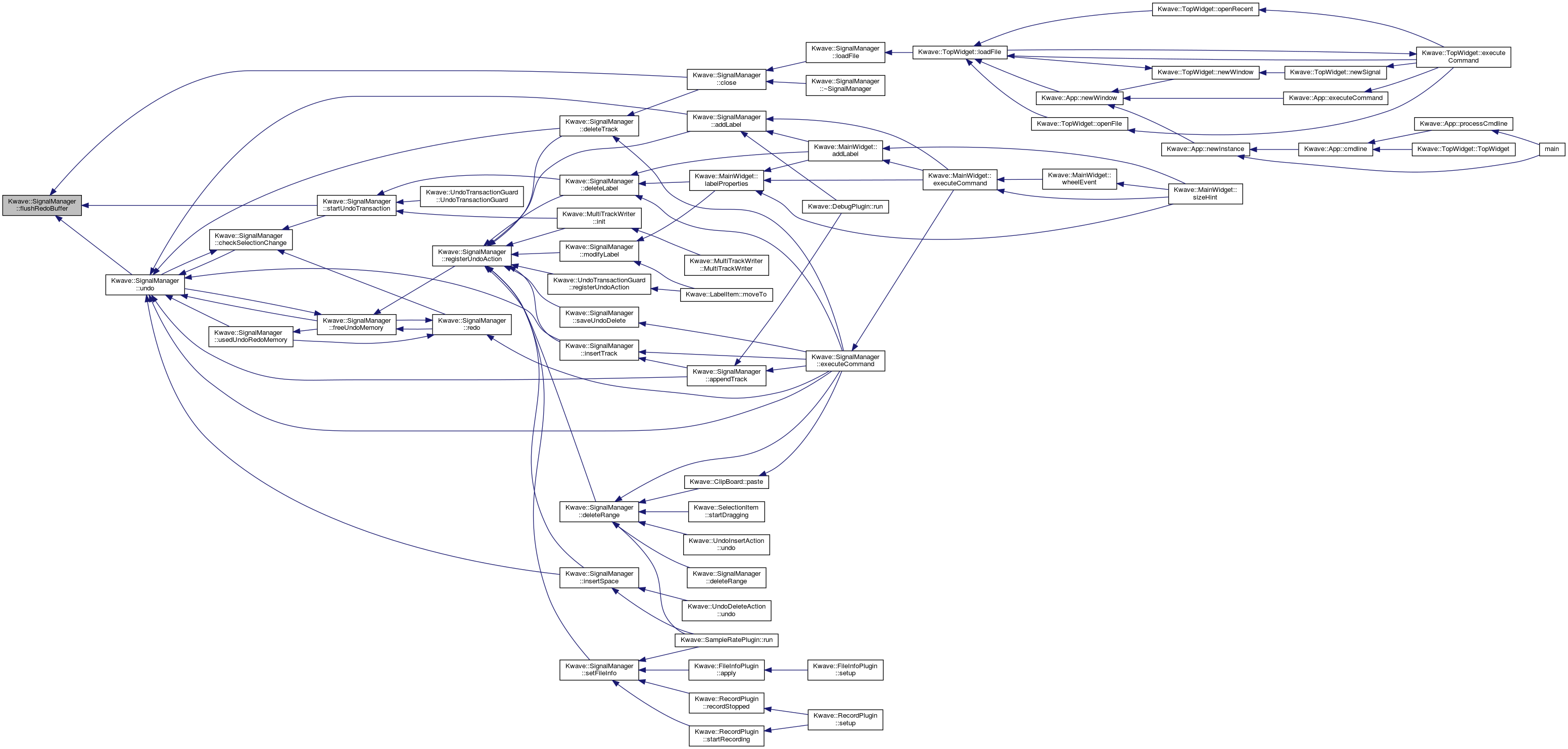
◆ flushUndoBuffers()
|
protected |
Removes all undo and redo transactions.
- Note
- must not be called if an undo transaction is currently active!
Definition at line 1341 of file SignalManager.cpp.
References emitUndoRedoInfo(), enableModifiedChange(), m_modified, m_redo_buffer, m_undo_buffer, and m_undo_transaction_lock.
Referenced by close(), continueWithoutUndo(), disableUndo(), and save().

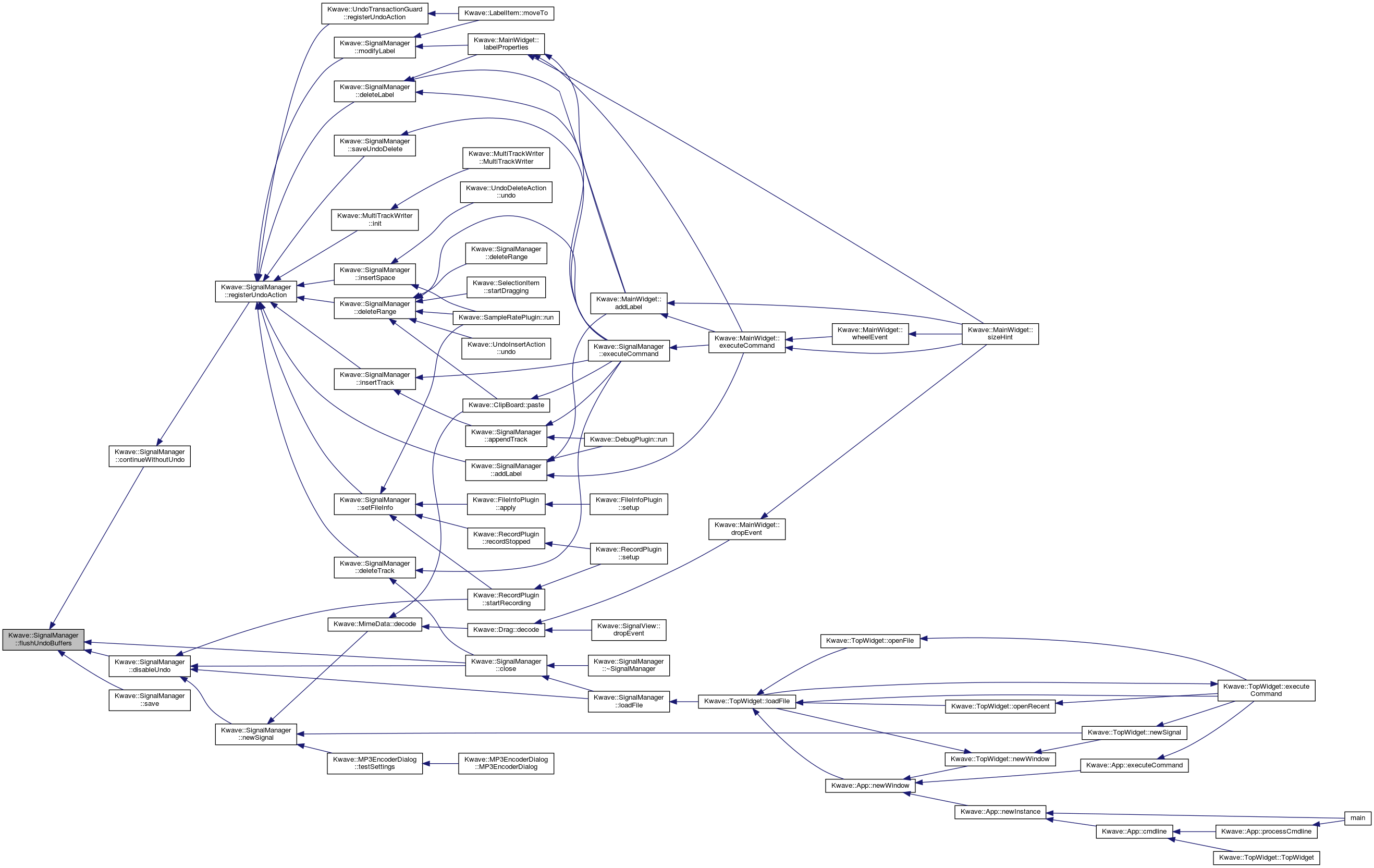
◆ freeUndoMemory()
|
private |
Makes sure that enough memory for a following undo (or redo) action is available. If necessary, it deletes old undo transactions and if still no enough, it also removes old redo transactions.
- Parameters
-
needed the amount of memory that should be free afterwards
Definition at line 1503 of file SignalManager.cpp.
References enableModifiedChange(), Kwave::MemoryManager::instance(), m_modified, m_redo_buffer, m_undo_buffer, redo(), undo(), Kwave::MemoryManager::undoLimit(), Kwave::UndoTransaction::undoSize(), and usedUndoRedoMemory().
Referenced by redo(), registerUndoAction(), and undo().
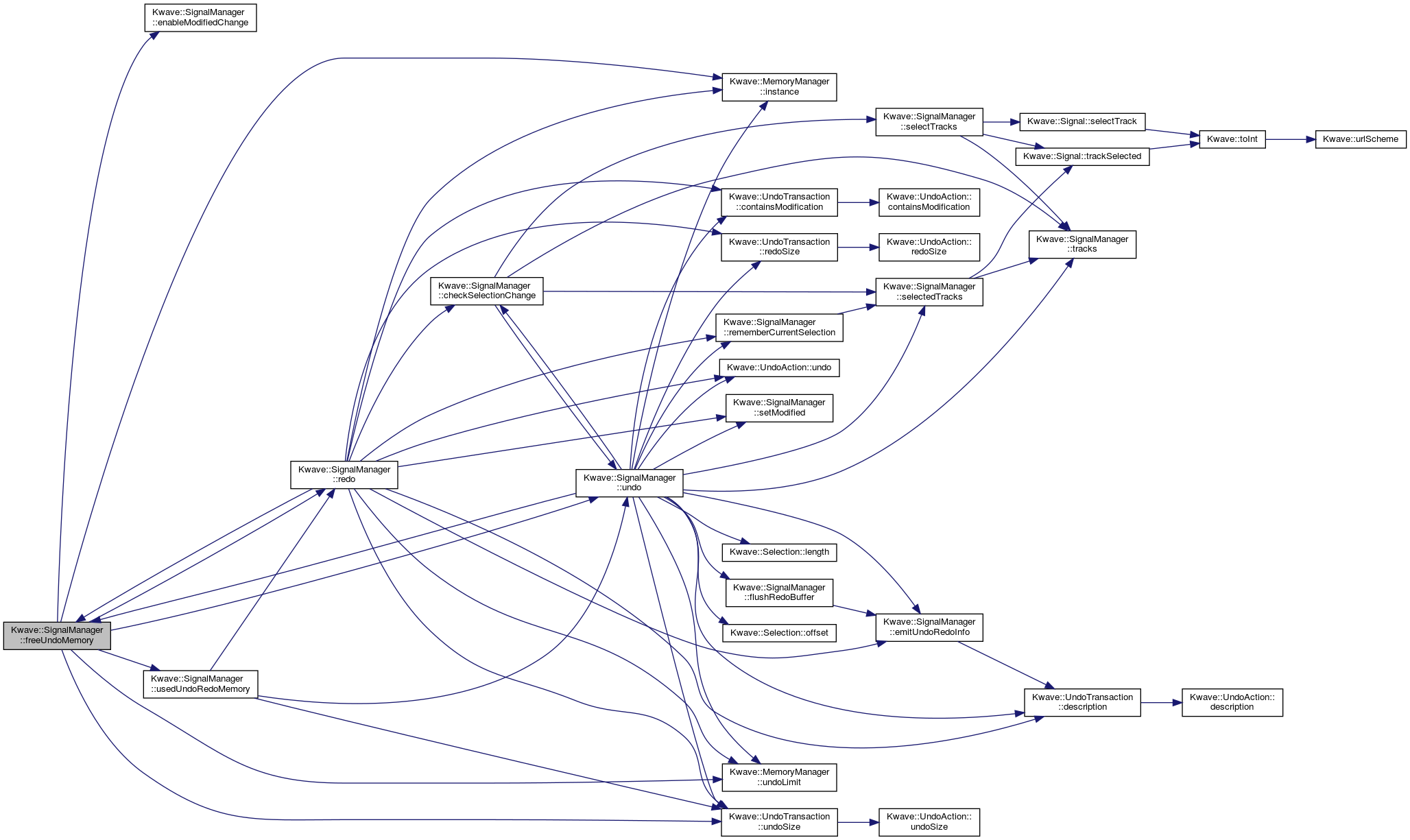
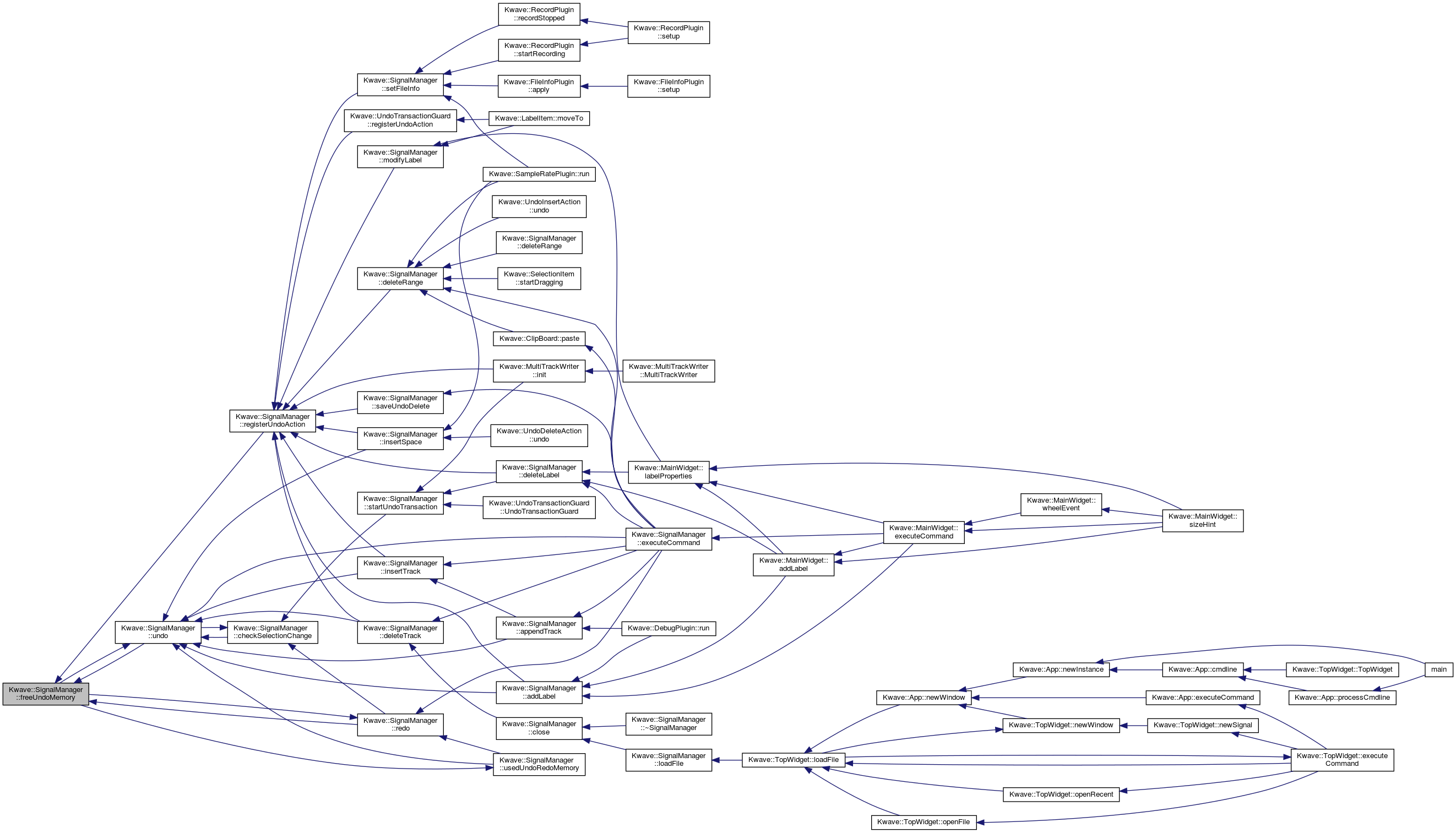
◆ insertSpace()
| bool Kwave::SignalManager::insertSpace | ( | sample_index_t | offset, |
| sample_index_t | length, | ||
| const QList< unsigned int > & | track_list | ||
| ) |
Inserts space at a given position and creates an undo action.
- Parameters
-
offset position of the first sample to insert length number of samples track_list a list of tracks to be affected
- Returns
- true if successful or nothing to do, false if not enough memory for undo
Definition at line 1110 of file SignalManager.cpp.
References Kwave::Signal::insertSpace(), m_parent_widget, m_signal, m_undo_enabled, registerUndoAction(), and undo().
Referenced by Kwave::SampleRatePlugin::run(), and Kwave::UndoDeleteAction::undo().
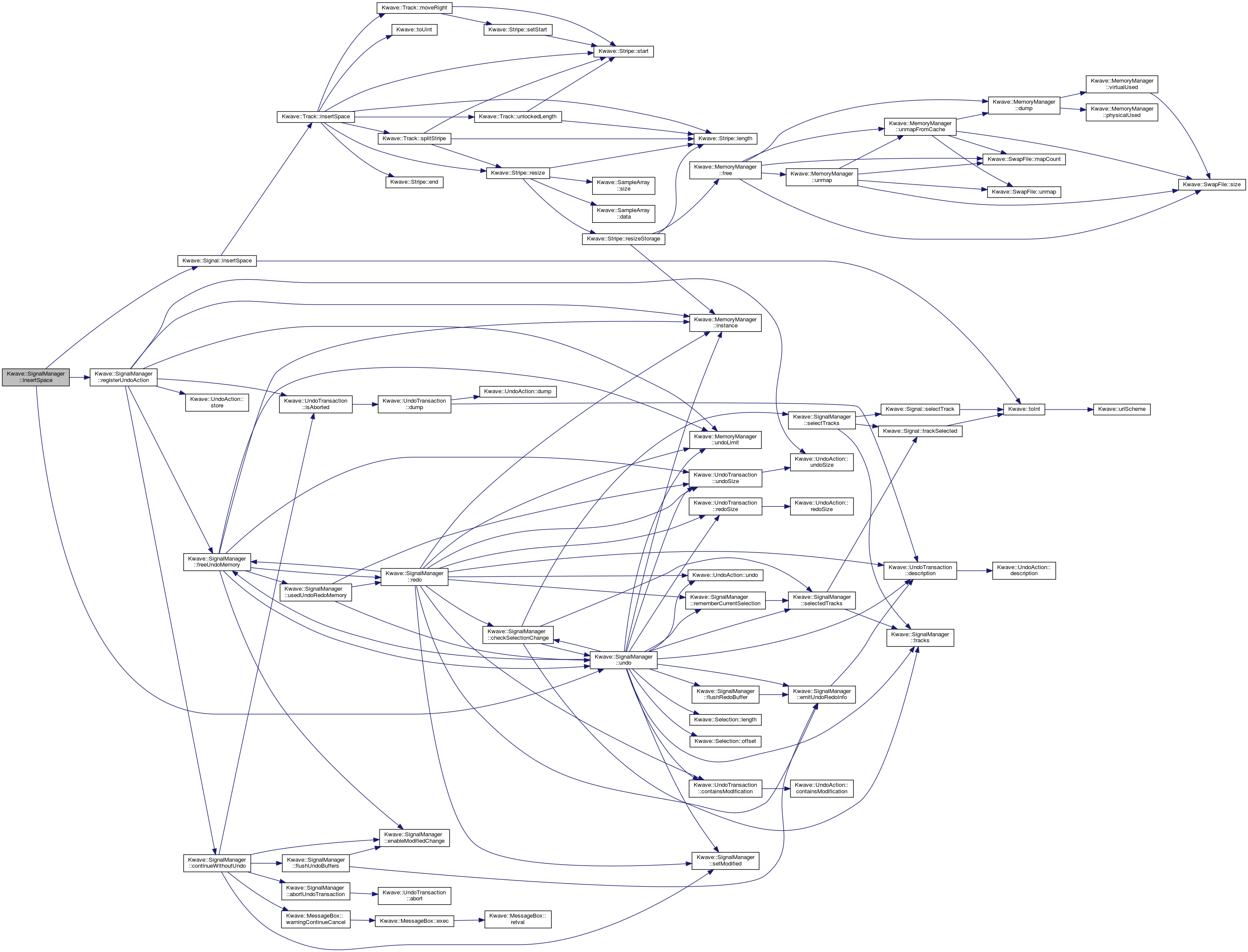

◆ insertTrack()
| void Kwave::SignalManager::insertTrack | ( | unsigned int | index | ) |
Inserts a new track in the current signal.
- Parameters
-
index position at which the new track will be inserted [0...tracks()]
Definition at line 909 of file SignalManager.cpp.
References Kwave::Signal::appendTrack(), Kwave::Signal::insertTrack(), Kwave::MetaDataList::insertTrack(), length(), m_last_length, m_meta_data, m_signal, m_undo_enabled, registerUndoAction(), Kwave::MetaDataList::selectByTracks(), tracks(), and undo().
Referenced by appendTrack(), and executeCommand().
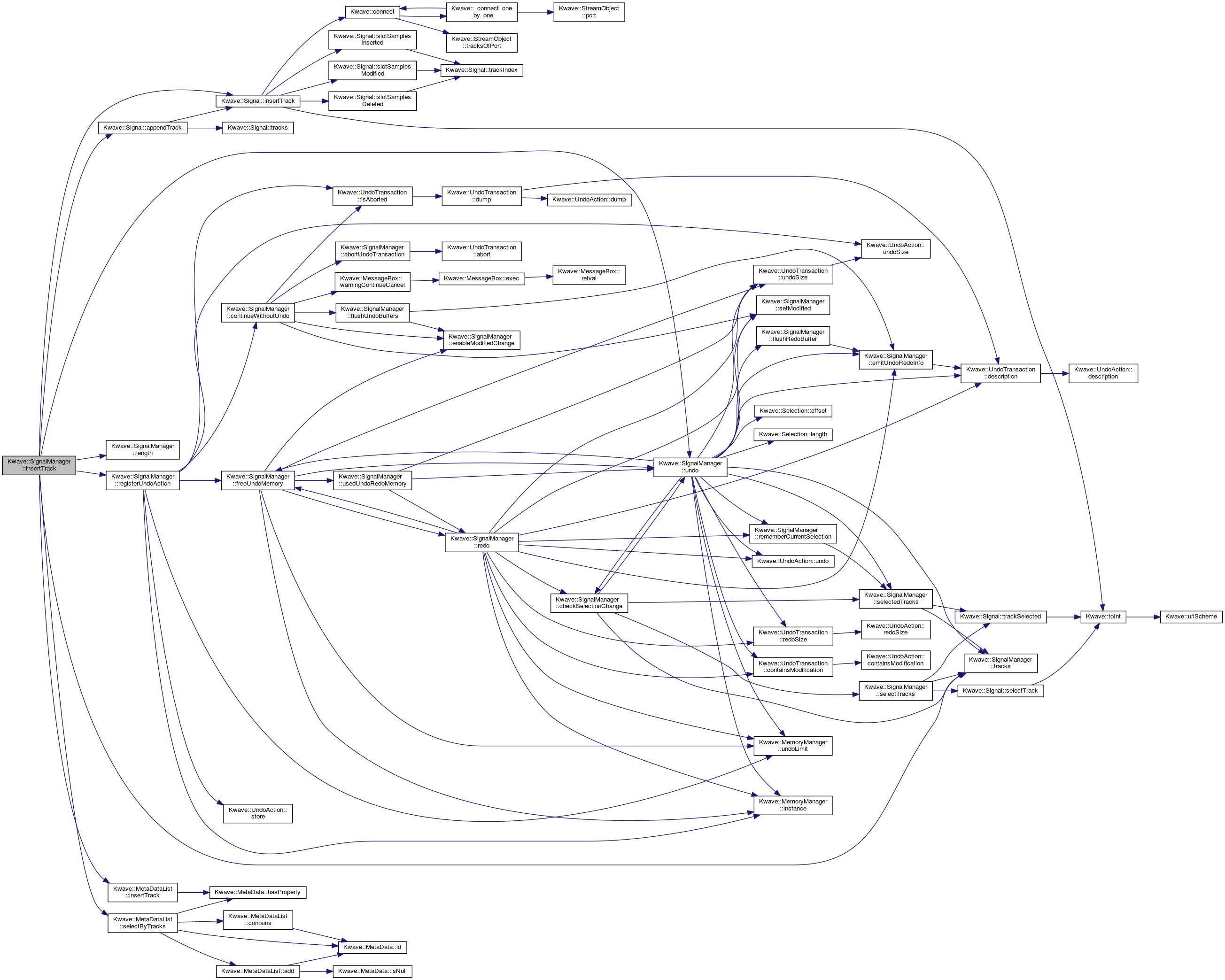

◆ isClosed()
|
inline |
Returns true if the signal is closed
Definition at line 98 of file SignalManager.h.
Referenced by Kwave::PlaybackController::openDevice(), signalName(), and Kwave::ZoomToolBar::updateToolbar().
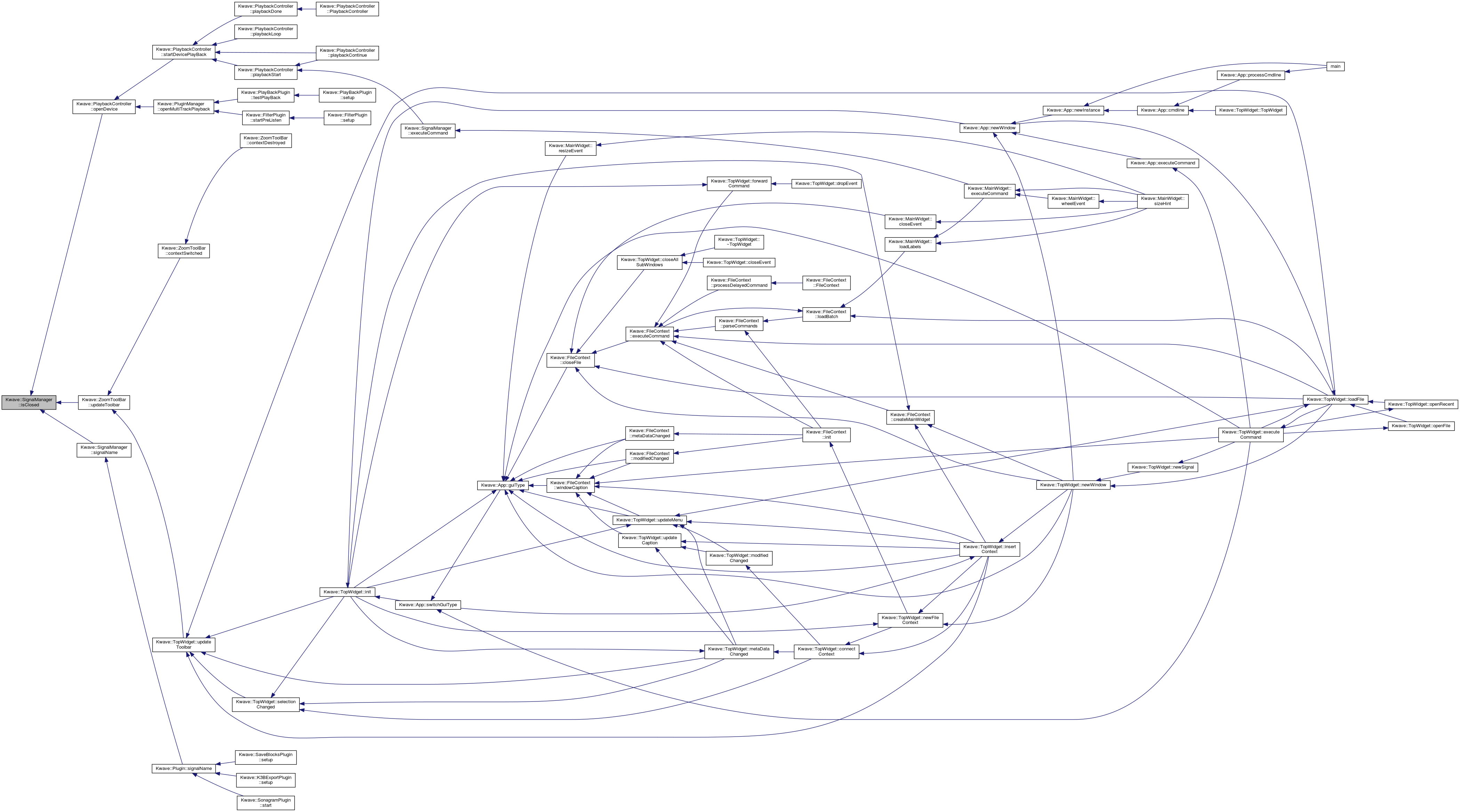
◆ isEmpty()
|
inline |
Returns true if the signal is empty.
Definition at line 101 of file SignalManager.h.
Referenced by Kwave::SignalWidget::contextMenuEvent(), Kwave::NoisePlugin::createDialog(), Kwave::MainWidget::dropEvent(), Kwave::MainWidget::fullZoom(), Kwave::TopWidget::newWindow(), Kwave::PlaybackController::openDevice(), Kwave::MainWidget::refreshHorizontalScrollBar(), Kwave::RecordPlugin::resetRecording(), Kwave::VolumePlugin::setup(), and Kwave::MainWidget::updateViewRange().
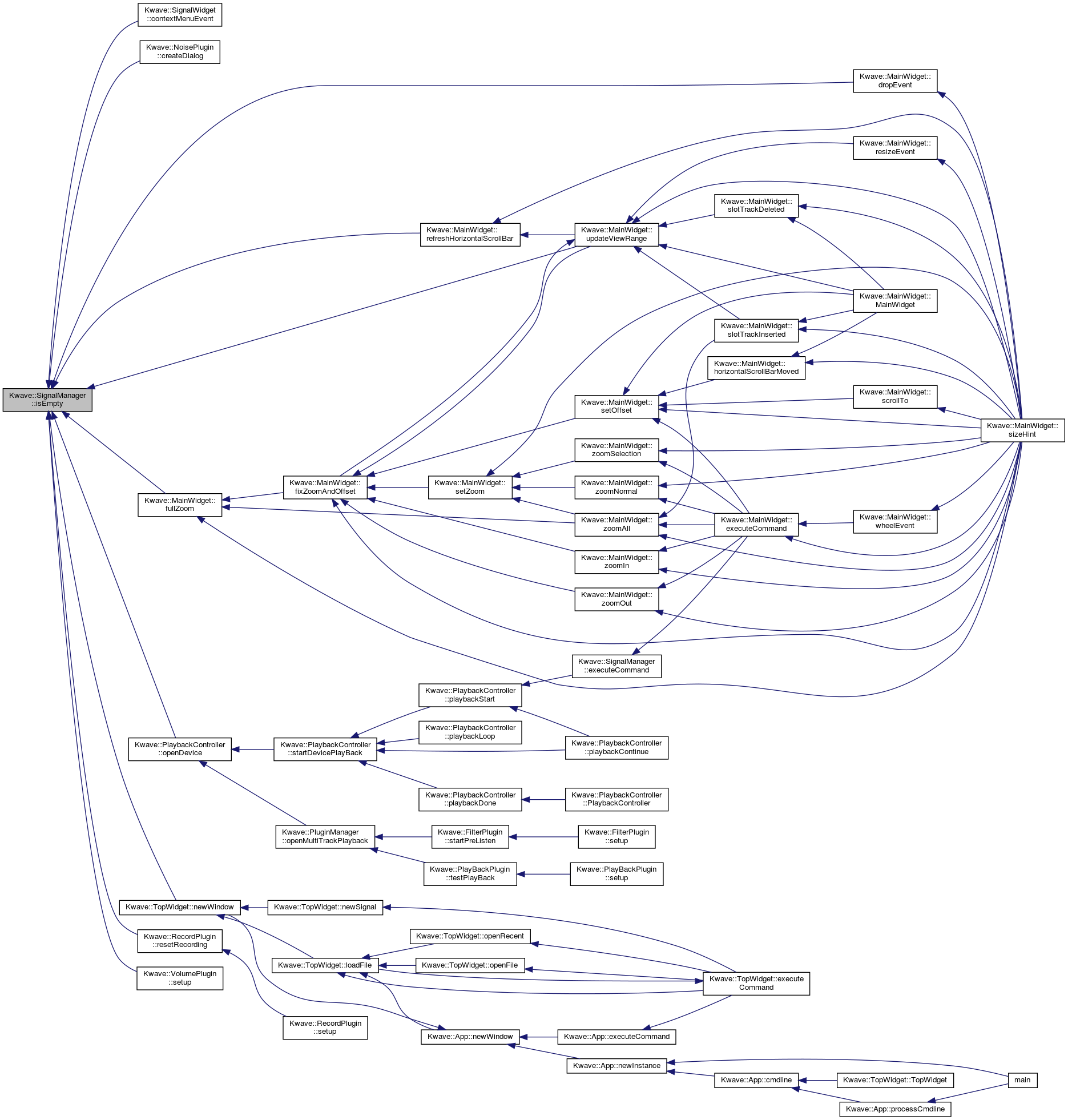
◆ isModified()
|
inline |
Returns true if the signal is modified
Definition at line 104 of file SignalManager.h.
Referenced by Kwave::UndoTransactionGuard::abort(), Kwave::MainWidget::addLabel(), and Kwave::TopWidget::updateMenu().
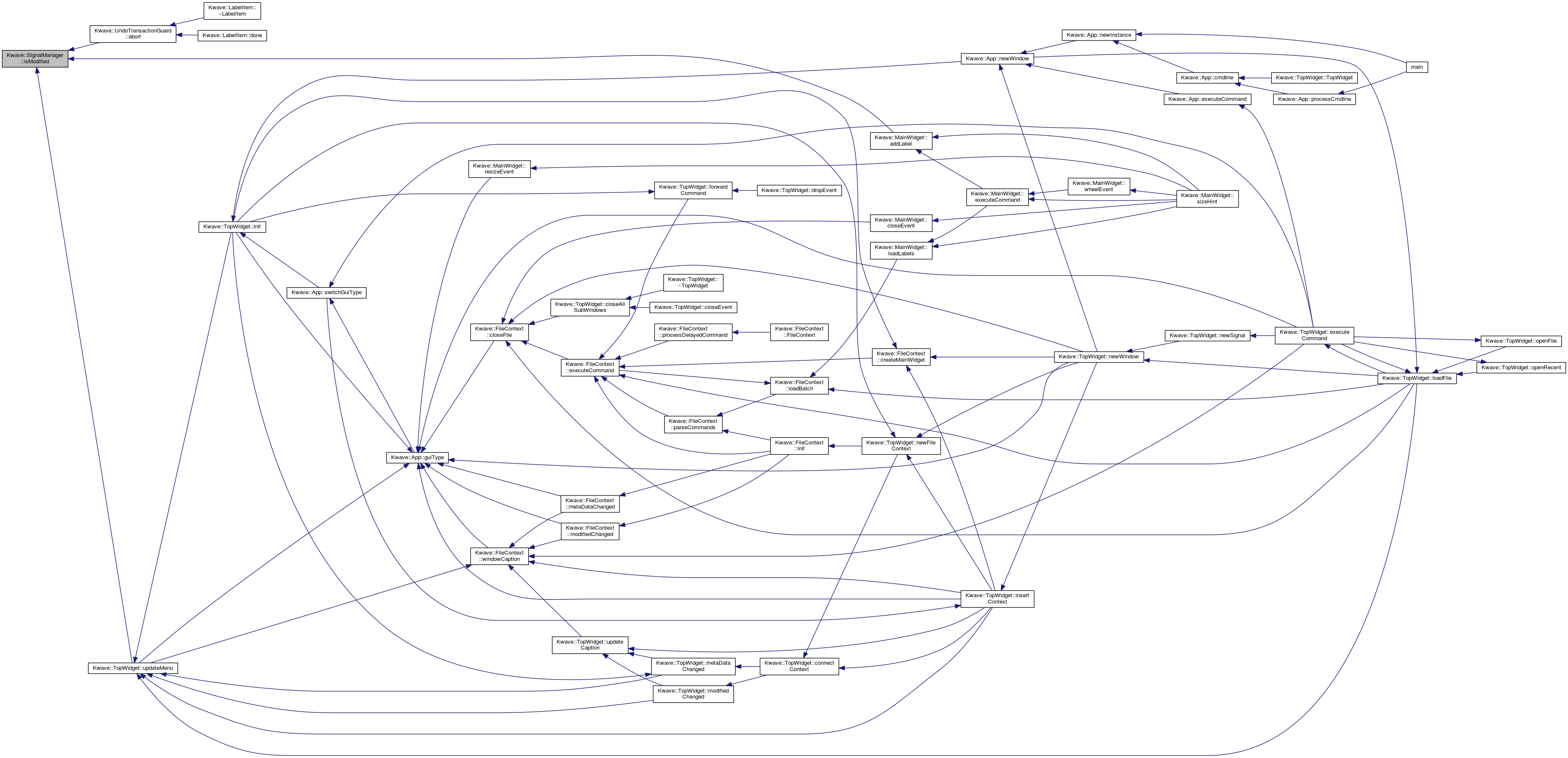
◆ labelIndex()
| int Kwave::SignalManager::labelIndex | ( | const Kwave::Label & | label | ) | const |
Returns the index of a label, counting from zero
- Parameters
-
label reference to a Label
- Returns
- index [0...N-1] or -1 if label is a null pointer or not found
Definition at line 1866 of file SignalManager.cpp.
References m_meta_data.
Referenced by Kwave::MainWidget::addLabel(), Kwave::MainWidget::labelProperties(), and Kwave::LabelItem::moveTo().

◆ length()
|
inline |
Returns the number of samples in the current signal. Will be zero if no signal is loaded.
Definition at line 142 of file SignalManager.h.
Referenced by executeCommand(), Kwave::MainWidget::executeCommand(), Kwave::MainWidget::fixZoomAndOffset(), Kwave::MainWidget::fullZoom(), Kwave::MainWidget::horizontalScrollBarMoved(), insertTrack(), Kwave::MainWidget::labelProperties(), loadFile(), Kwave::SignalView::mouseMoveEvent(), Kwave::SignalView::mousePressEvent(), Kwave::SignalView::mouseReleaseEvent(), Kwave::MultiTrackWriter::MultiTrackWriter(), newSignal(), Kwave::MainWidget::refreshHorizontalScrollBar(), save(), selectRange(), Kwave::PluginManager::signalLength(), Kwave::PlaybackController::startDevicePlayBack(), and Kwave::MainWidget::updateViewRange().
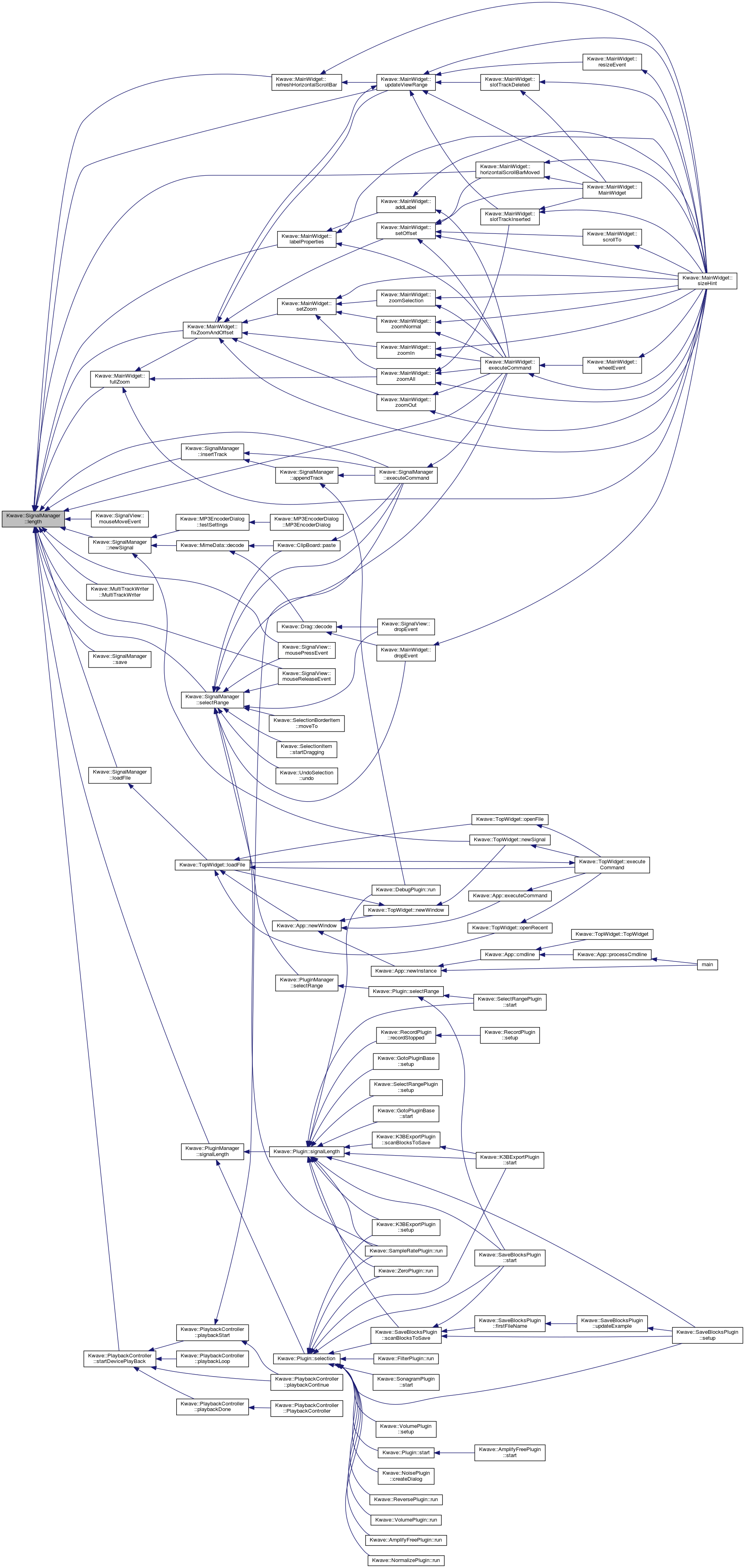
◆ loadFile()
| int Kwave::SignalManager::loadFile | ( | const QUrl & | url | ) |
Closes the current signal and loads a new file.
- Parameters
-
url URL of the file to be loaded
- Returns
- 0 if succeeded or error code < 0
Definition at line 122 of file SignalManager.cpp.
References allTracks(), Kwave::Append, Kwave::Signal::appendTrack(), Kwave::FileInfo::bits(), Kwave::Signal::close(), close(), Kwave::connect(), Kwave::FileInfo::contains(), DBG, Kwave::CodecManager::decoder(), disableUndo(), Kwave::MetaDataList::dump(), enableModifiedChange(), enableUndo(), Kwave::MultiWriter::flush(), Kwave::INF_ESTIMATED_LENGTH, Kwave::INF_FILENAME, Kwave::INF_FILESIZE, Kwave::INF_MIMETYPE, Kwave::MultiWriter::last(), Kwave::Track::length(), length(), Kwave::FileInfo::length(), m_closed, m_empty, m_last_length, m_meta_data, m_parent_widget, m_signal, Kwave::CodecManager::mimeTypeOf(), Kwave::Overwrite, Kwave::FileInfo::rate(), rememberCurrentSelection(), Kwave::MetaDataList::replace(), Kwave::FileInfo::set(), Kwave::FileProgress::setBytePosition(), Kwave::FileProgress::setLength(), Kwave::FileInfo::setLength(), setModified(), Kwave::FileInfo::setTracks(), sigMetaDataChanged(), tracks(), and Kwave::FileInfo::tracks().
Referenced by Kwave::TopWidget::loadFile().
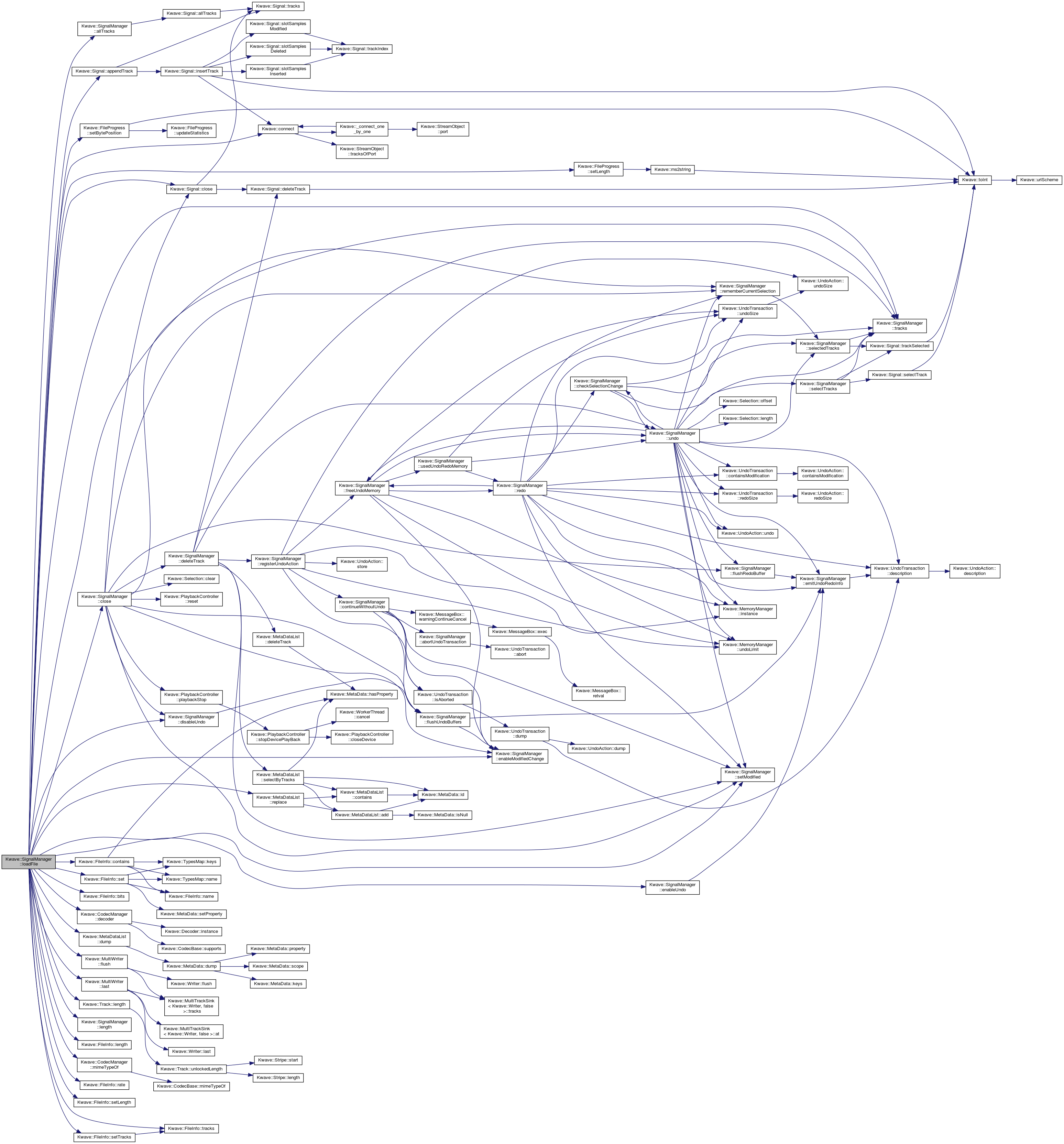

◆ mergeMetaData()
| void Kwave::SignalManager::mergeMetaData | ( | const Kwave::MetaDataList & | meta_data | ) |
Merges a list of meta data items
- Parameters
-
meta_data the meta data to merge
Definition at line 1992 of file SignalManager.cpp.
References m_meta_data, Kwave::MetaDataList::merge(), and sigMetaDataChanged().
Referenced by Kwave::UndoModifyMetaDataAction::undo().
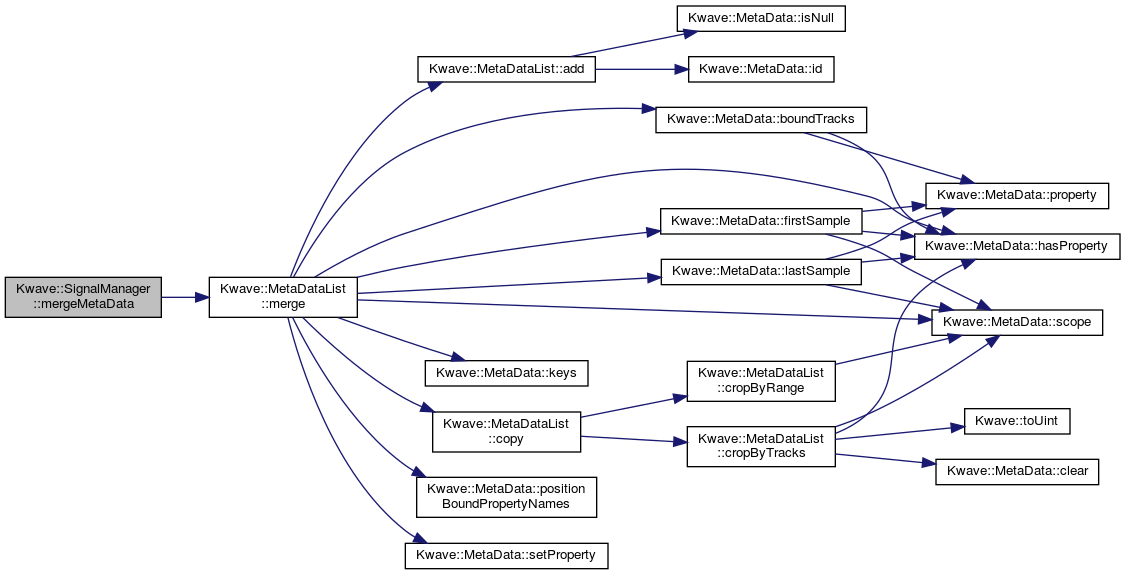

◆ mergeStripes()
| bool Kwave::SignalManager::mergeStripes | ( | const QList< Kwave::Stripe::List > & | stripes, |
| const QList< unsigned int > & | track_list | ||
| ) |
Merge a list of stripes into the signal.
- Note
- this operation works without undo!
- Parameters
-
stripes list of stripe list (multi track) track_list list with indices of tracks for selecting
- Returns
- true if succeeded, false if failed
Definition at line 1192 of file SignalManager.cpp.
References m_signal, and Kwave::Signal::mergeStripes().
Referenced by Kwave::UndoDeleteTrack::undo(), Kwave::UndoModifyAction::undo(), and Kwave::UndoDeleteAction::undo().


◆ metaData() [1/2]
|
inline |
Retrieves the list of meta data objects, mutable
- Returns
- list with all MetaData objects
Definition at line 388 of file SignalManager.h.
Referenced by Kwave::SignalWidget::contextMenuEvent(), Kwave::ClipBoard::copy(), Kwave::MimeData::decode(), Kwave::MainWidget::executeCommand(), Kwave::TrackView::findItem(), Kwave::MainWidget::fullZoom(), Kwave::MainWidget::MainWidget(), Kwave::TrackView::paintEvent(), Kwave::SampleRatePlugin::run(), Kwave::DebugPlugin::run(), Kwave::K3BExportPlugin::saveBlocks(), Kwave::MainWidget::saveLabels(), Kwave::SaveBlocksPlugin::start(), Kwave::SelectionItem::startDragging(), Kwave::UndoDeleteAction::store(), Kwave::MP3EncoderDialog::testSettings(), Kwave::UndoModifyMetaDataAction::undo(), Kwave::UndoDeleteMetaDataAction::undo(), Kwave::UndoAddMetaDataAction::undo(), Kwave::UndoDeleteAction::undo(), and Kwave::TopWidget::updateMenu().
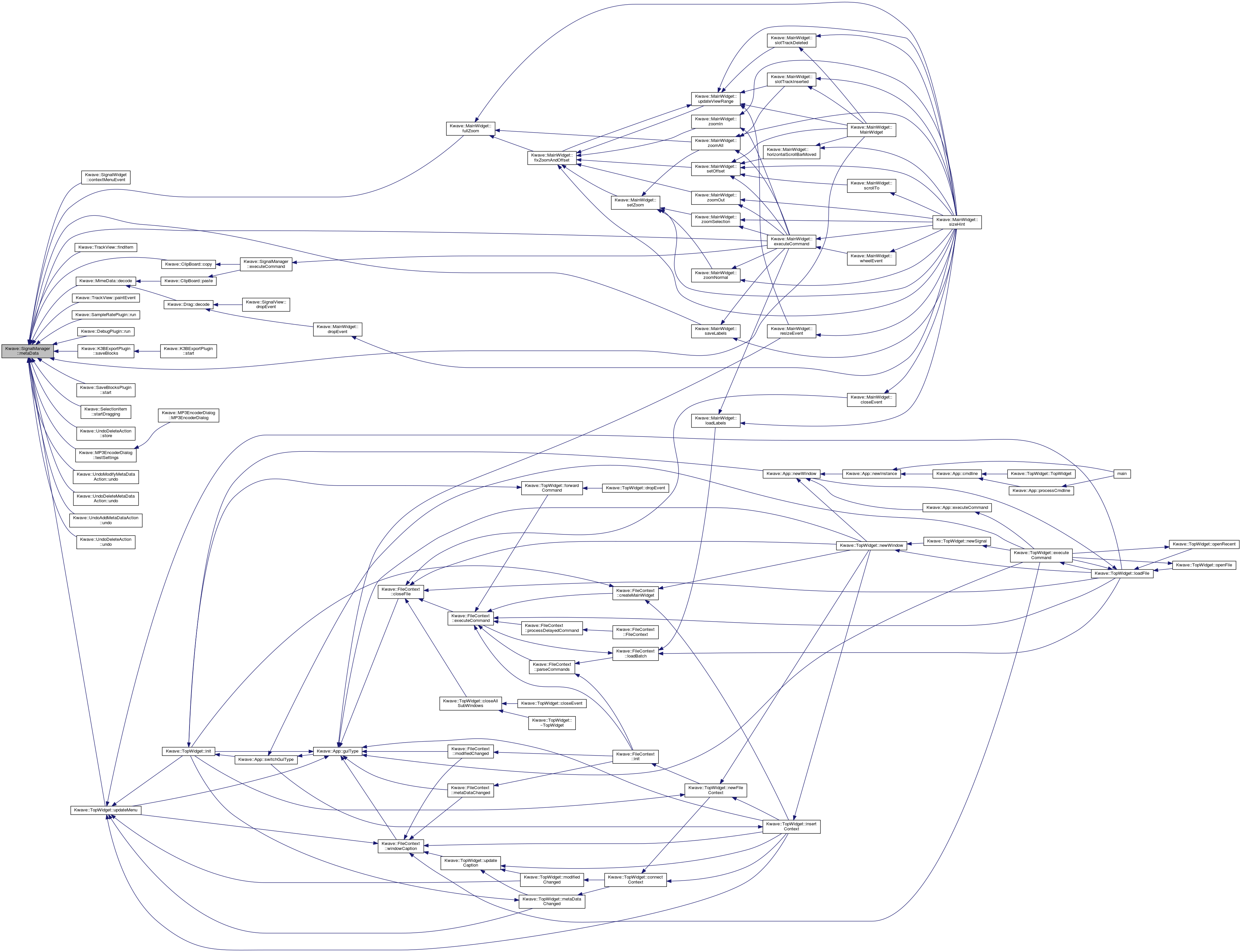
◆ metaData() [2/2]
|
inline |
Retrieves the list of meta data objects, const
- Returns
- reference to the list of all MetaData objects
Definition at line 394 of file SignalManager.h.
◆ modifyLabel()
| bool Kwave::SignalManager::modifyLabel | ( | int | index, |
| sample_index_t | pos, | ||
| const QString & | name, | ||
| bool | with_undo | ||
| ) |
modify an existing label at a given index (always without undo)
- Parameters
-
index the index of the label [0...N-1] pos position of the label [samples] name the name of the label with_undo if true, create undo info
- Returns
- true if succeeded, false if the index is out of range or if the new position is already occupied by an existing label
Definition at line 1955 of file SignalManager.cpp.
References Kwave::MetaDataList::add(), findLabel(), Kwave::MetaData::isNull(), m_meta_data, m_undo_enabled, Kwave::Label::moveTo(), Kwave::Label::pos(), registerUndoAction(), Kwave::Label::rename(), setModified(), sigMetaDataChanged(), and Kwave::toInt().
Referenced by Kwave::MainWidget::labelProperties(), and Kwave::LabelItem::moveTo().
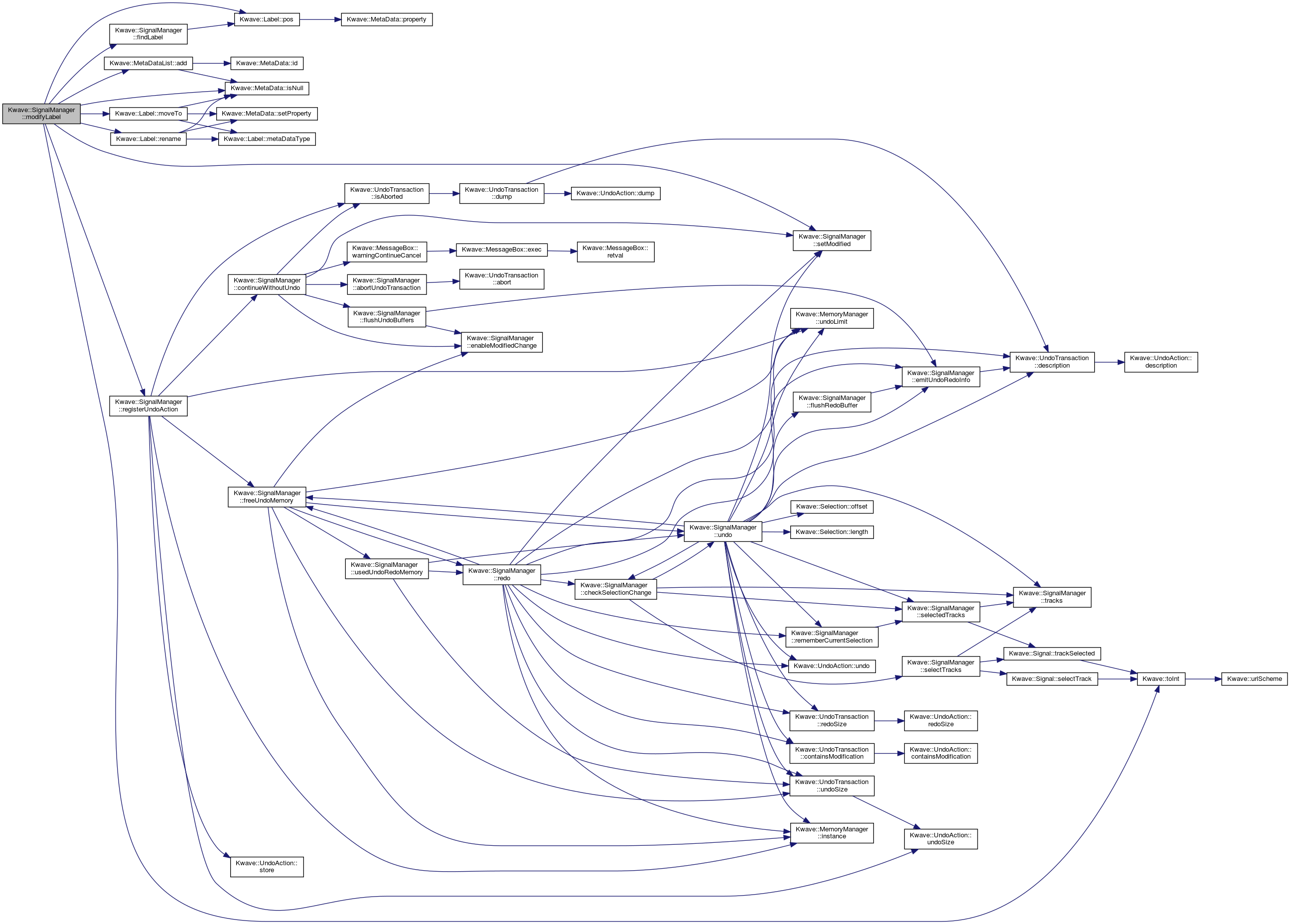

◆ newSignal()
| void Kwave::SignalManager::newSignal | ( | sample_index_t | samples, |
| double | rate, | ||
| unsigned int | bits, | ||
| unsigned int | tracks | ||
| ) |
Closes the current signal and creates a new empty signal.
- Parameters
-
samples number of samples per track rate sample rate bits number of bits per sample tracks number of tracks
Definition at line 492 of file SignalManager.cpp.
References Kwave::Signal::appendTrack(), disableUndo(), enableModifiedChange(), enableUndo(), length(), m_closed, m_empty, m_last_length, m_meta_data, m_signal, rememberCurrentSelection(), Kwave::MetaDataList::replace(), Kwave::FileInfo::setBits(), Kwave::FileInfo::setLength(), setModified(), Kwave::FileInfo::setRate(), Kwave::FileInfo::setTracks(), and sigMetaDataChanged().
Referenced by Kwave::MimeData::decode(), Kwave::TopWidget::newSignal(), and Kwave::MP3EncoderDialog::testSettings().
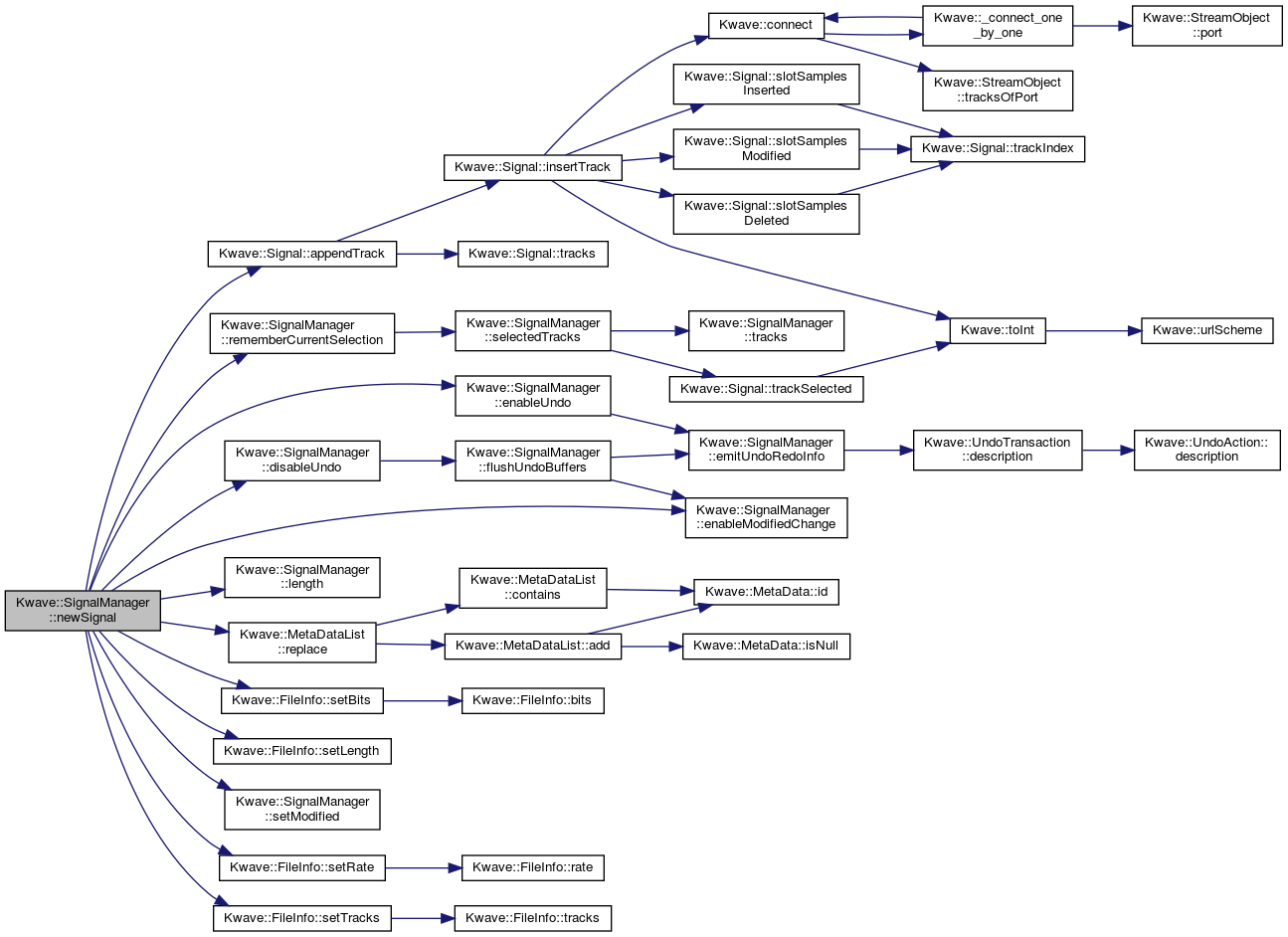

◆ openReader()
|
inline |
Opens a stream for reading samples. If the last position is omitted, the value UINT_MAX will be used.
- Parameters
-
mode a reader mode, see SampleReader::Mode track index of the track. If the track does not exist, this function will fail and return 0 left first offset to be read (default = 0) right last position to read (default = UINT_MAX)
Definition at line 274 of file SignalManager.h.
References SAMPLE_INDEX_MAX.
Referenced by Kwave::MultiTrackReader::MultiTrackReader().

◆ openWriter()
|
inline |
Opens an output stream for a track, starting at a specified sample position.
- Parameters
-
mode specifies where and how to insert track index of the track. If the track does not exist, this function will fail and return 0 left start of the input (only useful in insert and overwrite mode) right end of the input (only useful with overwrite mode)
- See also
- InsertMode
Definition at line 258 of file SignalManager.h.
Referenced by Kwave::MultiTrackWriter::init(), and Kwave::ReversePlugin::reverseSlice().

◆ parentWidget()
|
inlineprotected |
returns the associated parent widget, to be used for messages
Definition at line 662 of file SignalManager.h.
Referenced by Kwave::MultiTrackWriter::init(), and Kwave::PlaybackController::openDevice().

◆ playbackController()
| Kwave::PlaybackController & Kwave::SignalManager::playbackController | ( | ) |
Returns a reference to the playback controller.
Definition at line 1213 of file SignalManager.cpp.
References m_playback_controller.
Referenced by Kwave::PlayerToolBar::contextSwitched(), Kwave::MainWidget::MainWidget(), Kwave::SignalView::mousePressEvent(), Kwave::SignalView::mouseReleaseEvent(), Kwave::PluginManager::openMultiTrackPlayback(), Kwave::PluginManager::playbackController(), Kwave::PlayBackPlugin::setup(), and Kwave::TrackView::TrackView().
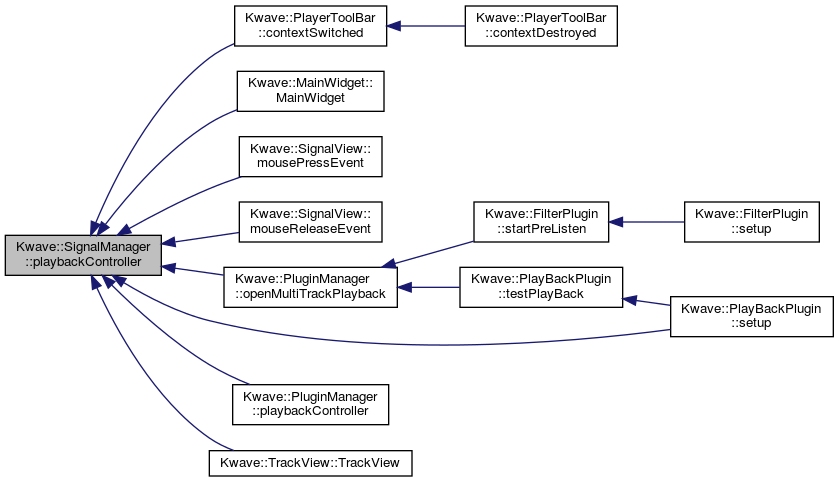
◆ rate()
|
inline |
Returns the current sample rate in samples per second
Definition at line 131 of file SignalManager.h.
References Kwave::FileInfo::rate().
Referenced by Kwave::MimeData::decode(), Kwave::MainWidget::fullZoom(), Kwave::MainWidget::labelProperties(), Kwave::MainWidget::ms2samples(), Kwave::PlaybackController::openDevice(), Kwave::SignalView::samples2ms(), save(), Kwave::TopWidget::selectionChanged(), Kwave::ZoomToolBar::selectZoom(), Kwave::ZoomToolBar::setZoomInfo(), Kwave::PluginManager::signalRate(), Kwave::PlaybackController::startDevicePlayBack(), Kwave::SelectionItem::startDragging(), and Kwave::RecordPlugin::startRecording().

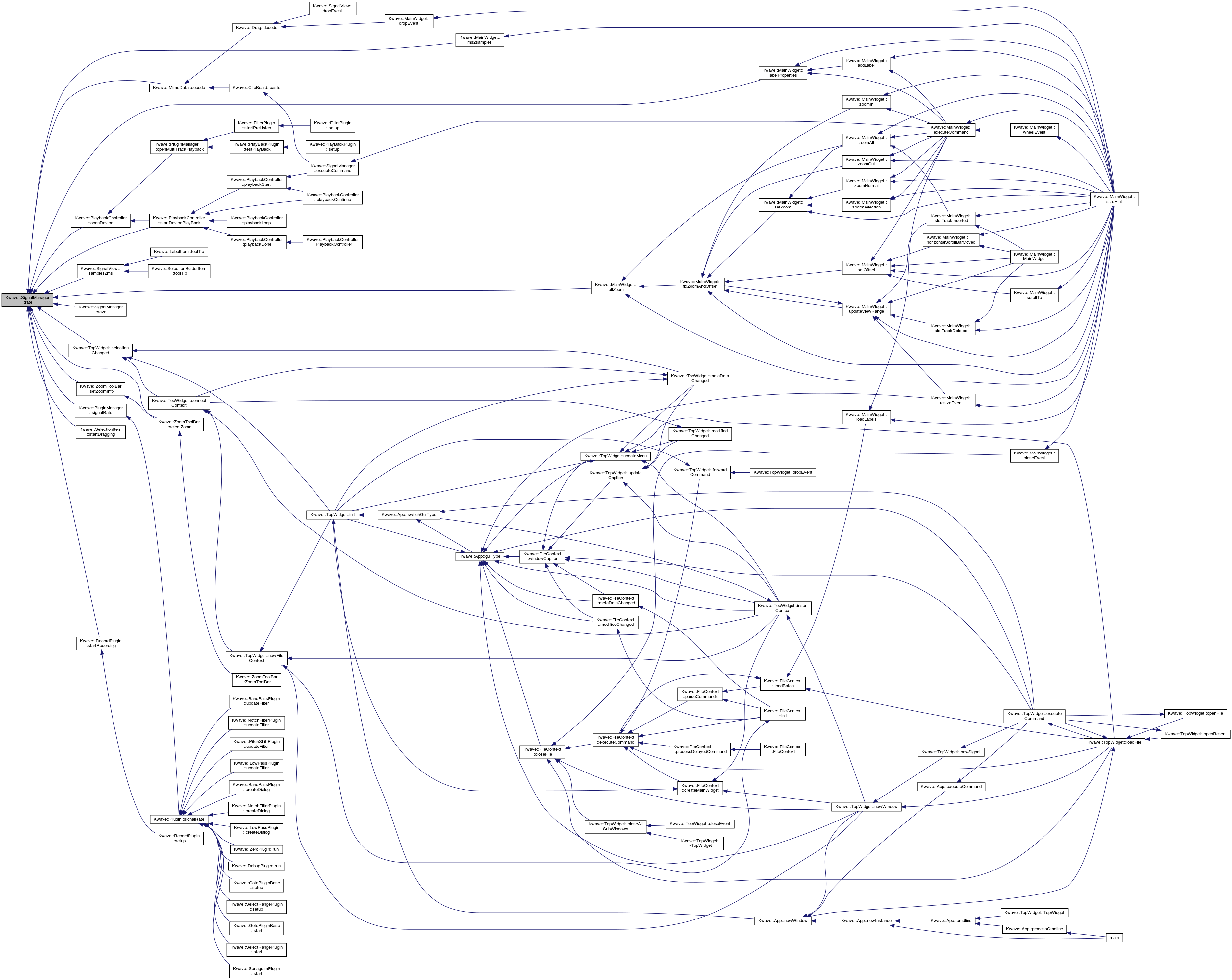
◆ redo
|
slot |
re-does the last undone action.
Definition at line 1707 of file SignalManager.cpp.
References checkSelectionChange(), Kwave::UndoTransaction::containsModification(), Kwave::UndoTransaction::description(), emitUndoRedoInfo(), freeUndoMemory(), Kwave::MemoryManager::instance(), m_meta_data, m_redo_buffer, m_undo_buffer, m_undo_enabled, m_undo_transaction_lock, name, Kwave::UndoTransaction::redoSize(), rememberCurrentSelection(), setModified(), sigMetaDataChanged(), Kwave::UndoAction::undo(), Kwave::MemoryManager::undoLimit(), and Kwave::UndoTransaction::undoSize().
Referenced by executeCommand(), freeUndoMemory(), and usedUndoRedoMemory().
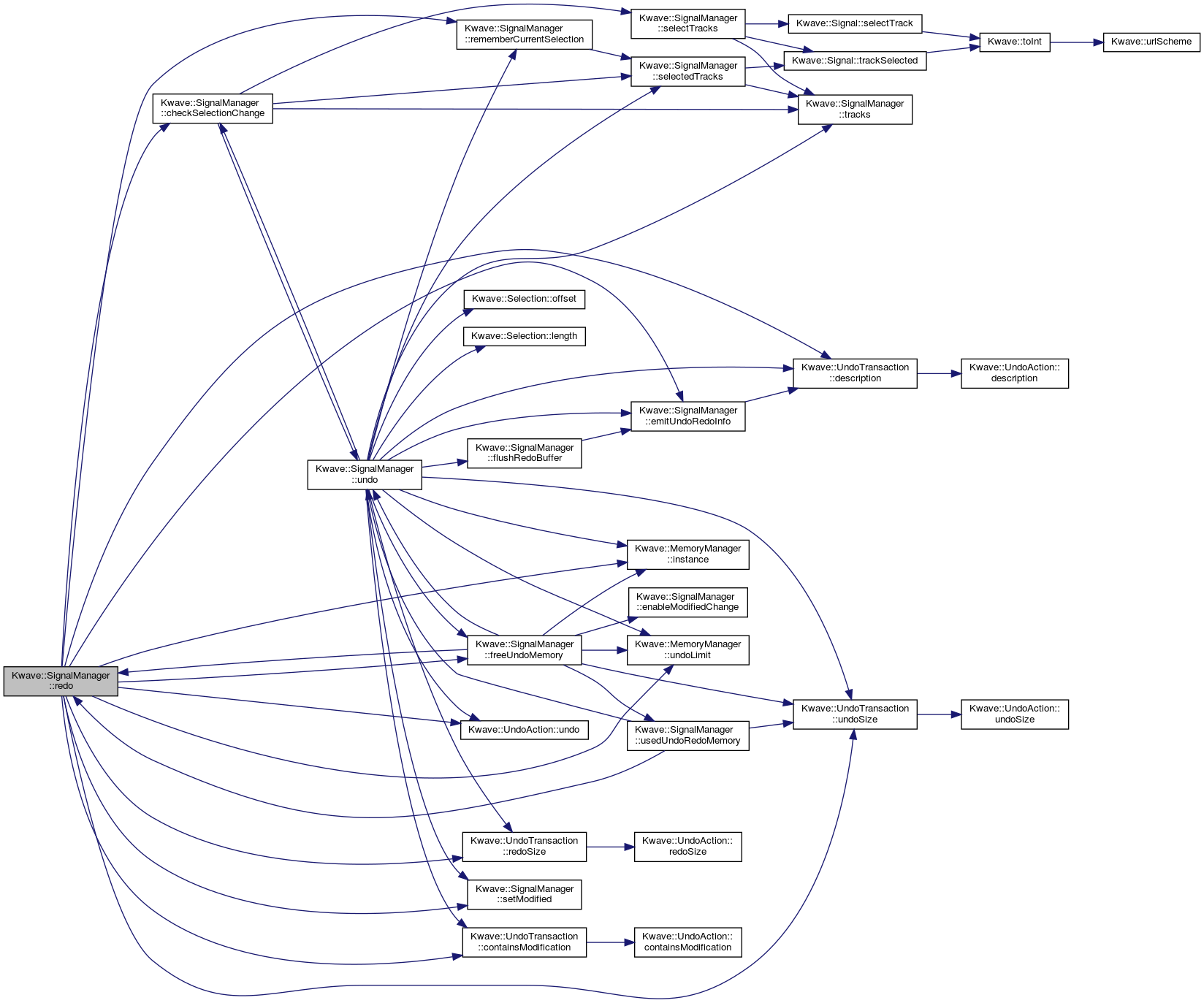
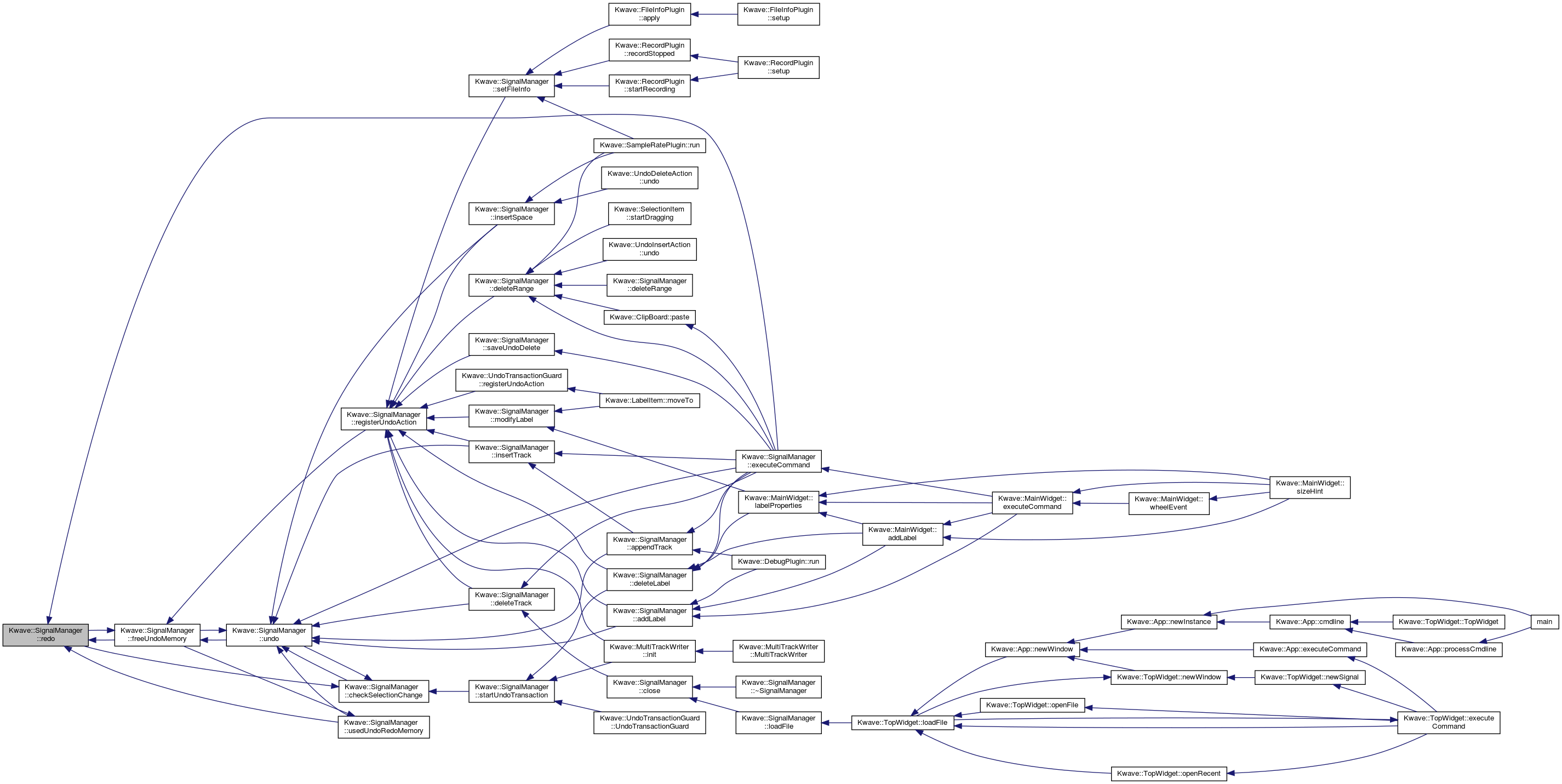
◆ registerUndoAction()
|
protected |
Tries to free memory for a new undo action and stores all needed data if successful.
- Parameters
-
action UndoAction to that is to be registered
- Returns
- true if the action is allowed, false if the user has chosen to abort the operation if the memory limit of the undo buffer would be exceeded. The return value will also be false if the action is null.
- Note
- If undo is currently not enabled, the passed UndoAction will be ignored and not freed, the return value will be false. So it is safer not to call this function if undo is not enabled.
Definition at line 1426 of file SignalManager.cpp.
References continueWithoutUndo(), freeUndoMemory(), Kwave::MemoryManager::instance(), Kwave::UndoTransaction::isAborted(), m_undo_enabled, m_undo_transaction, m_undo_transaction_lock, Kwave::UndoAction::store(), Kwave::MemoryManager::undoLimit(), and Kwave::UndoAction::undoSize().
Referenced by addLabel(), deleteLabel(), deleteRange(), deleteTrack(), Kwave::MultiTrackWriter::init(), insertSpace(), insertTrack(), modifyLabel(), Kwave::UndoTransactionGuard::registerUndoAction(), saveUndoDelete(), and setFileInfo().
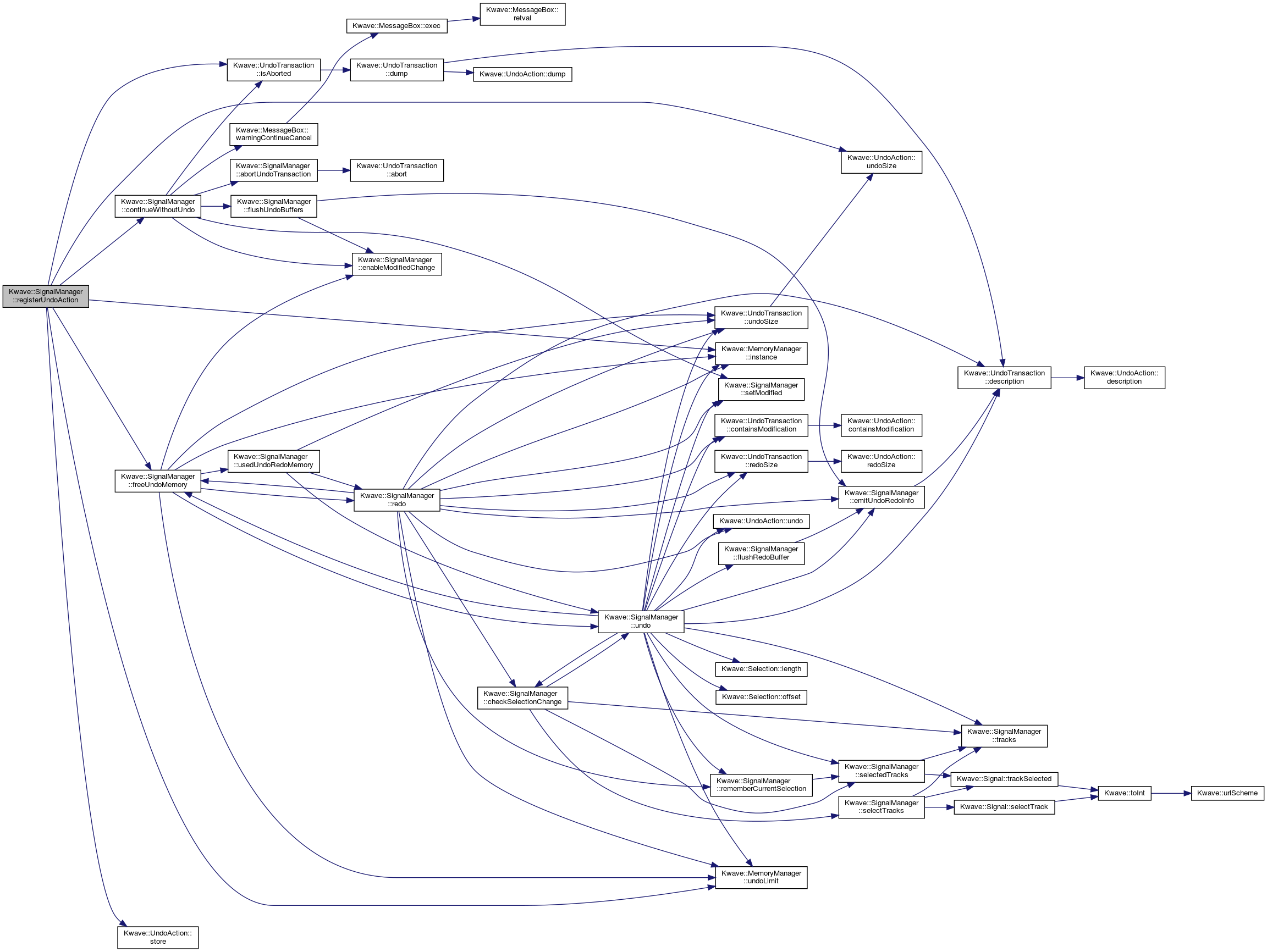
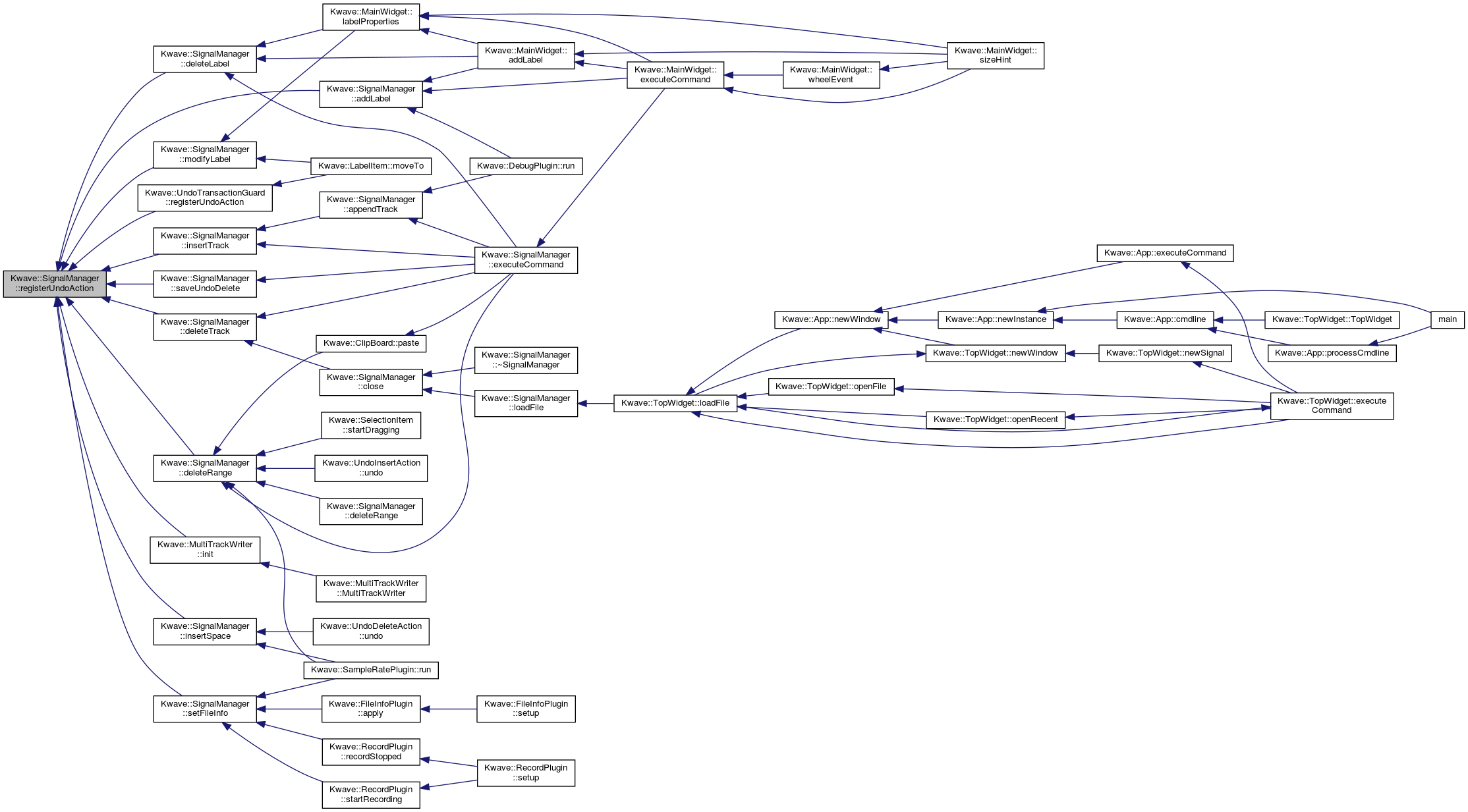
◆ rememberCurrentSelection()
|
private |
saves the current sample and track selection
Definition at line 1999 of file SignalManager.cpp.
References m_last_selection, m_last_track_selection, m_selection, and selectedTracks().
Referenced by close(), closeUndoTransaction(), executeCommand(), loadFile(), newSignal(), redo(), and undo().

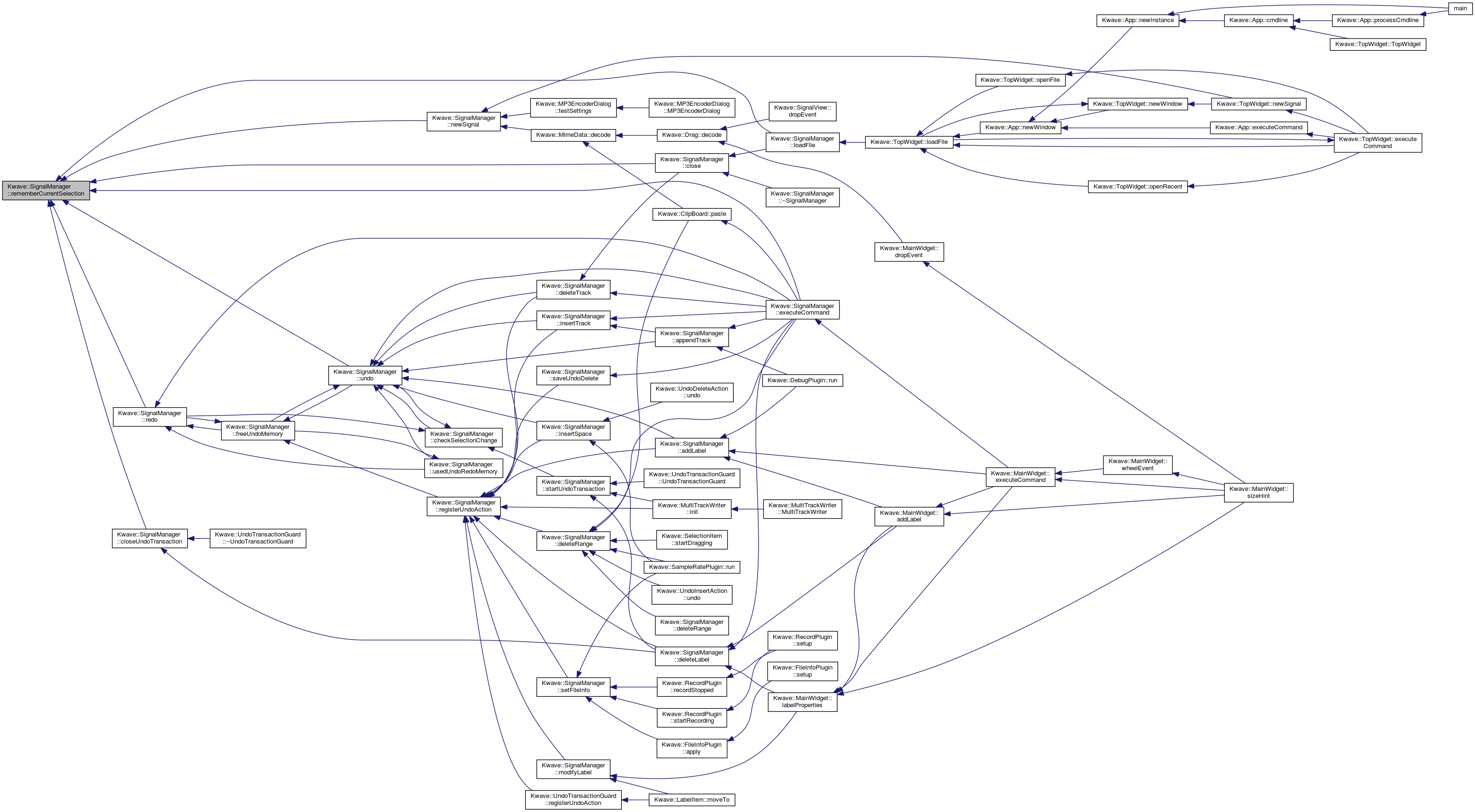
◆ save()
| int Kwave::SignalManager::save | ( | const QUrl & | url, |
| bool | selection | ||
| ) |
Saves the signal to a file with a given resolution. If the file already exists, it will be overwritten.
- Parameters
-
url URL with the name of the file to be saved. selection if true, only the selected range will be saved
- Returns
- zero if succeeded or negative error code
Definition at line 312 of file SignalManager.cpp.
References _, allTracks(), bits(), Kwave::FileInfo::bits(), Kwave::connect(), Kwave::FileInfo::contains(), Kwave::MetaDataList::cropByRange(), Kwave::MetaDataList::cropByTracks(), DBG, enableModifiedChange(), Kwave::CodecManager::encoder(), Kwave::MessageBox::error(), flushUndoBuffers(), Kwave::INF_CREATION_DATE, Kwave::INF_FILENAME, Kwave::INF_MIMETYPE, Kwave::INF_SOFTWARE, Kwave::FileProgress::isCanceled(), Kwave::Selection::length(), length(), Kwave::FileInfo::length(), m_meta_data, m_parent_widget, m_selection, Kwave::CodecManager::mimeTypeOf(), Kwave::FileInfo::name(), Kwave::Selection::offset(), Kwave::FileInfo::properties(), rate(), Kwave::FileInfo::rate(), Kwave::MetaDataList::replace(), selectedTracks(), selection(), Kwave::FileInfo::set(), Kwave::FileInfo::setBits(), Kwave::FileInfo::setLength(), setModified(), Kwave::FileInfo::setRate(), Kwave::FileInfo::setTracks(), sigMetaDataChanged(), Kwave::SinglePassForward, tracks(), Kwave::FileInfo::tracks(), UTF8, and Kwave::MessageBox::warningContinueCancel().
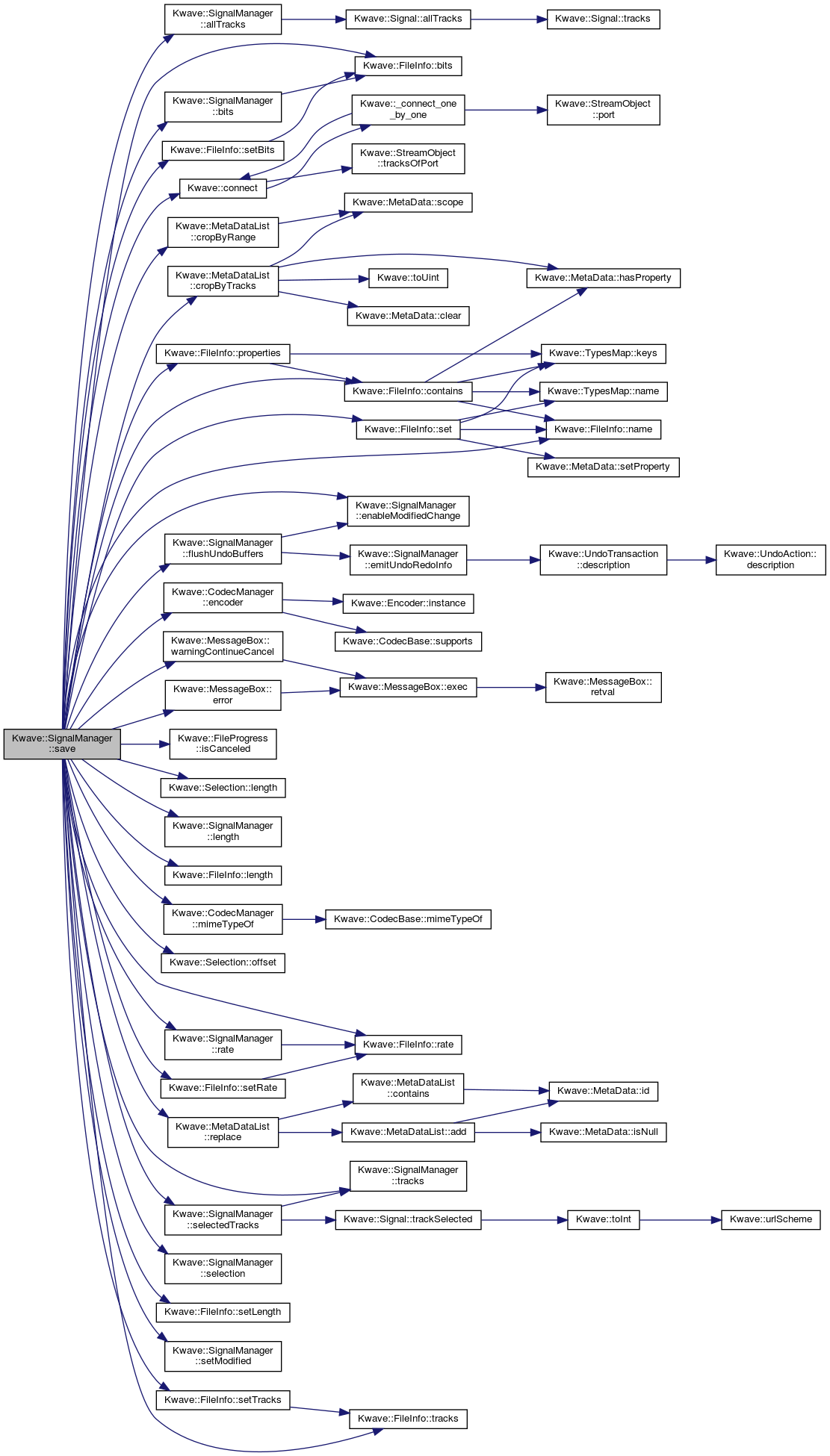
◆ saveUndoDelete()
|
protected |
Saves undo data for deleting a range of samples from a list of tracks.
- Parameters
-
track_list list of indices of tracks offset first sample position to delete length number of samples to delete
- Returns
- true if successful, false if out of memory or aborted
Definition at line 1473 of file SignalManager.cpp.
References m_parent_widget, m_undo_enabled, and registerUndoAction().
Referenced by executeCommand().
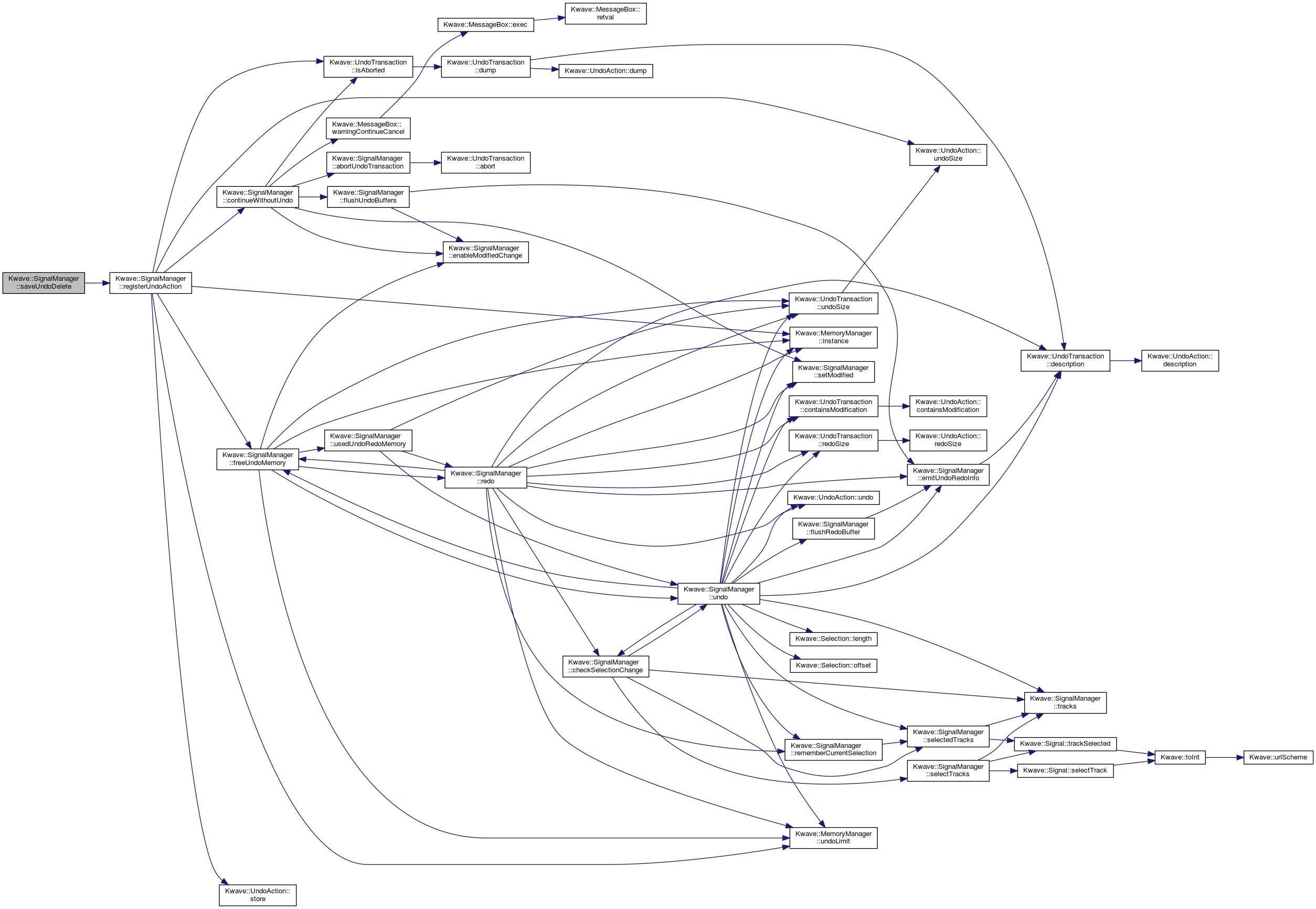

◆ selectedTracks()
| const QList< unsigned int > Kwave::SignalManager::selectedTracks | ( | ) |
Returns an array of indices of currently selected tracks.
Definition at line 587 of file SignalManager.cpp.
References m_signal, tracks(), and Kwave::Signal::trackSelected().
Referenced by checkSelectionChange(), Kwave::MimeData::decode(), deleteRange(), executeCommand(), Kwave::MultiTrackWriter::MultiTrackWriter(), Kwave::PlaybackController::openDevice(), Kwave::UndoSelection::redoSize(), rememberCurrentSelection(), Kwave::DebugPlugin::run(), Kwave::PlaybackController::run_wrapper(), save(), Kwave::Plugin::selectedTracks(), Kwave::Plugin::selection(), slotSamplesDeleted(), slotSamplesInserted(), Kwave::SelectionItem::startDragging(), Kwave::UndoSelection::store(), Kwave::UndoSelection::undo(), and undo().

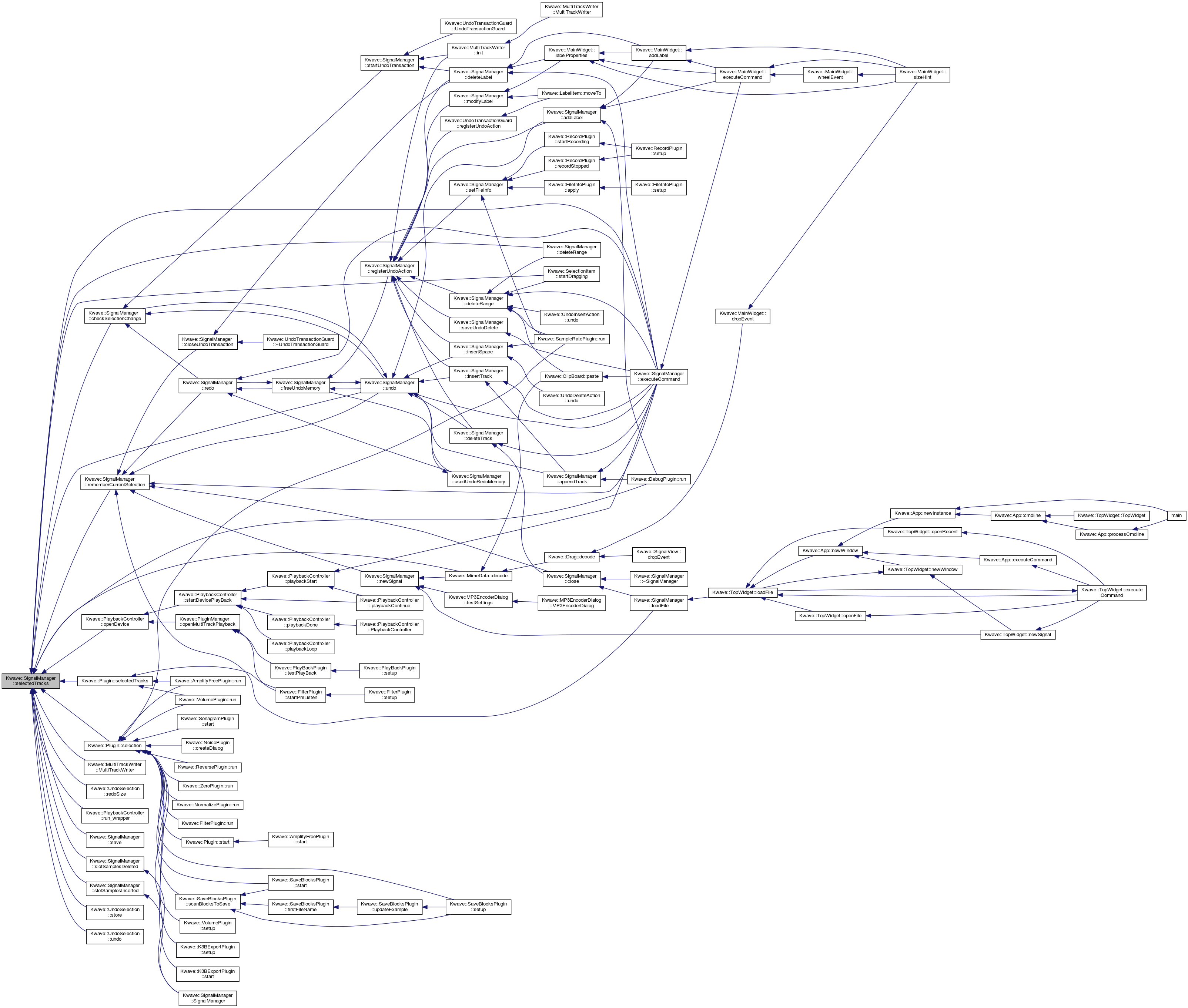
◆ selection()
|
inline |
Returns a reference to the current selection
Definition at line 145 of file SignalManager.h.
Referenced by Kwave::SignalWidget::contextMenuEvent(), Kwave::SignalView::dragMoveEvent(), executeCommand(), Kwave::MainWidget::executeCommand(), Kwave::TrackView::findItem(), Kwave::SignalView::mousePressEvent(), Kwave::MultiTrackWriter::MultiTrackWriter(), Kwave::OverViewWidget::OverViewWidget(), Kwave::TrackView::paintEvent(), save(), Kwave::SelectionBorderItem::SelectionBorderItem(), Kwave::PluginManager::selectionEnd(), Kwave::SignalView::selectionPosition(), Kwave::PluginManager::selectionStart(), Kwave::PlaybackController::startDevicePlayBack(), Kwave::SelectionItem::startDragging(), startUndoTransaction(), Kwave::UndoSelection::store(), Kwave::TrackView::TrackView(), Kwave::UndoSelection::undo(), Kwave::ZoomToolBar::updateToolbar(), Kwave::TopWidget::updateToolbar(), and Kwave::MainWidget::zoomSelection().
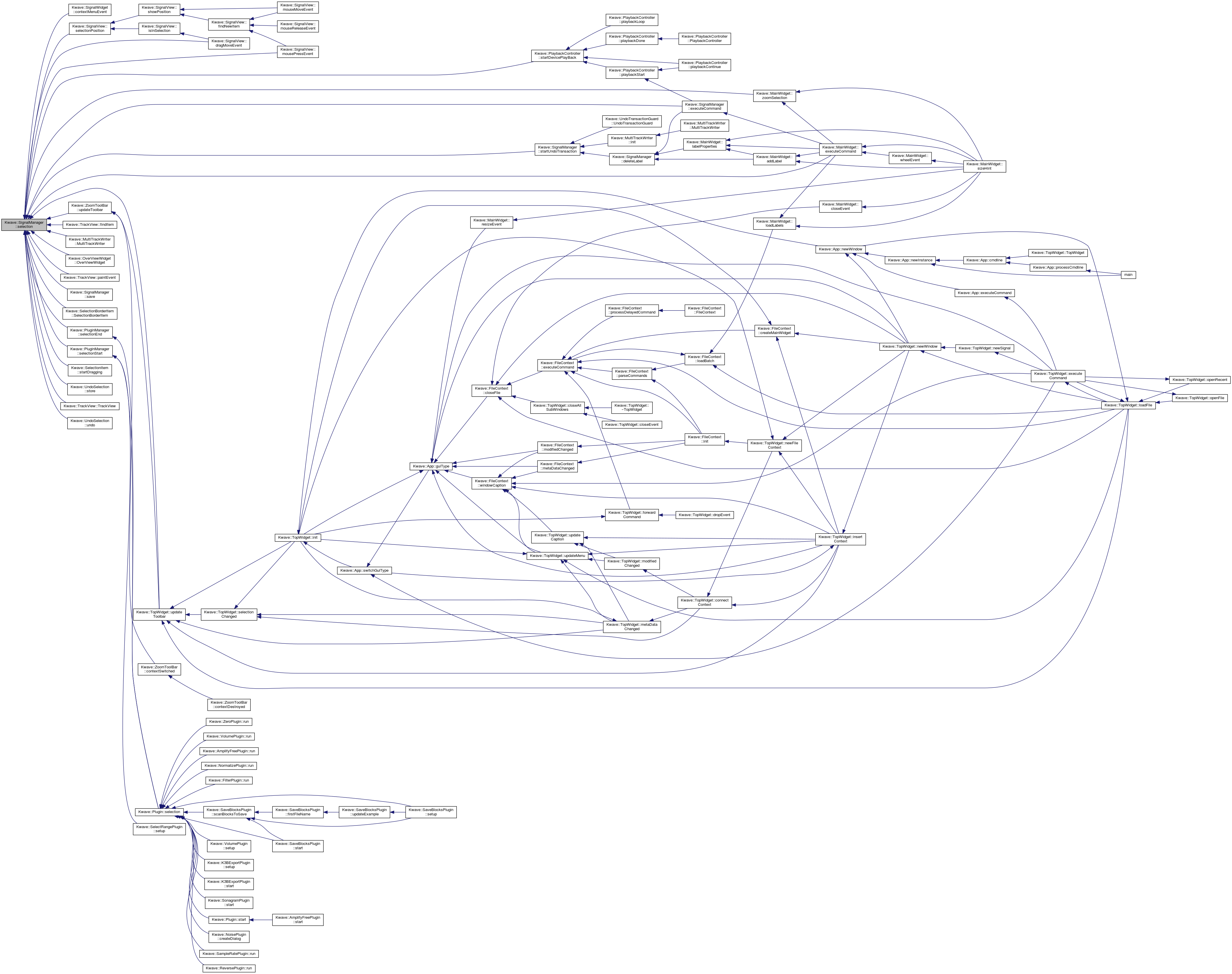
◆ selectRange()
| void Kwave::SignalManager::selectRange | ( | sample_index_t | offset, |
| sample_index_t | length | ||
| ) |
Sets the current start and length of the selection to new values.
- Parameters
-
offset index of the first sample length number of samples
Definition at line 1136 of file SignalManager.cpp.
References length(), m_selection, and Kwave::Selection::select().
Referenced by Kwave::MainWidget::dropEvent(), Kwave::SignalView::dropEvent(), executeCommand(), Kwave::MainWidget::executeCommand(), Kwave::SignalView::mousePressEvent(), Kwave::SignalView::mouseReleaseEvent(), Kwave::SelectionBorderItem::moveTo(), Kwave::ClipBoard::paste(), Kwave::SampleRatePlugin::run(), Kwave::PluginManager::selectRange(), Kwave::SelectionItem::startDragging(), and Kwave::UndoSelection::undo().

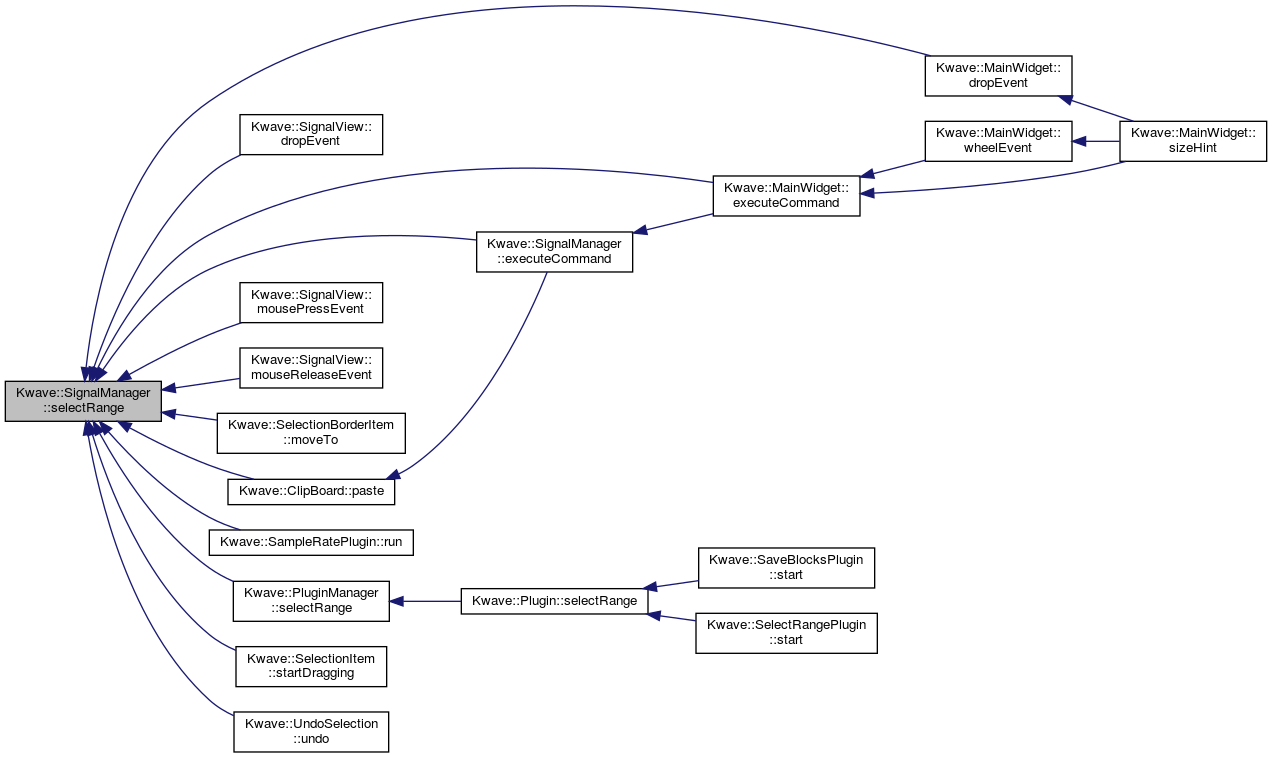
◆ selectTrack()
| void Kwave::SignalManager::selectTrack | ( | unsigned int | track, |
| bool | select | ||
| ) |
Sets the selection flag of a track.
- Parameters
-
track index of the track [0..N-1] select if true, the track will be enabled, if false it will be disabled
Definition at line 1164 of file SignalManager.cpp.
References m_signal, Kwave::Signal::selectTrack(), and Kwave::Signal::trackSelected().
Referenced by executeCommand().


◆ selectTracks()
| void Kwave::SignalManager::selectTracks | ( | QList< unsigned int > & | track_list | ) |
Selects multiple tracks, all other tracks will be disabled.
- Parameters
-
track_list list od track indices
Definition at line 1150 of file SignalManager.cpp.
References m_signal, Kwave::Signal::selectTrack(), tracks(), and Kwave::Signal::trackSelected().
Referenced by checkSelectionChange(), and Kwave::UndoSelection::undo().

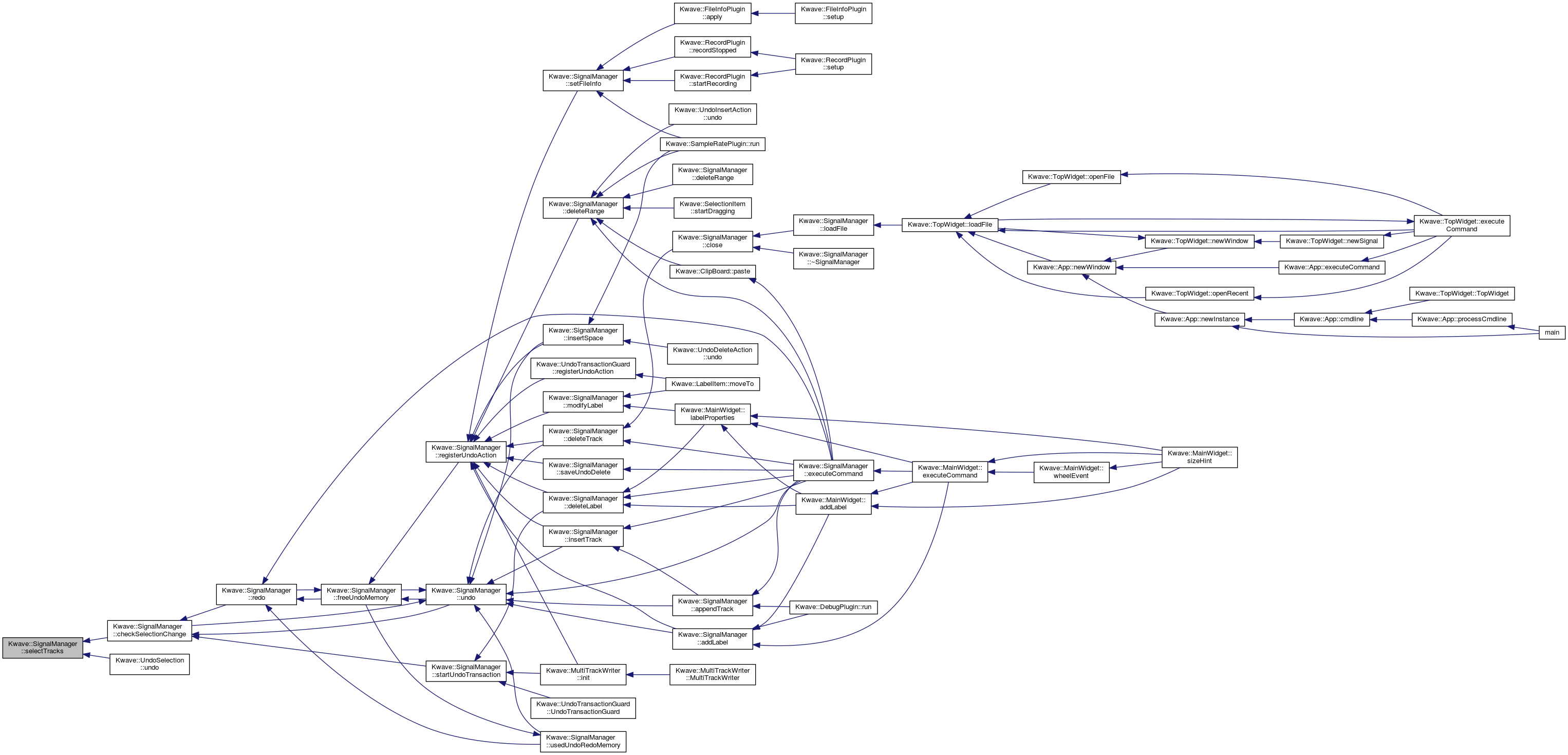
◆ setFileInfo()
| void Kwave::SignalManager::setFileInfo | ( | const Kwave::FileInfo & | new_info, |
| bool | with_undo | ||
| ) |
Sets a complete set of file info, including undo information
- Parameters
-
new_info a new FileInfo with_undo if true, store undo information
Definition at line 1835 of file SignalManager.cpp.
References emitUndoRedoInfo(), m_meta_data, m_undo_enabled, registerUndoAction(), Kwave::MetaDataList::replace(), setModified(), and sigMetaDataChanged().
Referenced by Kwave::FileInfoPlugin::apply(), Kwave::RecordPlugin::recordStopped(), Kwave::SampleRatePlugin::run(), and Kwave::RecordPlugin::startRecording().
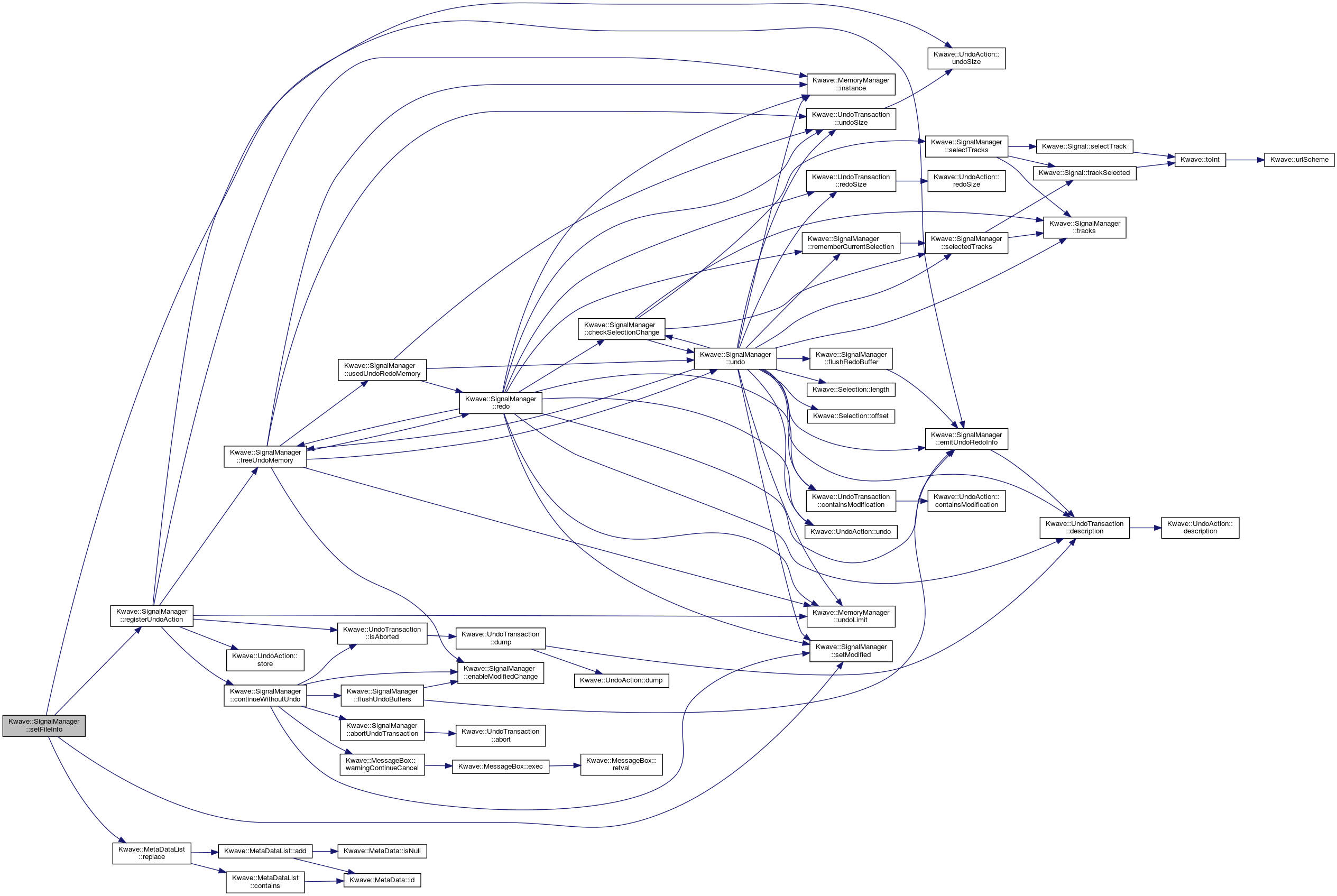
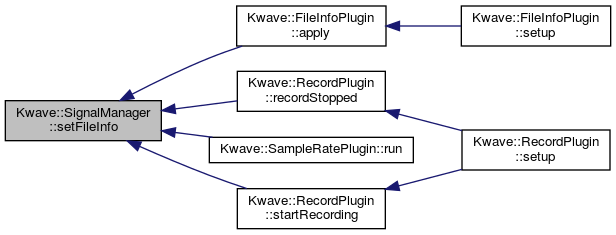
◆ setModified()
|
protected |
Sets the modified flag to a new value if m_modified_enabled is true, otherwise it will be ignored.
Definition at line 1817 of file SignalManager.cpp.
References m_modified, m_modified_enabled, and sigModified().
Referenced by Kwave::UndoTransactionGuard::abort(), Kwave::MainWidget::addLabel(), addLabel(), close(), continueWithoutUndo(), deleteLabel(), deleteTrack(), loadFile(), modifyLabel(), newSignal(), redo(), save(), setFileInfo(), slotSamplesDeleted(), slotSamplesInserted(), slotSamplesModified(), slotTrackDeleted(), slotTrackInserted(), and undo().
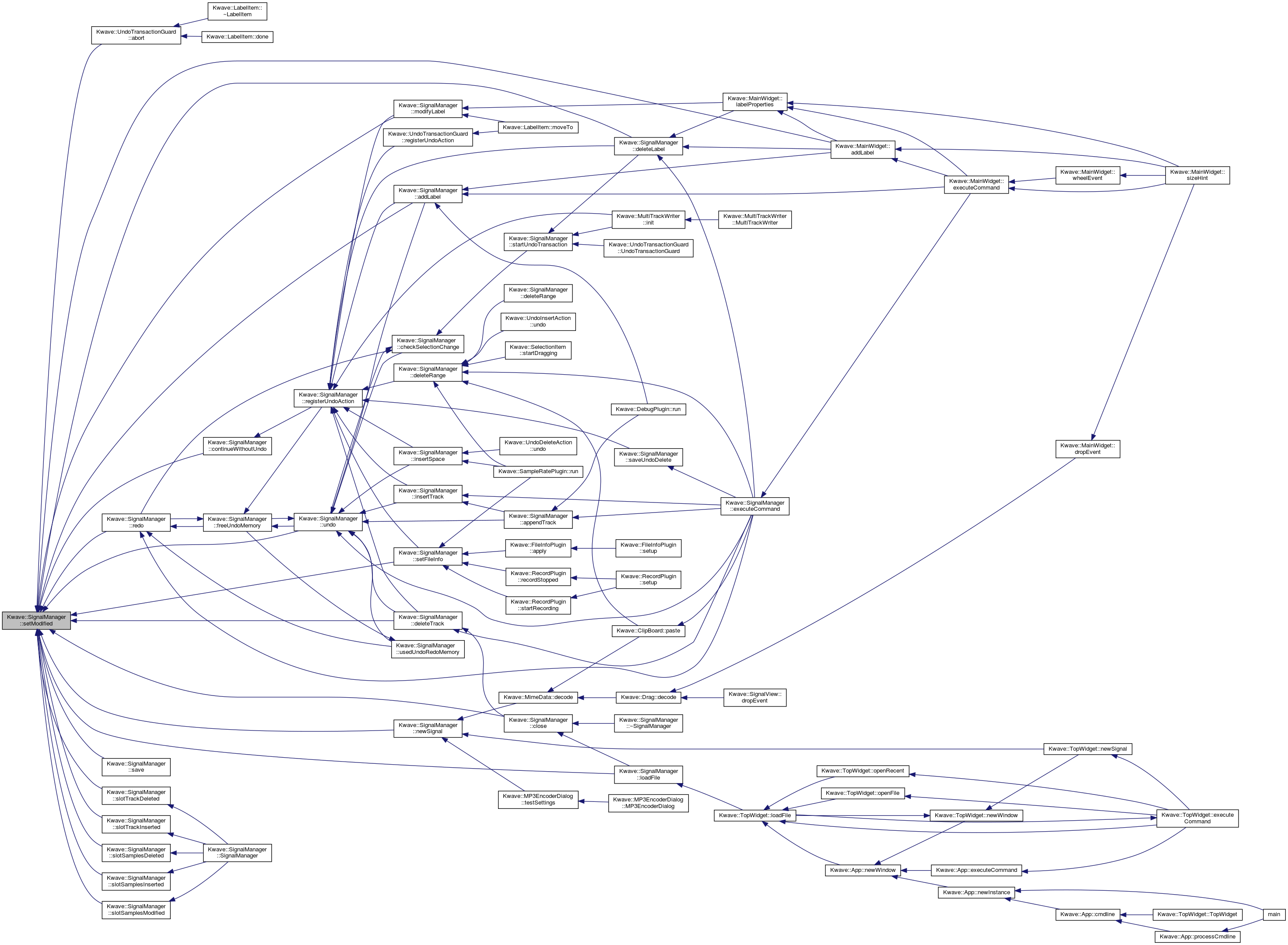
◆ setParentWidget()
|
inline |
assigns a new parent widget, to be used for messages
- Parameters
-
new_parent pointer to a QWidget
Definition at line 416 of file SignalManager.h.
◆ sigMetaDataChanged
|
signal |
Emitted whenever meta data has changed, after some operation
- Parameters
-
meta the current meta data
Referenced by addLabel(), close(), deleteLabel(), deleteRange(), executeCommand(), loadFile(), mergeMetaData(), modifyLabel(), newSignal(), redo(), save(), setFileInfo(), slotSamplesDeleted(), slotSamplesInserted(), slotTrackDeleted(), slotTrackInserted(), and undo().
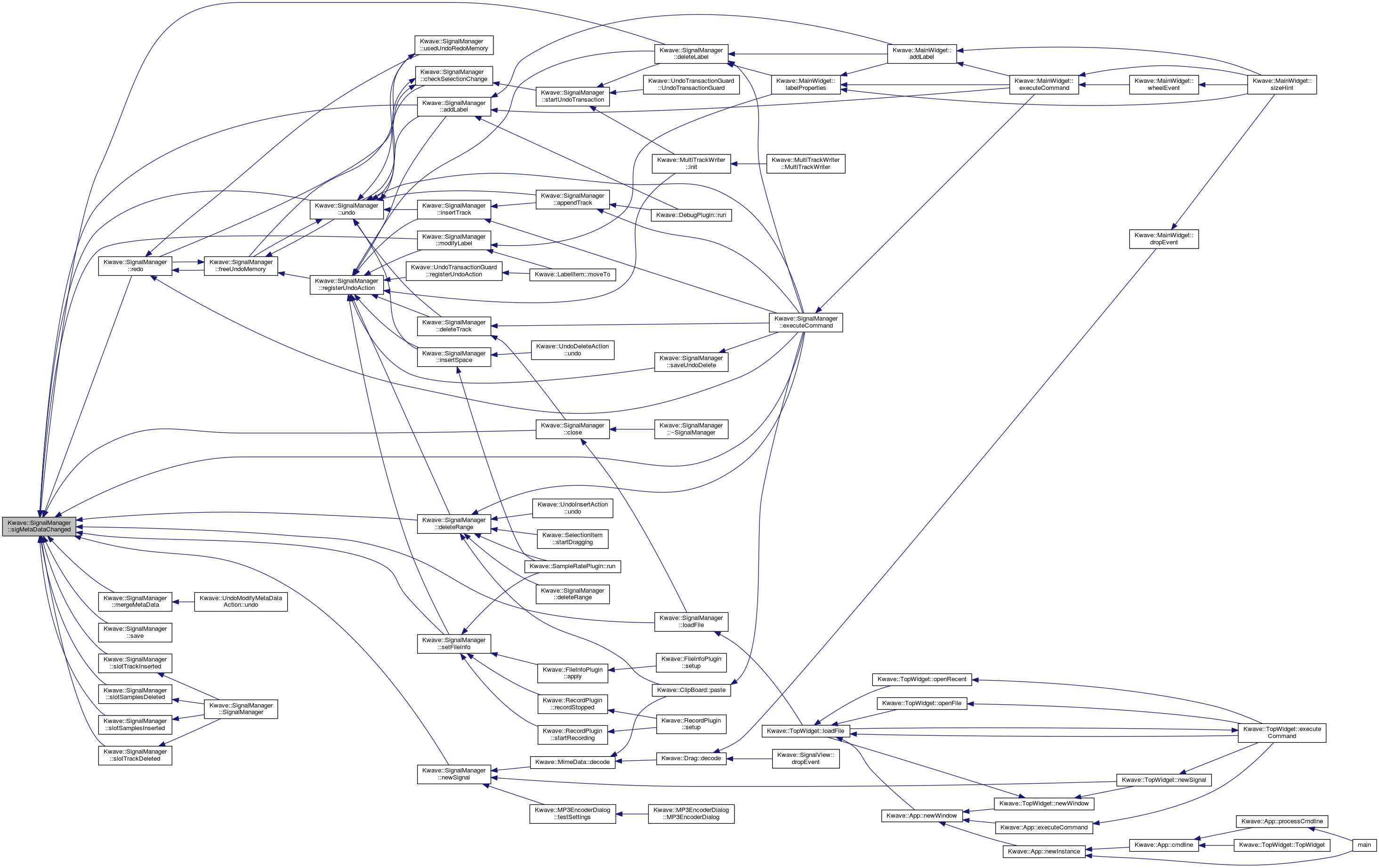
◆ sigModified
|
signal |
Emitted if the signal changes from non-modified to modified state or vice-versa.
Referenced by setModified().
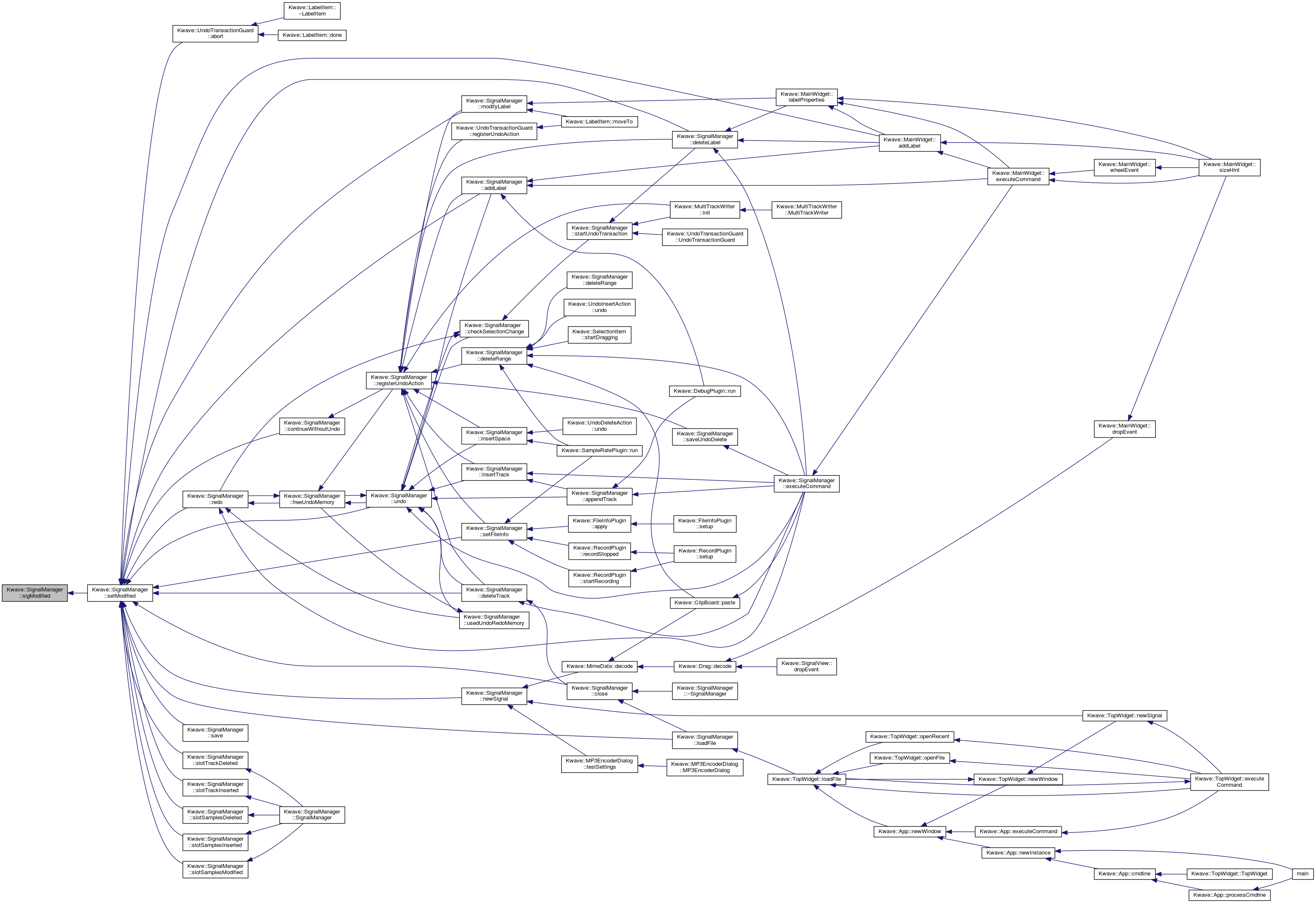
◆ signalName()
| QString Kwave::SignalManager::signalName | ( | ) |
Returns a reference to the current name of the signal. If no signal is loaded the string is zero-length.
Definition at line 572 of file SignalManager.cpp.
References _, Kwave::INF_FILENAME, isClosed(), m_meta_data, and NEW_FILENAME.
Referenced by Kwave::Plugin::signalName().


◆ sigSamplesDeleted
|
signal |
Emitted if samples have been removed from a track.
- Parameters
-
track index of the track offset position from which the data was removed length number of samples deleted
Referenced by SignalManager(), and slotSamplesDeleted().

◆ sigSamplesInserted
|
signal |
Emitted if samples have been inserted into a track. This implies a modification of the inserted data, so no extra sigSamplesModified is emitted.
- Parameters
-
track index of the track offset position from which the data was inserted length number of samples inserted
- See also
- sigSamplesModified
Referenced by SignalManager(), and slotSamplesInserted().

◆ sigSamplesModified
|
signal |
Emitted if samples within a track have been modified.
- Parameters
-
track index of the track offset position from which the data was modified length number of samples modified
Referenced by SignalManager(), and slotSamplesModified().

◆ sigSelectionChanged
|
signal |
Signals a change in the range of selected samples.
- Parameters
-
offset index of the first selected sample length number of selected samples
◆ sigTrackDeleted
|
signal |
Signals that a track has been deleted.
- Parameters
-
index position of the deleted track [0...tracks()-1] track reference to the new track
Referenced by SignalManager(), and slotTrackDeleted().

◆ sigTrackInserted
|
signal |
Signals that a track has been inserted.
- Parameters
-
index position of the new track [0...tracks()-1] track reference to the new track
Referenced by SignalManager(), and slotTrackInserted().

◆ sigTrackSelectionChanged
|
signal |
Signals that the selection of one of the tracks has changed
- Parameters
-
enabled state of the track, true=selected
Referenced by SignalManager().

◆ sigUndoRedoInfo
|
signal |
Emitted if the state or description of undo/redo has changed. If undo or redo is unavailable the description will be zero.
- See also
- emitUndoRedoInfo
Referenced by emitUndoRedoInfo().
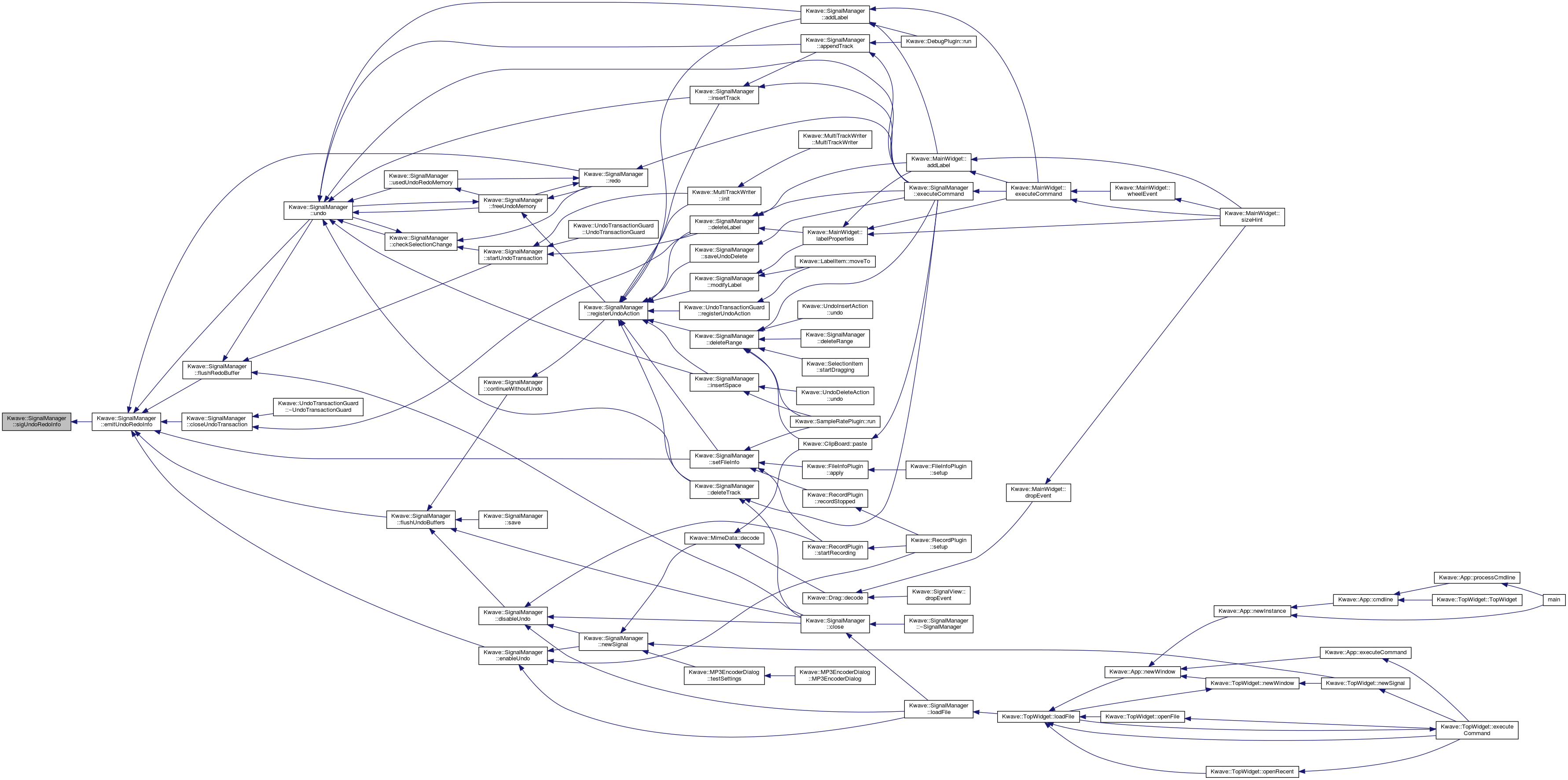
◆ slotSamplesDeleted
|
privateslot |
Connected to the signal's sigSamplesDeleted.
- Parameters
-
track index of the source track [0...tracks-1] offset position from which the data was removed length number of samples deleted
- See also
- Signal::sigSamplesDeleted
Definition at line 1033 of file SignalManager.cpp.
References Kwave::Signal::length(), m_last_length, m_meta_data, m_signal, Kwave::MetaDataList::replace(), selectedTracks(), Kwave::FileInfo::setLength(), setModified(), Kwave::MetaDataList::shiftLeft(), sigMetaDataChanged(), sigSamplesDeleted(), and tracks().
Referenced by SignalManager().
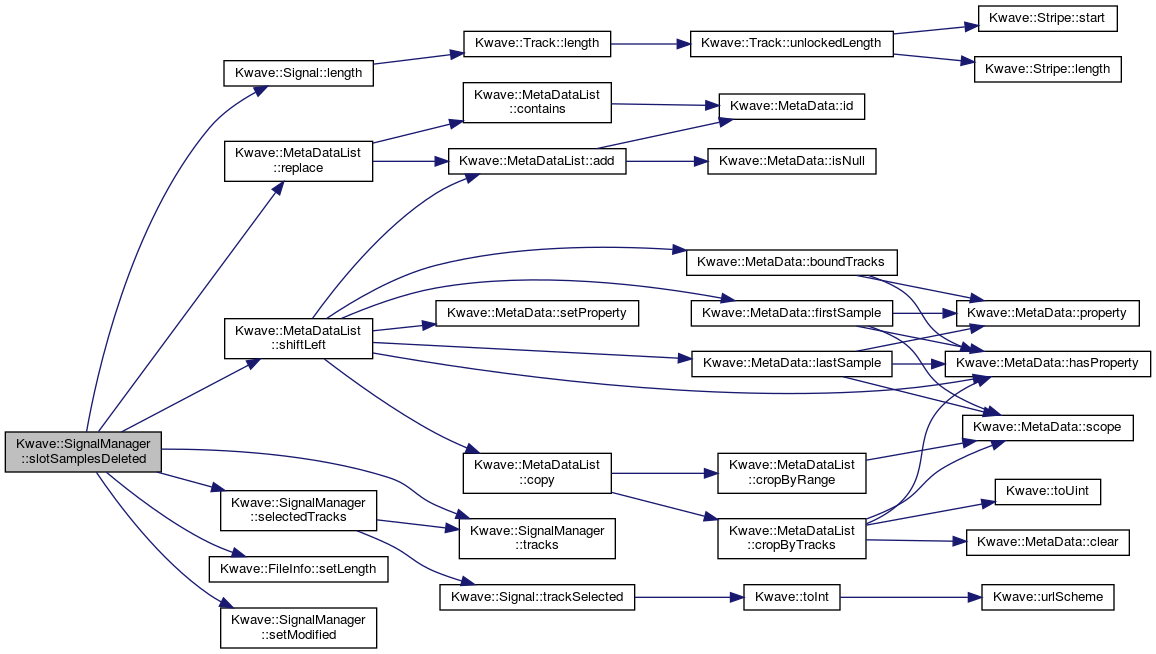

◆ slotSamplesInserted
|
privateslot |
Connected to the signal's sigSamplesInserted.
- Parameters
-
track index of the source track [0...tracks-1] offset position from which the data was inserted length number of samples inserted
- See also
- Signal::sigSamplesInserted
Definition at line 1010 of file SignalManager.cpp.
References Kwave::Signal::length(), m_last_length, m_meta_data, m_signal, Kwave::MetaDataList::replace(), selectedTracks(), Kwave::FileInfo::setLength(), setModified(), Kwave::MetaDataList::shiftRight(), sigMetaDataChanged(), sigSamplesInserted(), and tracks().
Referenced by SignalManager().
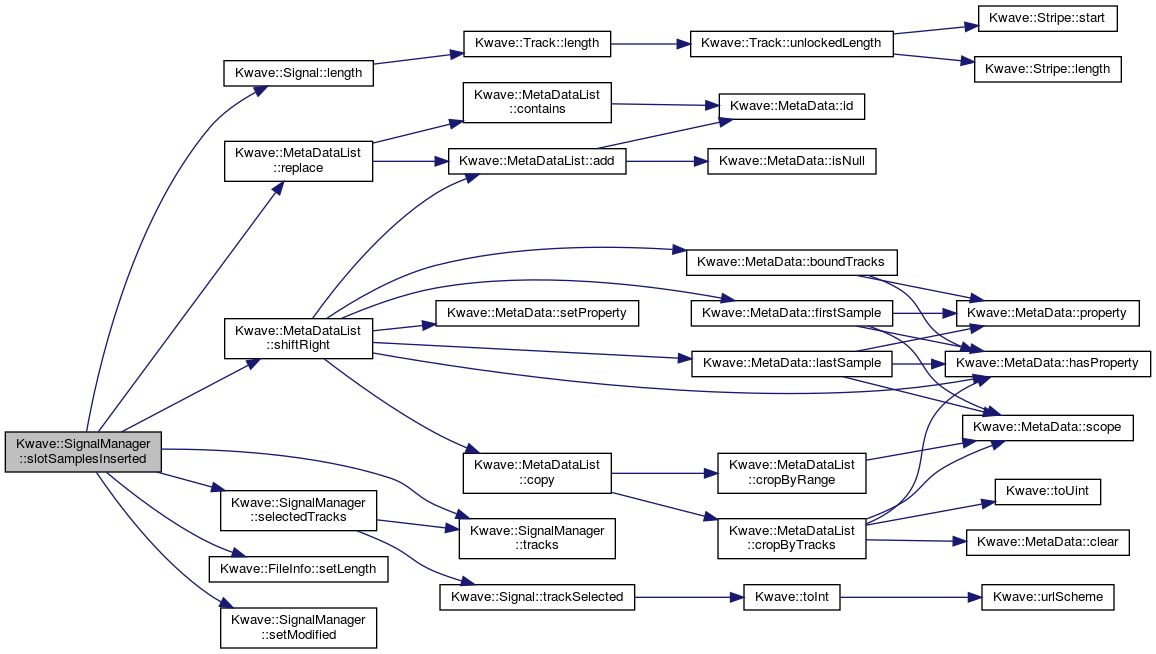

◆ slotSamplesModified
|
privateslot |
Connected to the signal's sigSamplesModified
- Parameters
-
track index of the source track [0...tracks-1] offset position from which the data was modified length number of samples modified
- See also
- Signal::sigSamplesModified
Definition at line 1056 of file SignalManager.cpp.
References setModified(), and sigSamplesModified().
Referenced by SignalManager().


◆ slotTrackDeleted
|
privateslot |
Connected to the signal's sigTrackInserted.
- Parameters
-
index numeric index of the inserted track track reference to the track that has been deleted
- See also
- Signal::sigTrackDeleted
Definition at line 996 of file SignalManager.cpp.
References m_meta_data, Kwave::MetaDataList::replace(), setModified(), Kwave::FileInfo::setTracks(), sigMetaDataChanged(), sigTrackDeleted(), and tracks().
Referenced by SignalManager().


◆ slotTrackInserted
|
privateslot |
Connected to the signal's sigTrackInserted.
- Parameters
-
index numeric index of the inserted track track reference to the track that has been inserted
- See also
- Signal::sigTrackInserted
Definition at line 982 of file SignalManager.cpp.
References m_meta_data, Kwave::MetaDataList::replace(), setModified(), Kwave::FileInfo::setTracks(), sigMetaDataChanged(), sigTrackInserted(), and tracks().
Referenced by SignalManager().


◆ startUndoTransaction()
|
protected |
Starts an undo transaction or enters a currently running transaction recursively.
- Parameters
-
name the name of the transaction. Will be ignored if there already is an active transaction (optional)
Definition at line 1219 of file SignalManager.cpp.
References checkSelectionChange(), flushRedoBuffer(), m_undo_enabled, m_undo_manager, m_undo_transaction, m_undo_transaction_level, m_undo_transaction_lock, selection(), Kwave::UndoManager::startUndoTransaction(), and Kwave::UndoAction::store().
Referenced by deleteLabel(), Kwave::MultiTrackWriter::init(), and Kwave::UndoTransactionGuard::UndoTransactionGuard().
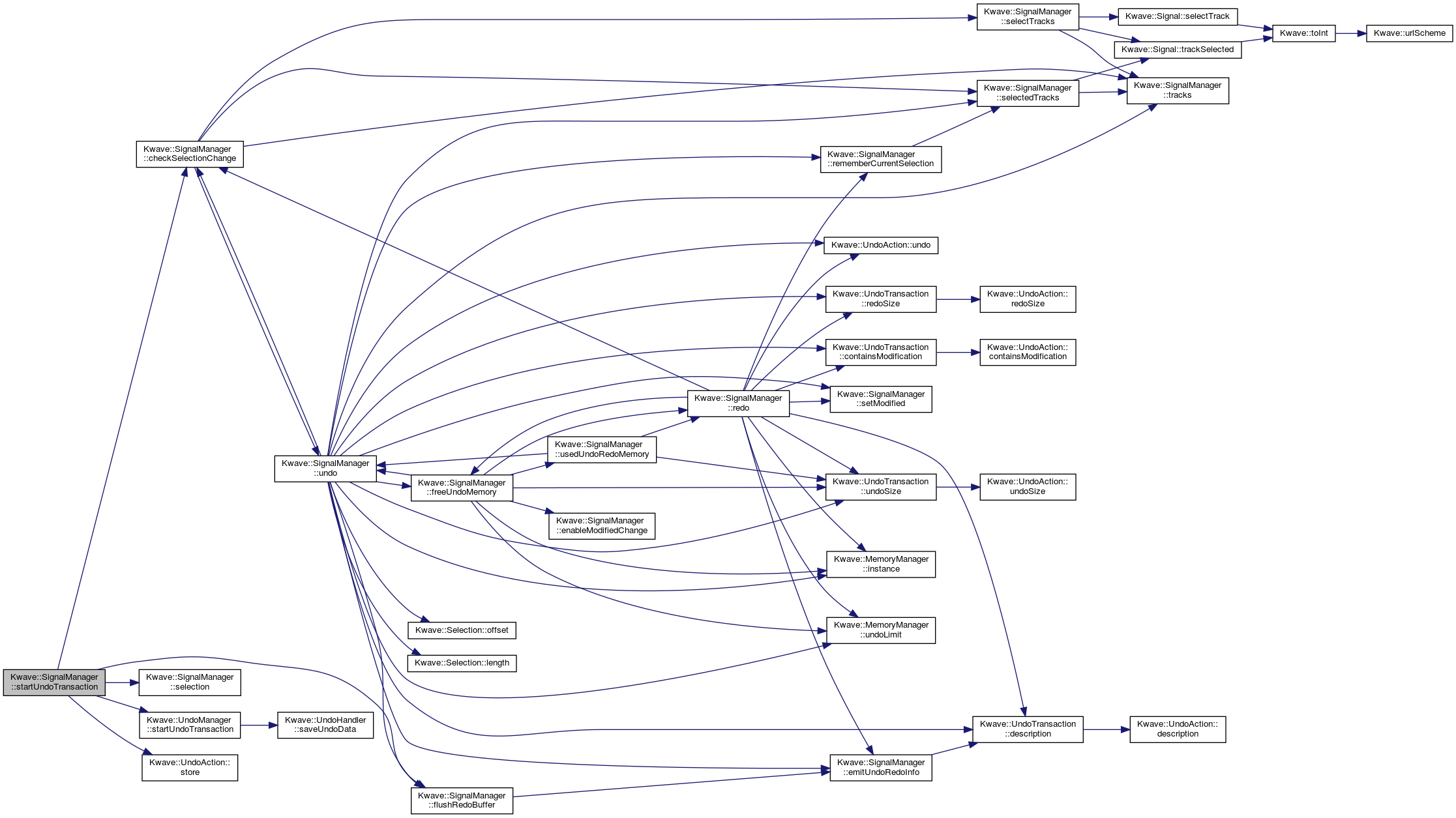

◆ stripes()
| QList< Kwave::Stripe::List > Kwave::SignalManager::stripes | ( | const QList< unsigned int > & | track_list, |
| sample_index_t | left = 0, |
||
| sample_index_t | right = SAMPLE_INDEX_MAX |
||
| ) |
Get a list of stripes that matches a given range of samples
- Parameters
-
track_list list with indices of tracks for selecting left offset of the first sample right offset of the last sample
- Returns
- a list with lists of stripes that cover the given range between left and right
Definition at line 1173 of file SignalManager.cpp.
References m_signal, and Kwave::Signal::stripes().
Referenced by Kwave::DebugPlugin::run(), Kwave::UndoModifyAction::store(), Kwave::UndoDeleteTrack::store(), Kwave::UndoDeleteAction::store(), and Kwave::UndoModifyAction::undo().

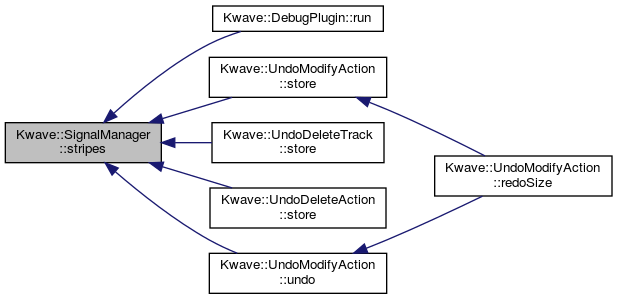
◆ tracks()
|
inline |
Returns the current number of tracks
Definition at line 136 of file SignalManager.h.
Referenced by appendTrack(), checkSelectionChange(), close(), Kwave::MimeData::decode(), deleteTrack(), executeCommand(), insertTrack(), loadFile(), Kwave::SampleRatePlugin::run(), Kwave::DebugPlugin::run(), save(), selectedTracks(), Kwave::TopWidget::selectionChanged(), selectTracks(), Kwave::ZoomToolBar::setZoomInfo(), slotSamplesDeleted(), slotSamplesInserted(), slotTrackDeleted(), Kwave::MainWidget::slotTrackInserted(), slotTrackInserted(), Kwave::RecordPlugin::startRecording(), undo(), Kwave::TopWidget::updateMenu(), Kwave::ZoomToolBar::updateToolbar(), and Kwave::TopWidget::updateToolbar().
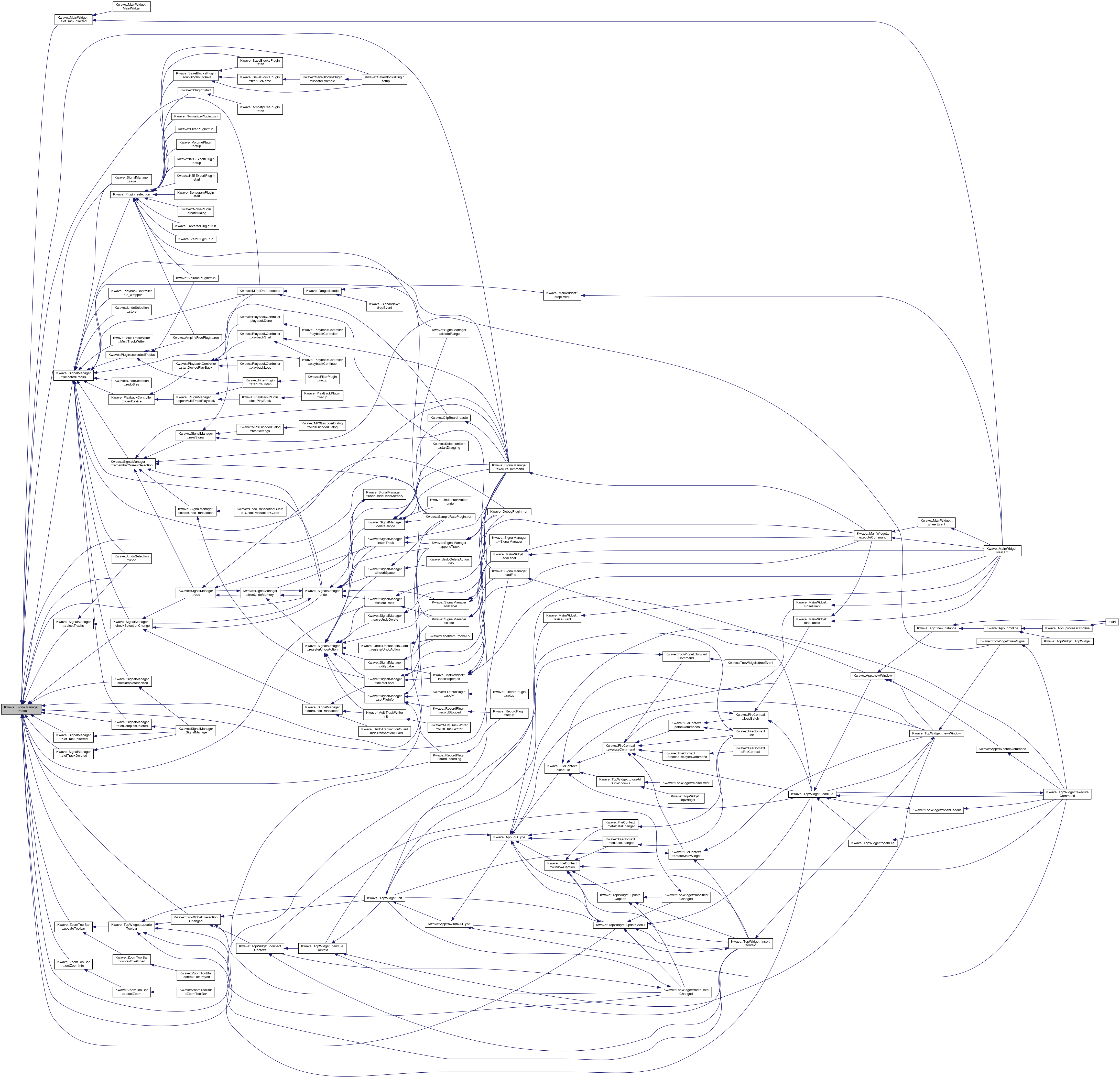
◆ trackSelected()
|
inline |
Returns true if a given track is selected. If the track does not exist or is not selected the return value is false.
Definition at line 151 of file SignalManager.h.
Referenced by executeCommand().

◆ undo
|
slot |
Un-does the last action if possible.
Definition at line 1560 of file SignalManager.cpp.
References checkSelectionChange(), Kwave::UndoTransaction::containsModification(), Kwave::UndoTransaction::description(), emitUndoRedoInfo(), flushRedoBuffer(), freeUndoMemory(), Kwave::MemoryManager::instance(), Kwave::Selection::length(), m_last_selection, m_last_track_selection, m_meta_data, m_modified, m_redo_buffer, m_selection, m_undo_buffer, m_undo_enabled, m_undo_transaction_lock, name, Kwave::Selection::offset(), Kwave::UndoTransaction::redoSize(), rememberCurrentSelection(), selectedTracks(), setModified(), sigMetaDataChanged(), tracks(), Kwave::UndoAction::undo(), Kwave::MemoryManager::undoLimit(), and Kwave::UndoTransaction::undoSize().
Referenced by addLabel(), appendTrack(), checkSelectionChange(), deleteTrack(), executeCommand(), freeUndoMemory(), insertSpace(), insertTrack(), and usedUndoRedoMemory().
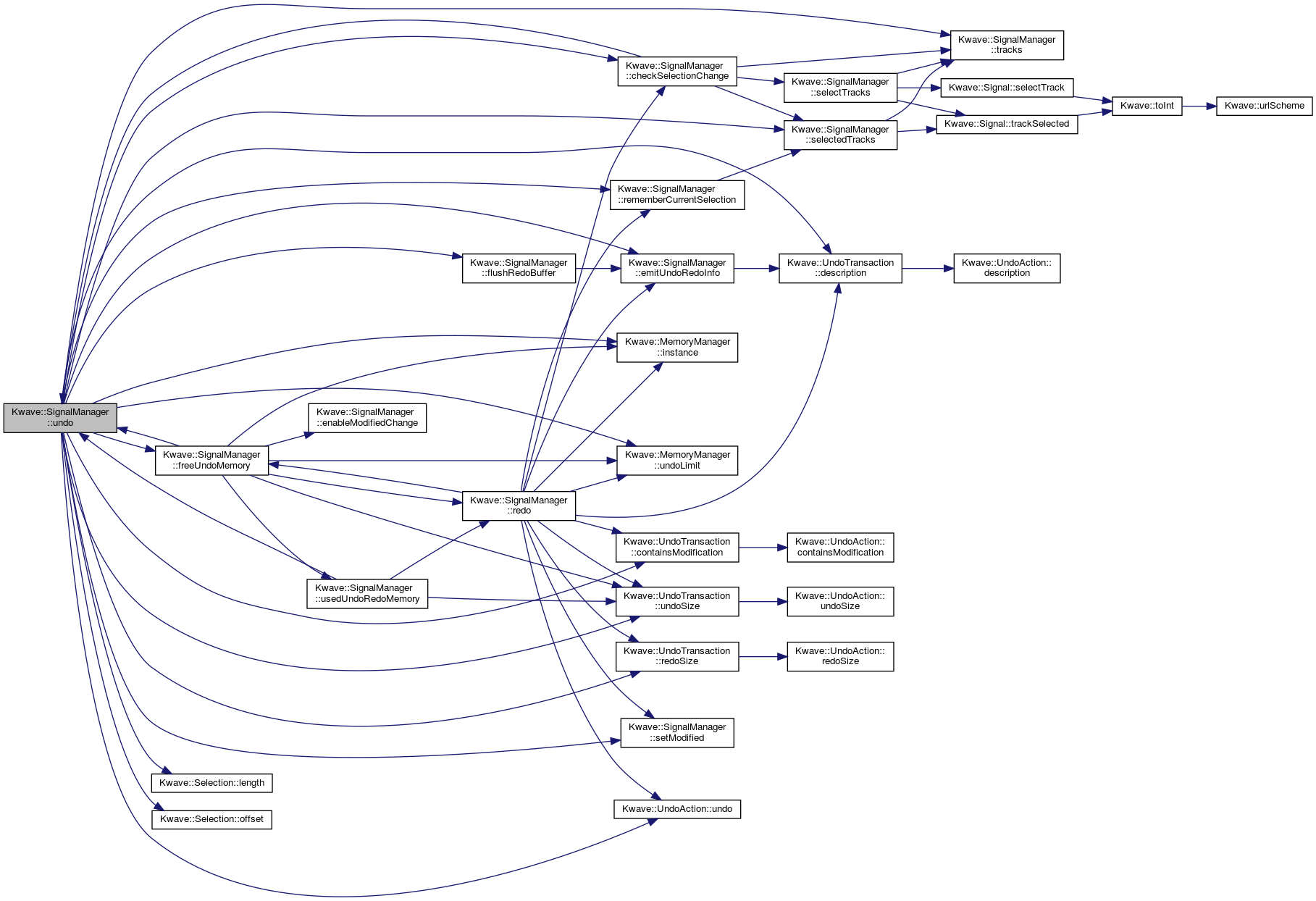
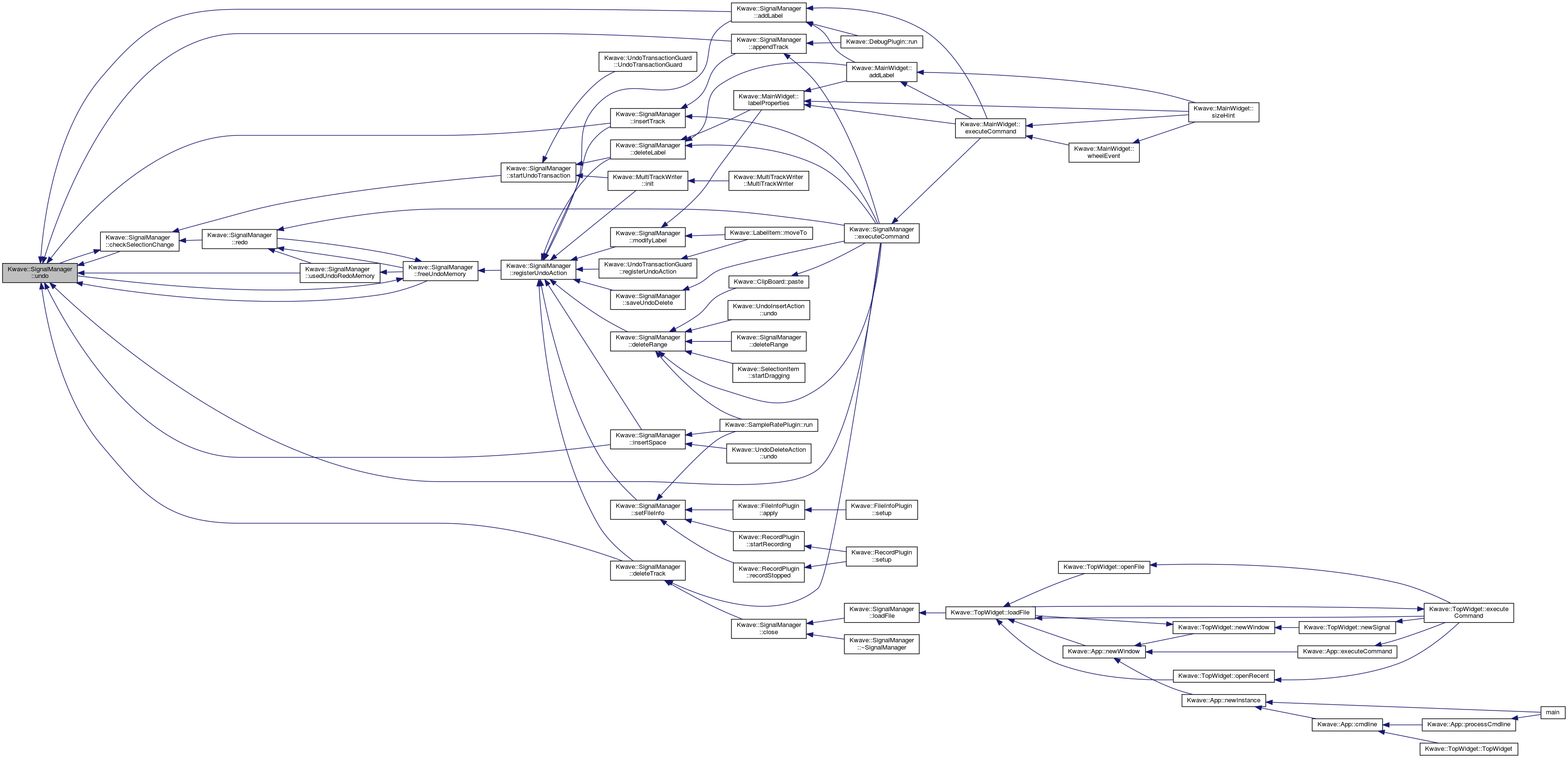
◆ undoEnabled()
|
inline |
Returns true if undo/redo is currently enabled
Definition at line 309 of file SignalManager.h.
Referenced by Kwave::MultiTrackWriter::init().

◆ undoManager()
|
inline |
Returns a reference to the undo manager
Definition at line 306 of file SignalManager.h.
Referenced by Kwave::SelectionTracker::SelectionTracker().

◆ usedUndoRedoMemory()
|
private |
Returns the amount of memory currently used for undo + redo.
Definition at line 1489 of file SignalManager.cpp.
References m_redo_buffer, m_undo_buffer, redo(), undo(), and Kwave::UndoTransaction::undoSize().
Referenced by freeUndoMemory().
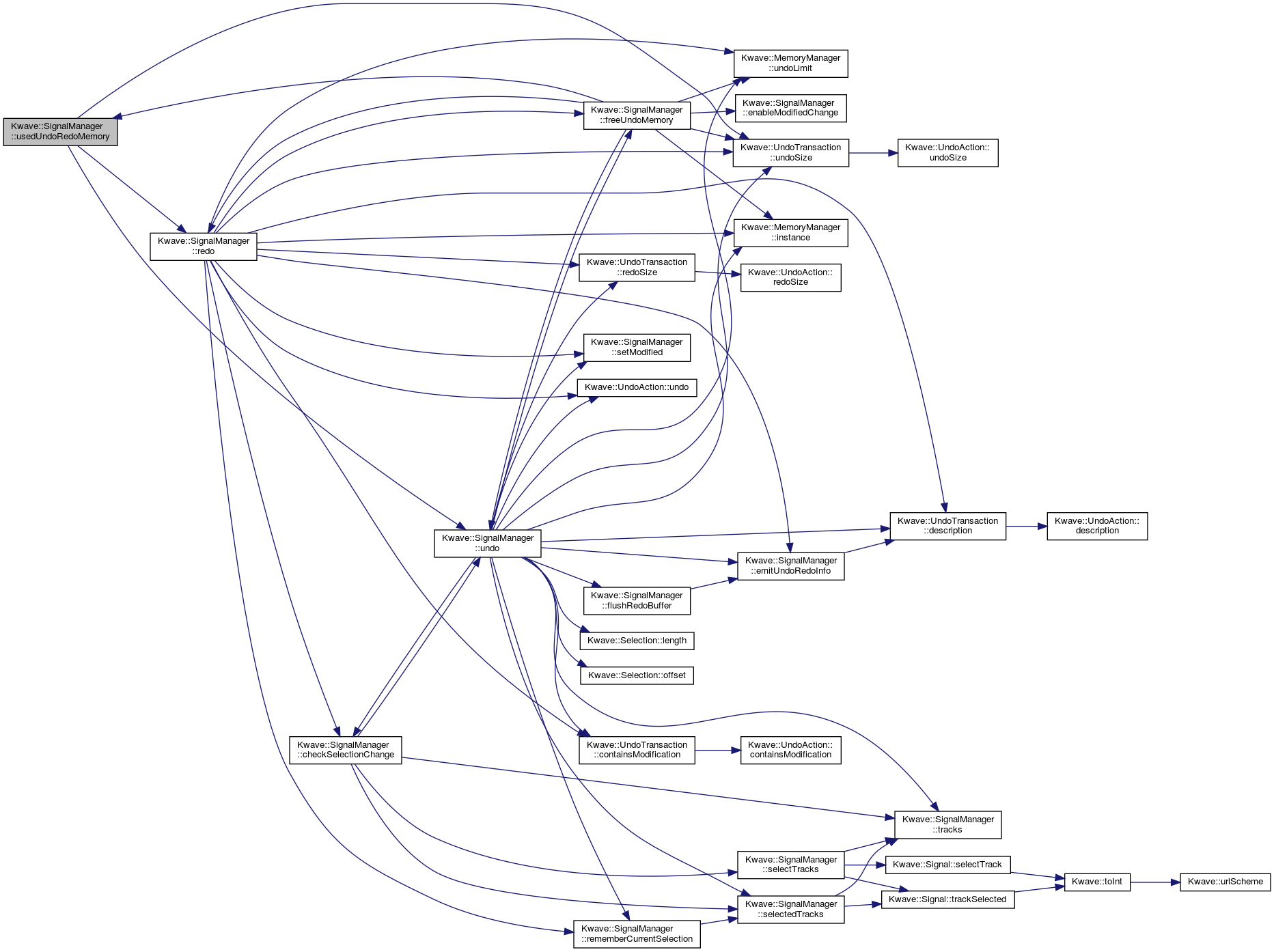
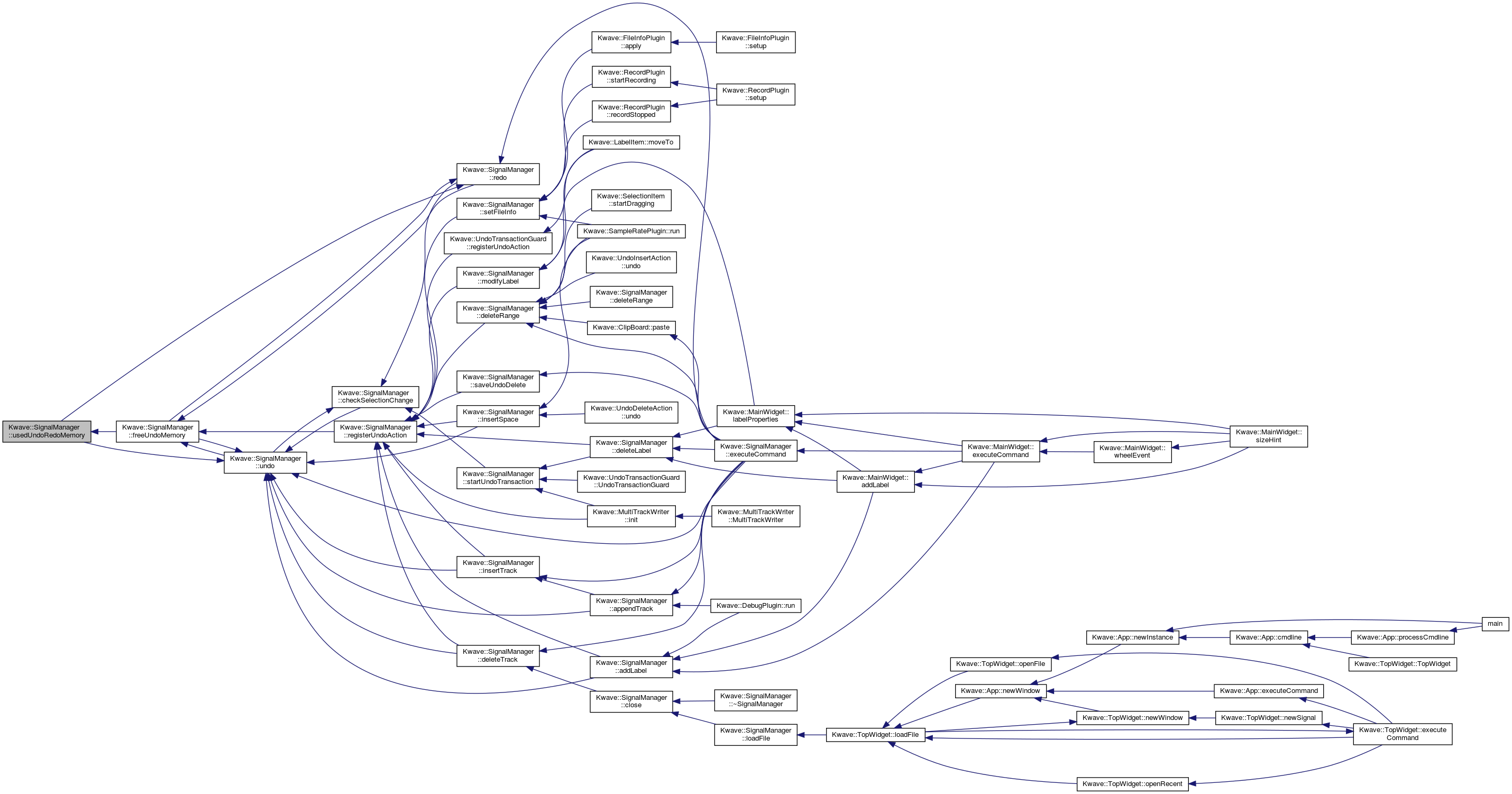
◆ uuidOfTrack()
|
inline |
Returns the uuid of a track
- Parameters
-
track index of the track [0...tracks-1]
- Returns
- the QUuid of the track or a "null" uuid if the track does not exist
Definition at line 408 of file SignalManager.h.
Referenced by Kwave::OverViewCache::getMinMax().
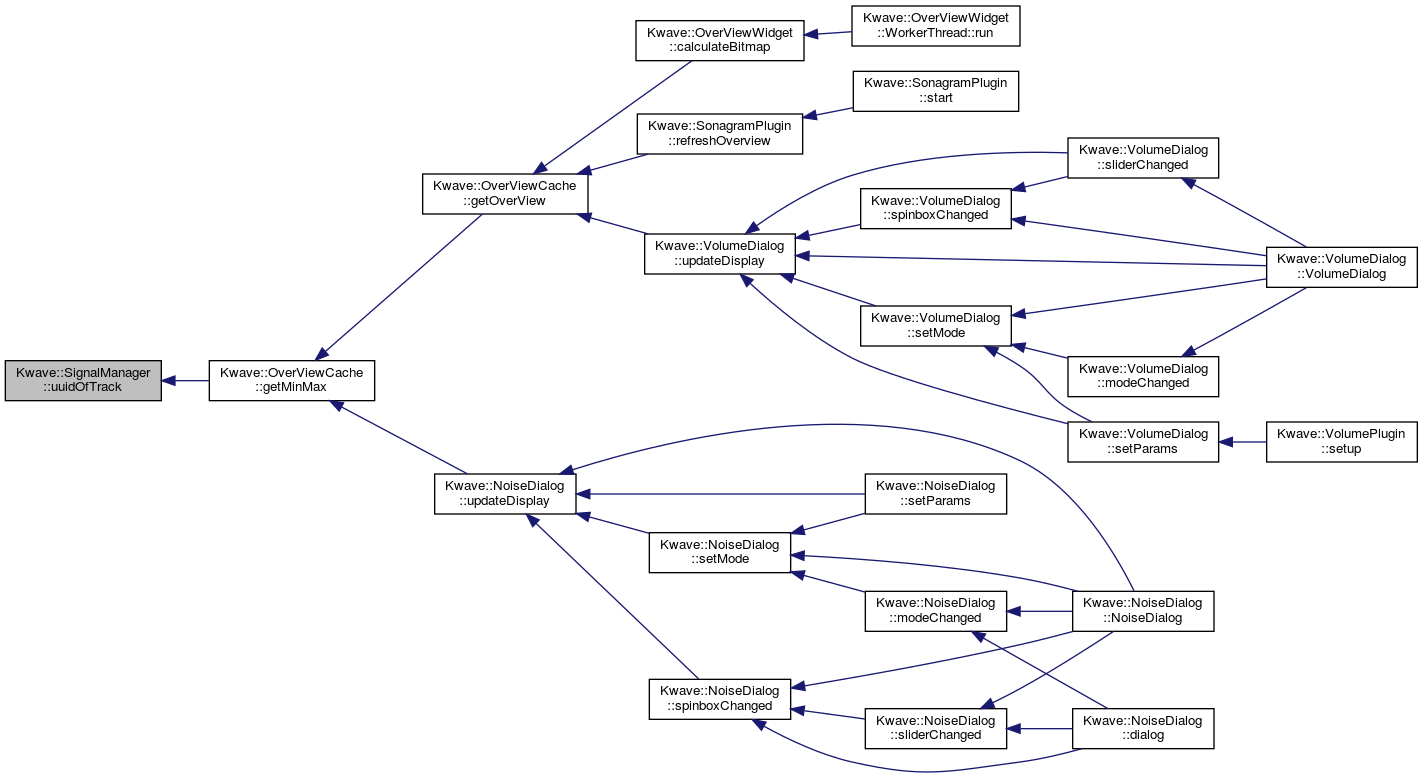
Friends And Related Function Documentation
◆ Kwave::UndoInsertAction
|
friend |
Definition at line 581 of file SignalManager.h.
◆ MainWidget
|
friend |
Definition at line 602 of file SignalManager.h.
◆ MultiTrackWriter
|
friend |
Definition at line 599 of file SignalManager.h.
◆ PlaybackController
|
friend |
Definition at line 600 of file SignalManager.h.
◆ PluginManager
|
friend |
Definition at line 601 of file SignalManager.h.
◆ UndoTransactionGuard
|
friend |
Definition at line 603 of file SignalManager.h.
Member Data Documentation
◆ m_closed
|
private |
true if the signal is closed
Definition at line 708 of file SignalManager.h.
Referenced by close(), loadFile(), and newSignal().
◆ m_empty
|
private |
true if the signal is completely empty
Definition at line 711 of file SignalManager.h.
Referenced by close(), loadFile(), and newSignal().
◆ m_last_length
|
private |
Last known length of the signal. This will be used if a track is added to an empty signal and prevents from the creation of a completely empty new signal.
Definition at line 741 of file SignalManager.h.
Referenced by close(), insertTrack(), loadFile(), newSignal(), slotSamplesDeleted(), and slotSamplesInserted().
◆ m_last_selection
|
private |
the last selection (stored in undo)
Definition at line 731 of file SignalManager.h.
Referenced by checkSelectionChange(), rememberCurrentSelection(), and undo().
◆ m_last_track_selection
|
private |
the last track selection (stored in undo)
Definition at line 734 of file SignalManager.h.
Referenced by checkSelectionChange(), rememberCurrentSelection(), and undo().
◆ m_meta_data
|
private |
meta data of the signal
- See also
- class MetaData
Definition at line 771 of file SignalManager.h.
Referenced by addLabel(), close(), deleteLabel(), deleteRange(), deleteTrack(), executeCommand(), findLabel(), insertTrack(), labelIndex(), loadFile(), mergeMetaData(), modifyLabel(), newSignal(), redo(), save(), setFileInfo(), signalName(), slotSamplesDeleted(), slotSamplesInserted(), slotTrackDeleted(), slotTrackInserted(), and undo().
◆ m_modified
|
private |
true if the signal has been modified
Definition at line 714 of file SignalManager.h.
Referenced by flushUndoBuffers(), freeUndoMemory(), setModified(), and undo().
◆ m_modified_enabled
|
private |
If set to true, prevents the modified flag from changes. Useful to prevent setting the modified flag during file load and creation, or if the change to the non-modified state through undo operations is no longer possible.
Definition at line 722 of file SignalManager.h.
Referenced by enableModifiedChange(), and setModified().
◆ m_parent_widget
|
private |
Parent widget, used for showing messages
Definition at line 705 of file SignalManager.h.
Referenced by continueWithoutUndo(), deleteRange(), executeCommand(), insertSpace(), loadFile(), save(), and saveUndoDelete().
◆ m_playback_controller
|
private |
the controller for handling of playback
Definition at line 744 of file SignalManager.h.
Referenced by close(), executeCommand(), and playbackController().
◆ m_redo_buffer
|
private |
fifo for storing all redo transactions
Definition at line 753 of file SignalManager.h.
Referenced by emitUndoRedoInfo(), executeCommand(), flushRedoBuffer(), flushUndoBuffers(), freeUndoMemory(), redo(), undo(), and usedUndoRedoMemory().
◆ m_selection
|
private |
the current selection
Definition at line 728 of file SignalManager.h.
Referenced by checkSelectionChange(), close(), executeCommand(), rememberCurrentSelection(), save(), selectRange(), and undo().
◆ m_signal
|
private |
signal with multiple tracks
Definition at line 725 of file SignalManager.h.
Referenced by allTracks(), close(), deleteRange(), deleteTrack(), executeCommand(), insertSpace(), insertTrack(), loadFile(), mergeStripes(), newSignal(), selectedTracks(), selectTrack(), selectTracks(), SignalManager(), slotSamplesDeleted(), slotSamplesInserted(), and stripes().
◆ m_undo_buffer
|
private |
fifo used for storing all undo transactions
Definition at line 750 of file SignalManager.h.
Referenced by closeUndoTransaction(), emitUndoRedoInfo(), executeCommand(), flushUndoBuffers(), freeUndoMemory(), redo(), undo(), and usedUndoRedoMemory().
◆ m_undo_enabled
|
private |
flag for "undo enabled"
Definition at line 747 of file SignalManager.h.
Referenced by addLabel(), deleteRange(), deleteTrack(), disableUndo(), emitUndoRedoInfo(), enableUndo(), executeCommand(), insertSpace(), insertTrack(), modifyLabel(), redo(), registerUndoAction(), saveUndoDelete(), setFileInfo(), startUndoTransaction(), and undo().
◆ m_undo_manager
|
private |
Manager for undo/redo actions
Definition at line 765 of file SignalManager.h.
Referenced by startUndoTransaction().
◆ m_undo_transaction
|
private |
the current undo transaction
Definition at line 756 of file SignalManager.h.
Referenced by abortUndoTransaction(), closeUndoTransaction(), continueWithoutUndo(), registerUndoAction(), and startUndoTransaction().
◆ m_undo_transaction_level
|
private |
level of nested undo transactions
Definition at line 759 of file SignalManager.h.
Referenced by checkSelectionChange(), closeUndoTransaction(), disableUndo(), and startUndoTransaction().
◆ m_undo_transaction_lock
|
private |
mutex for locking undo transactions
Definition at line 762 of file SignalManager.h.
Referenced by closeUndoTransaction(), flushUndoBuffers(), redo(), registerUndoAction(), startUndoTransaction(), and undo().
The documentation for this class was generated from the following files:
- libkwave/SignalManager.h
- libkwave/SignalManager.cpp
